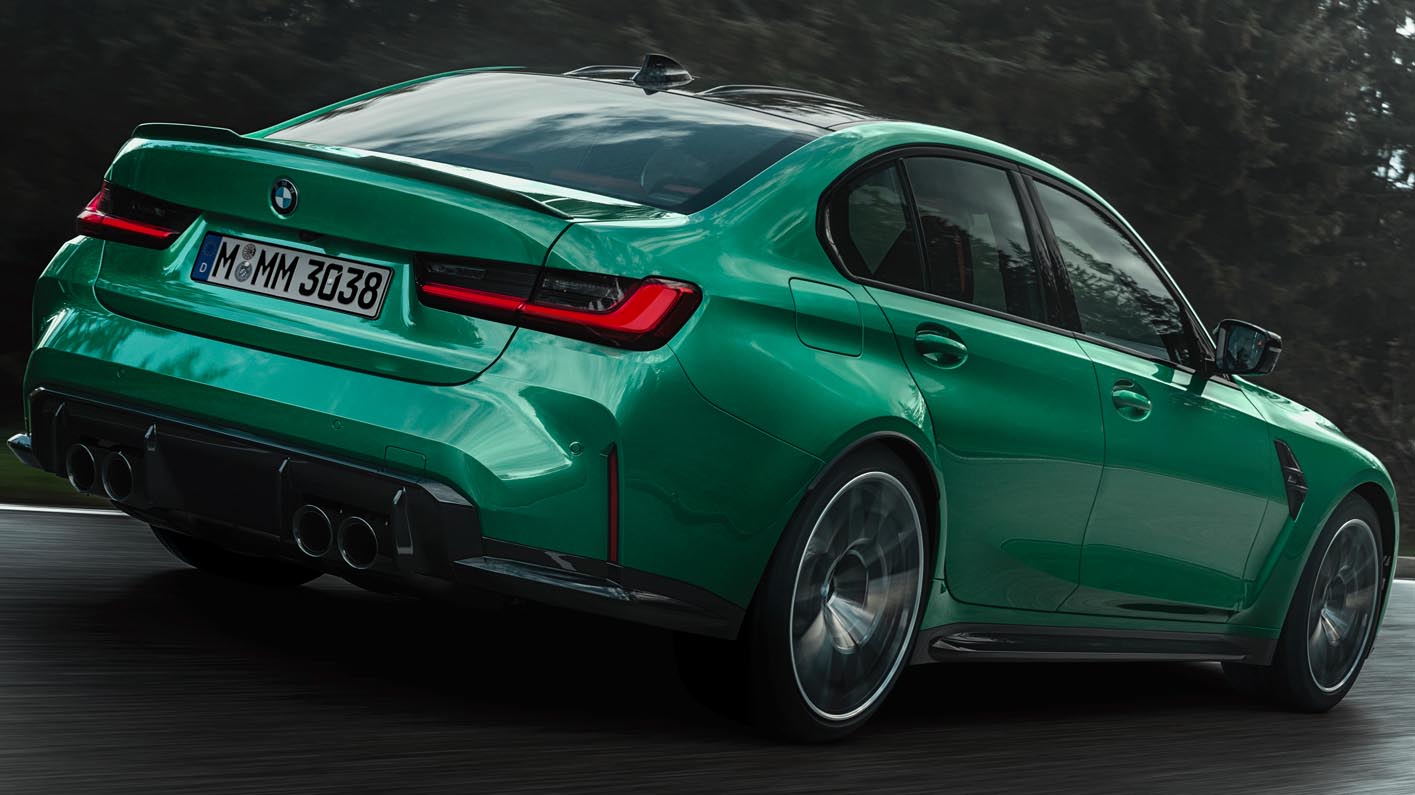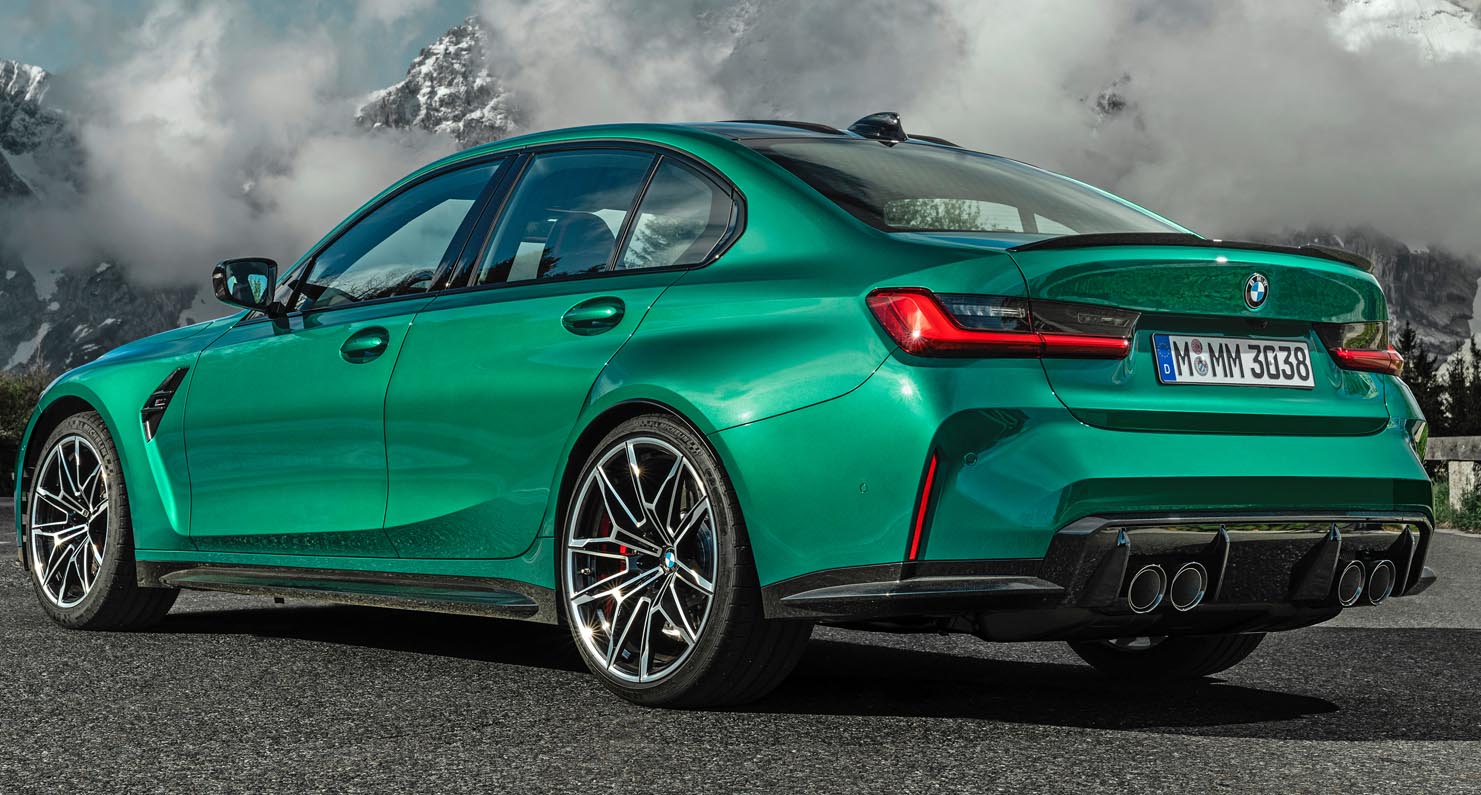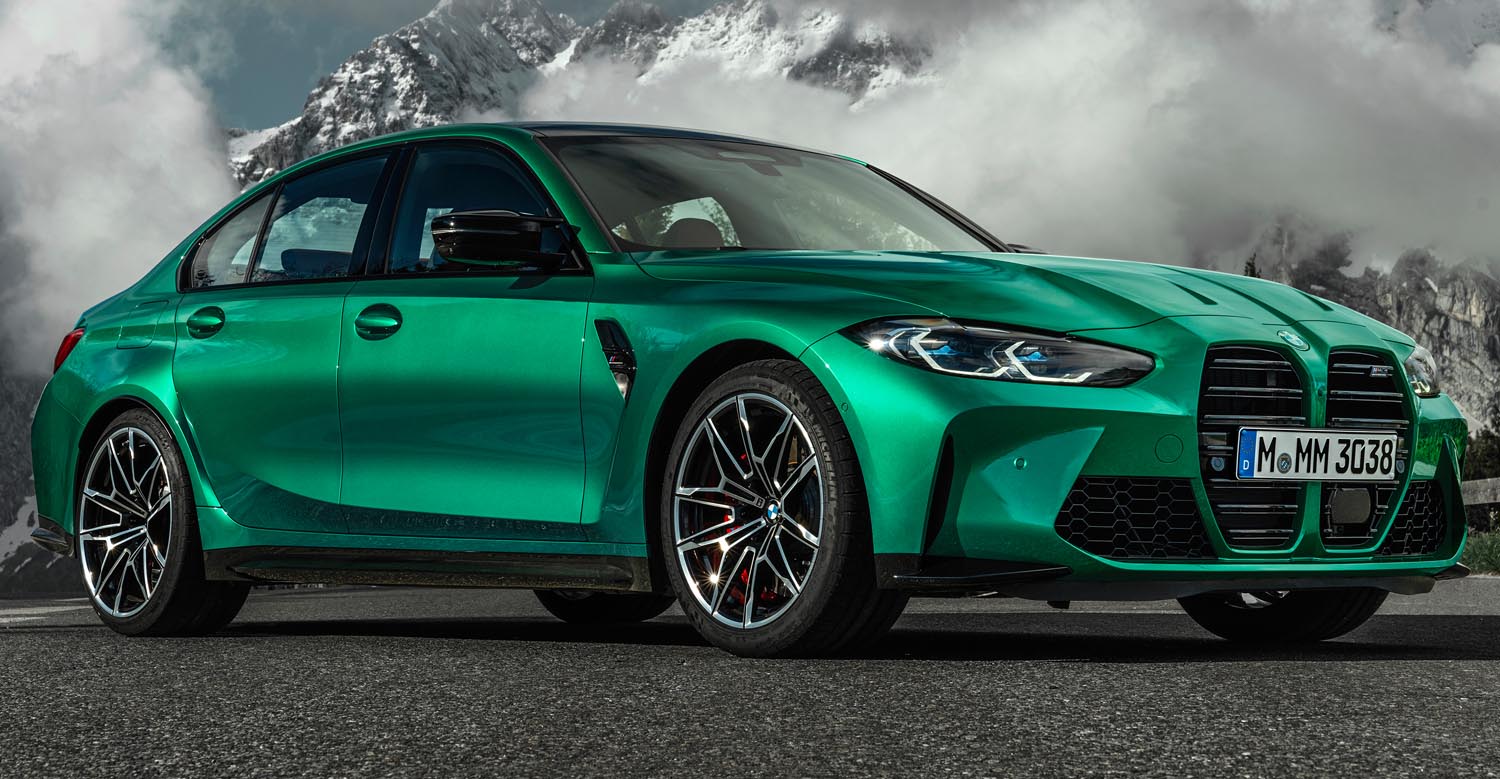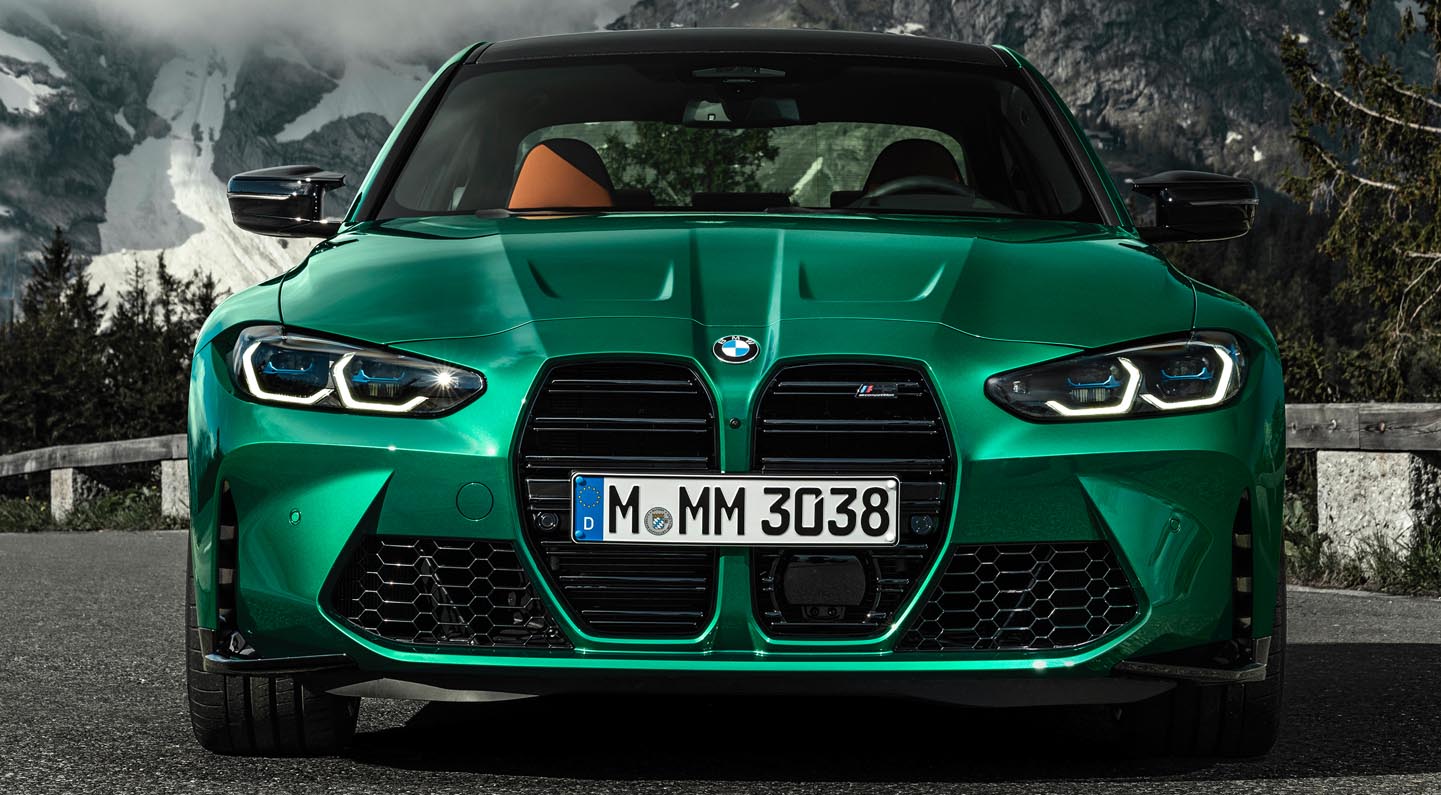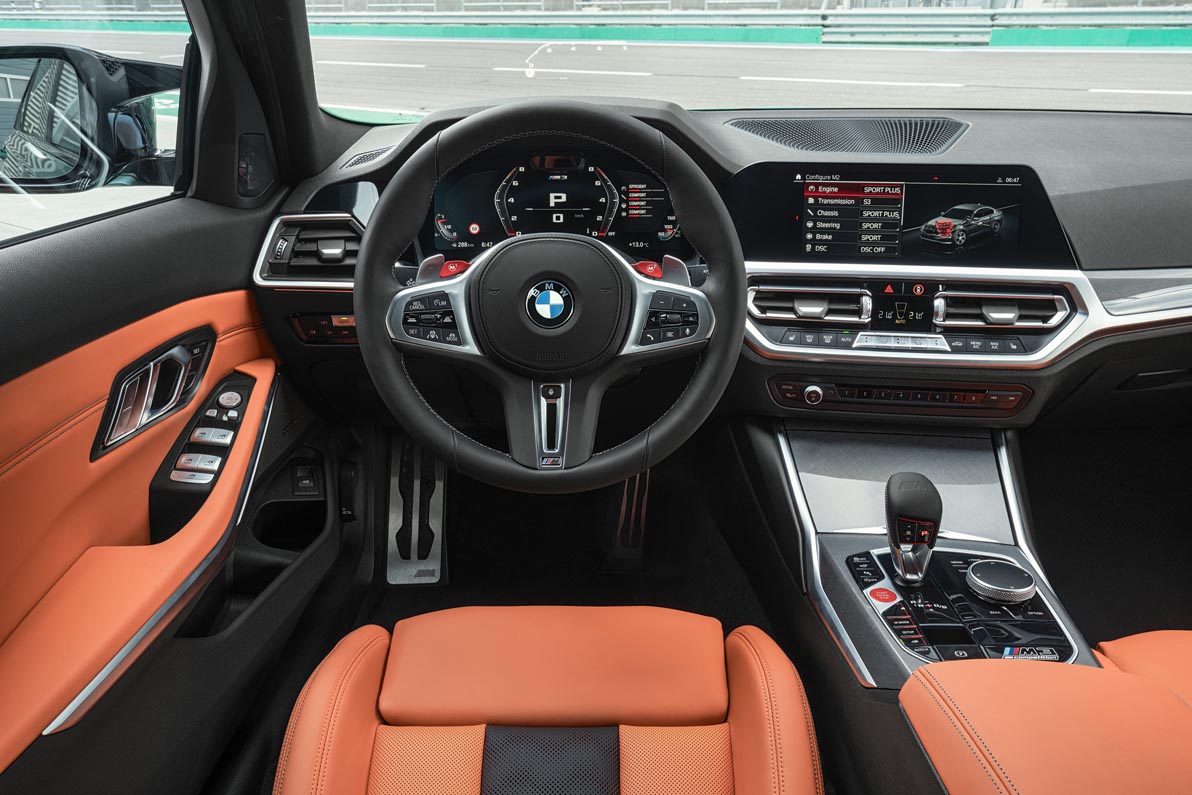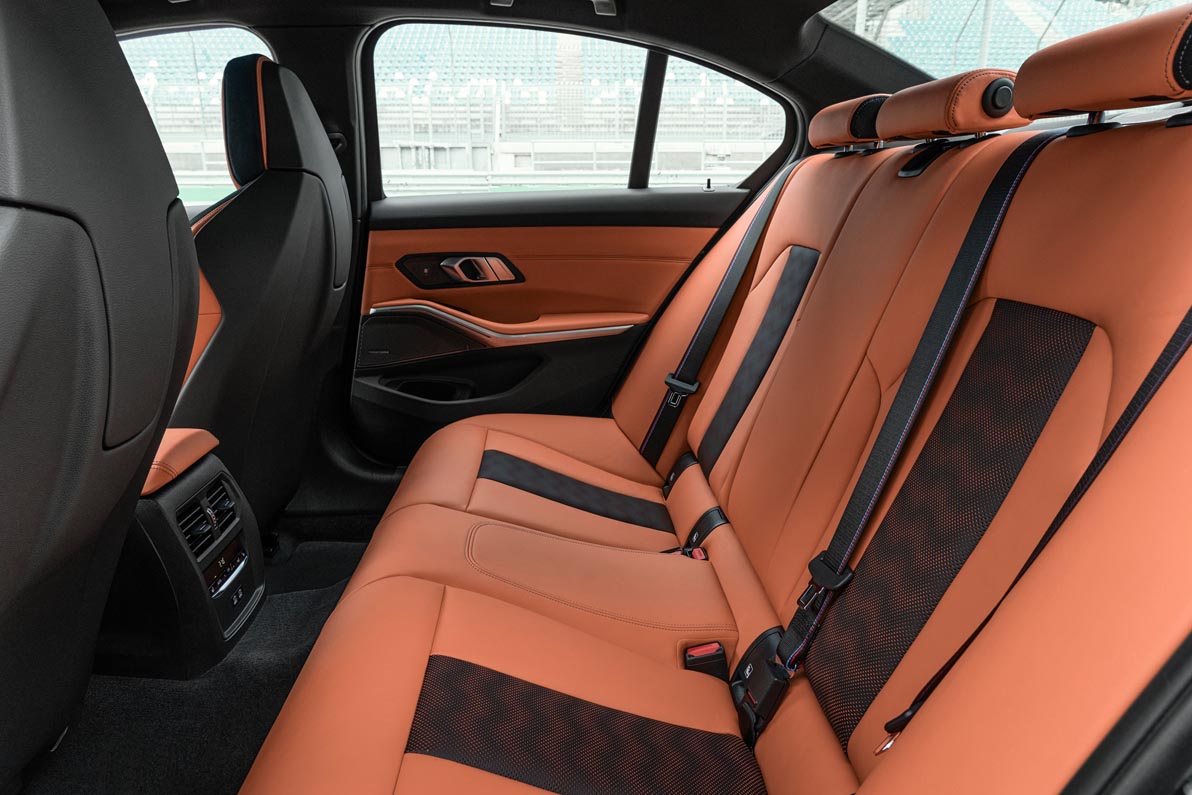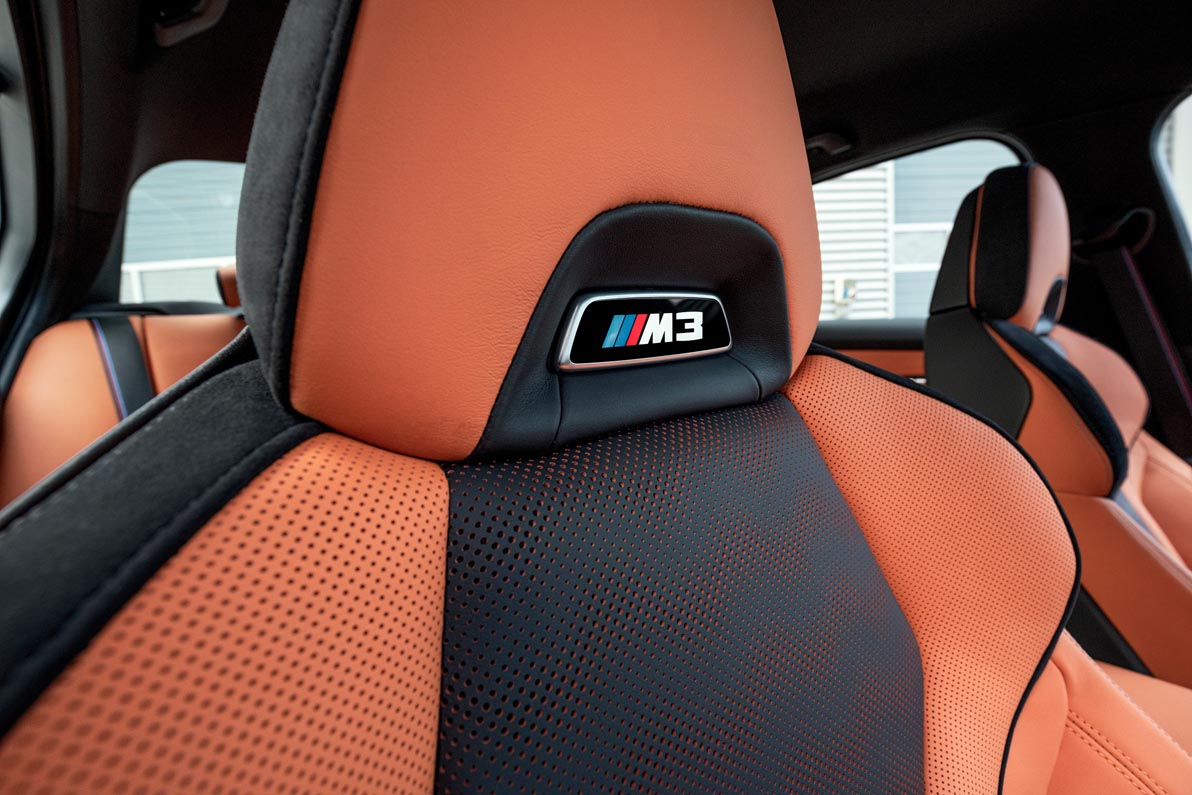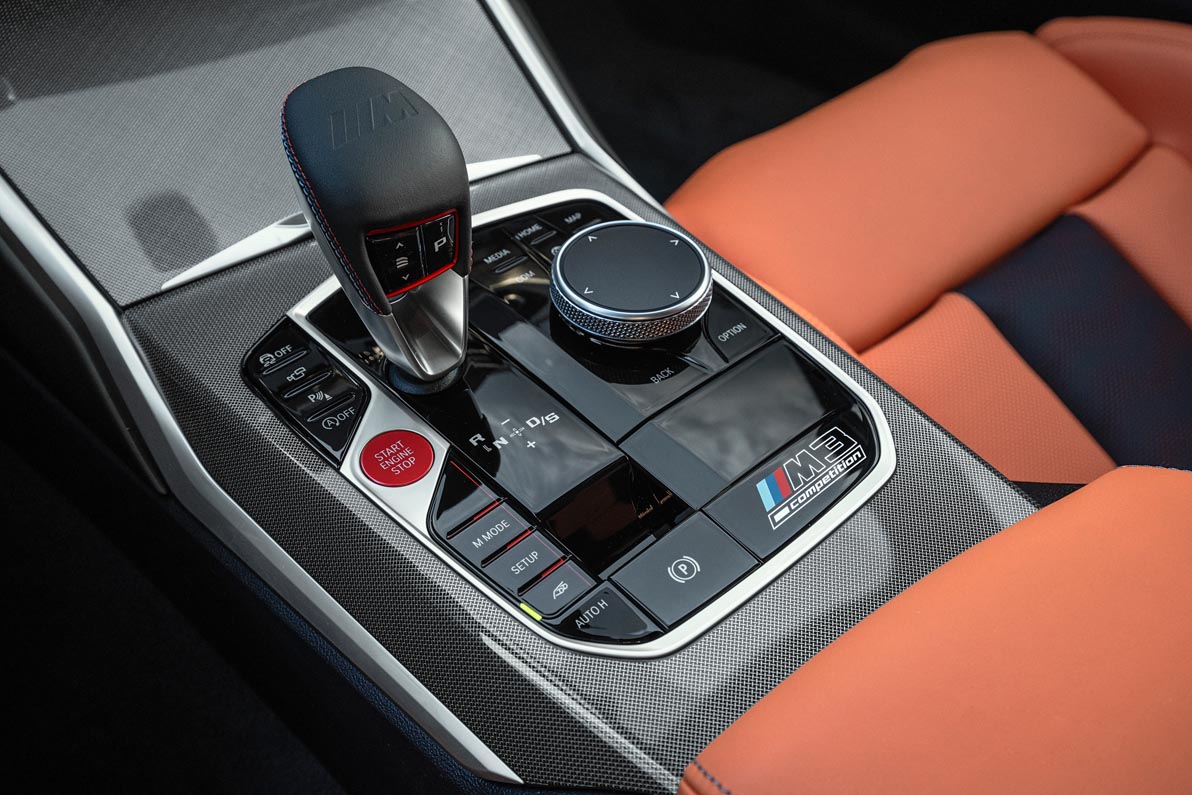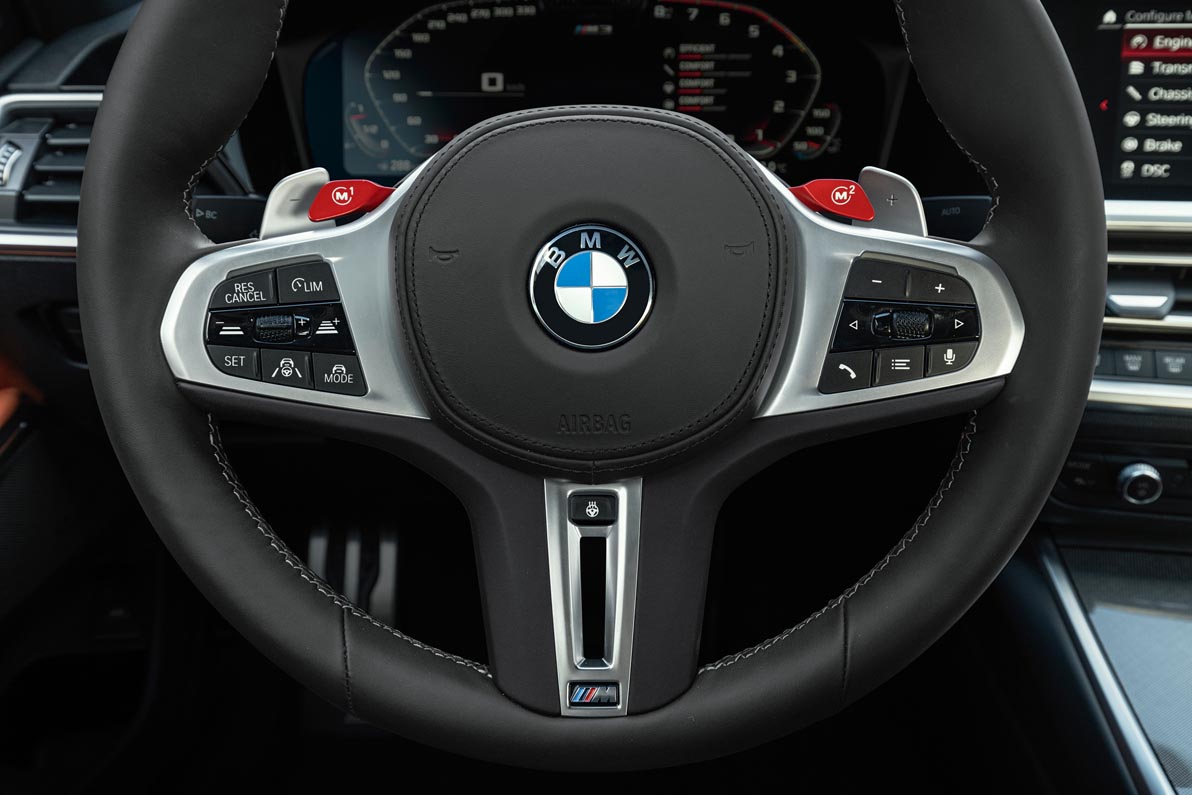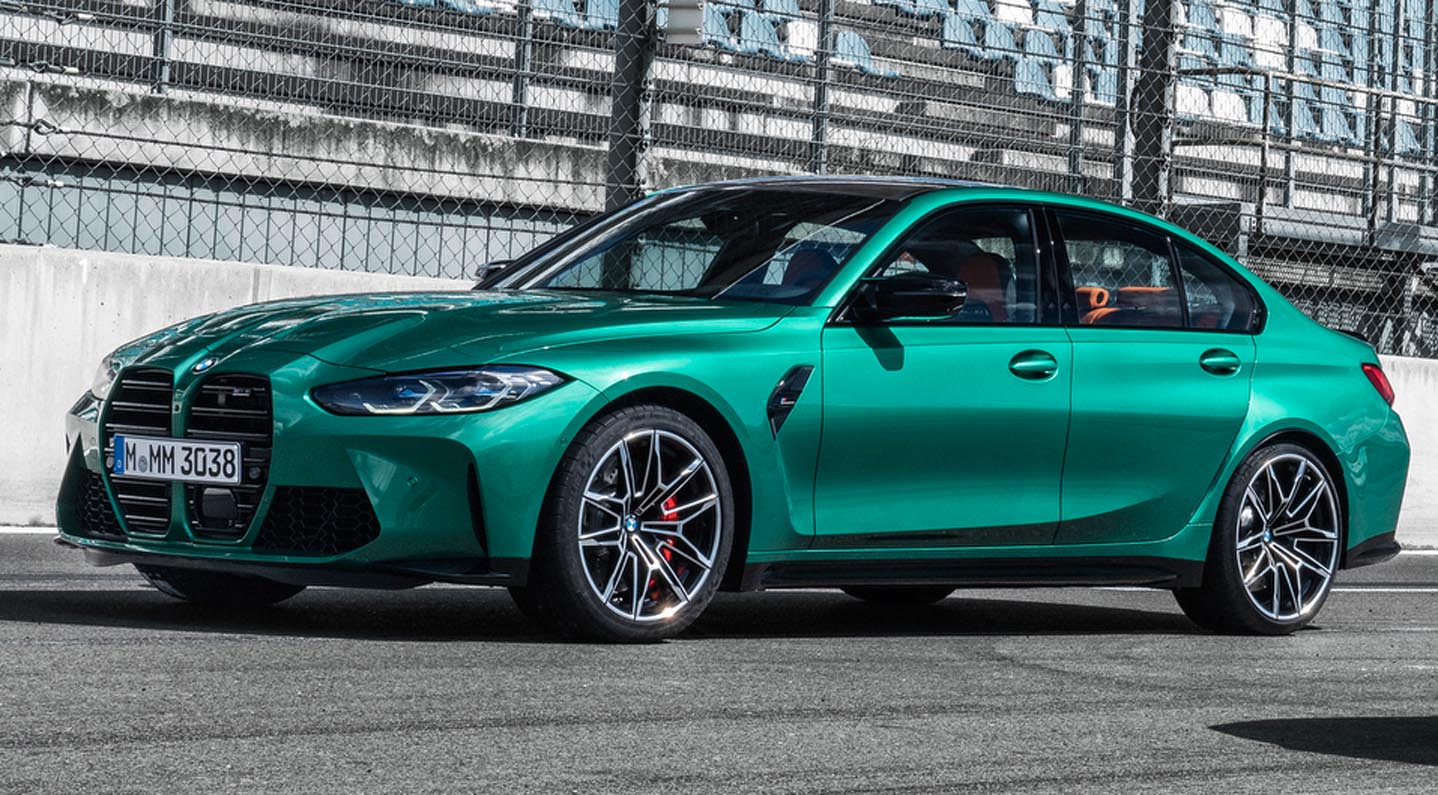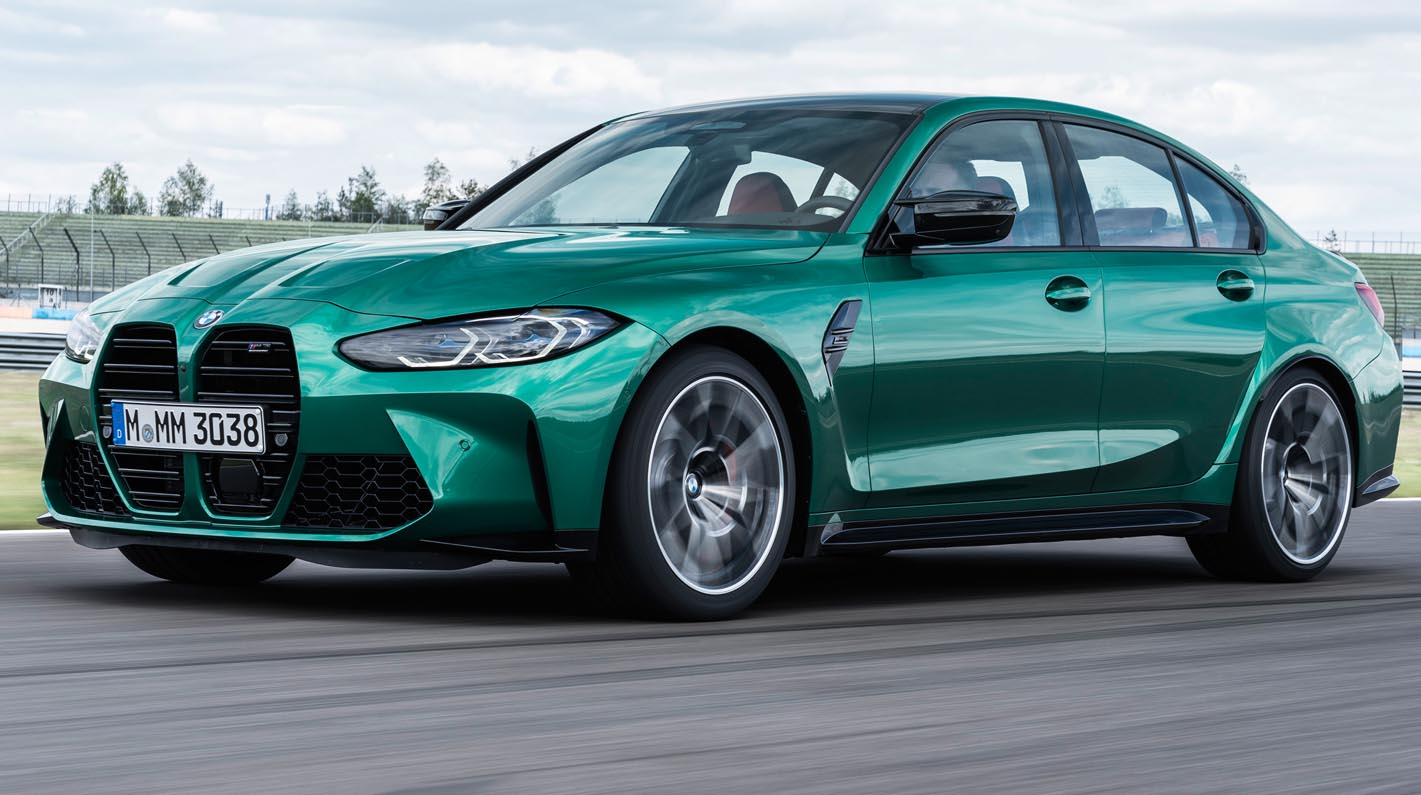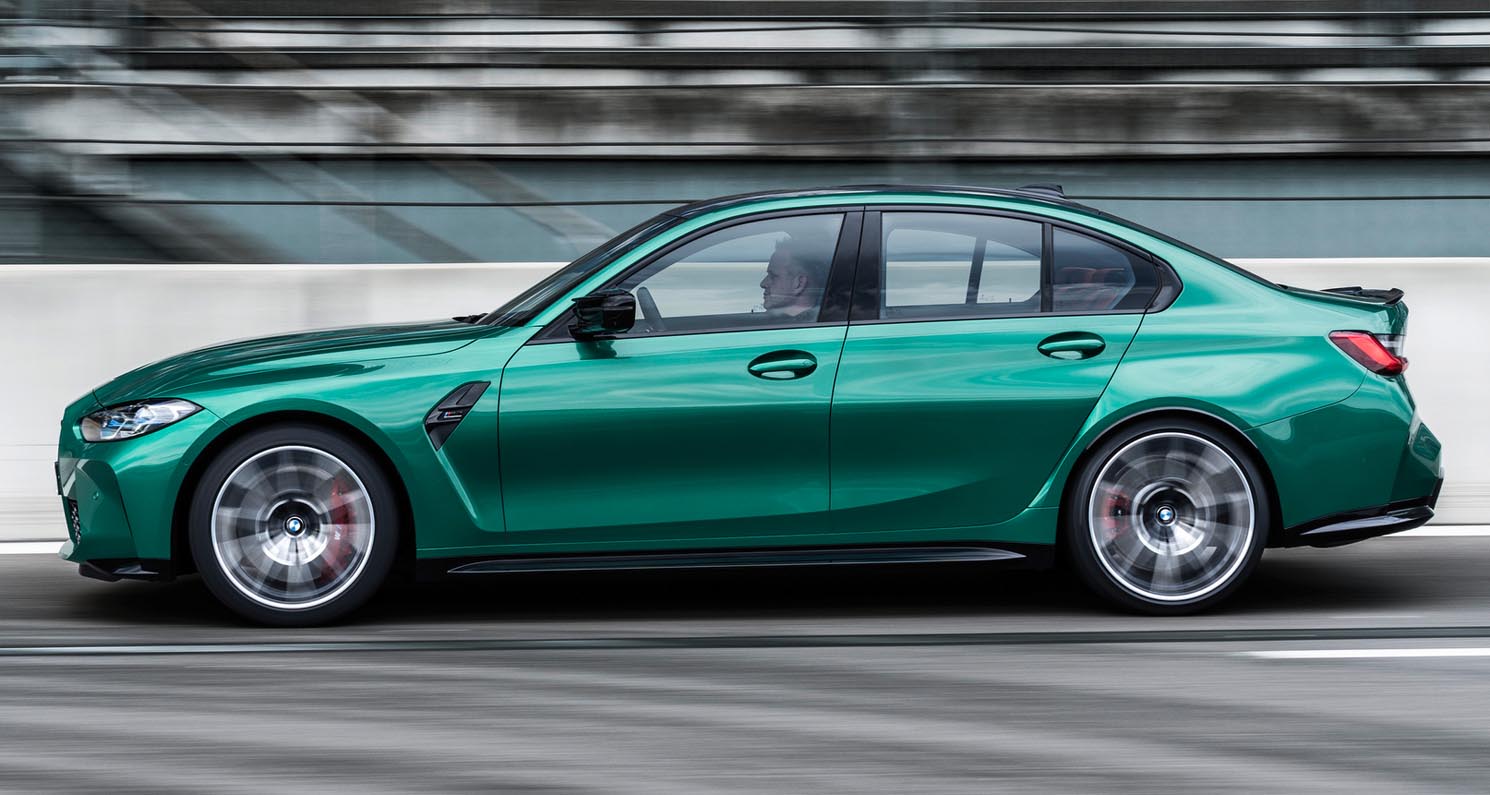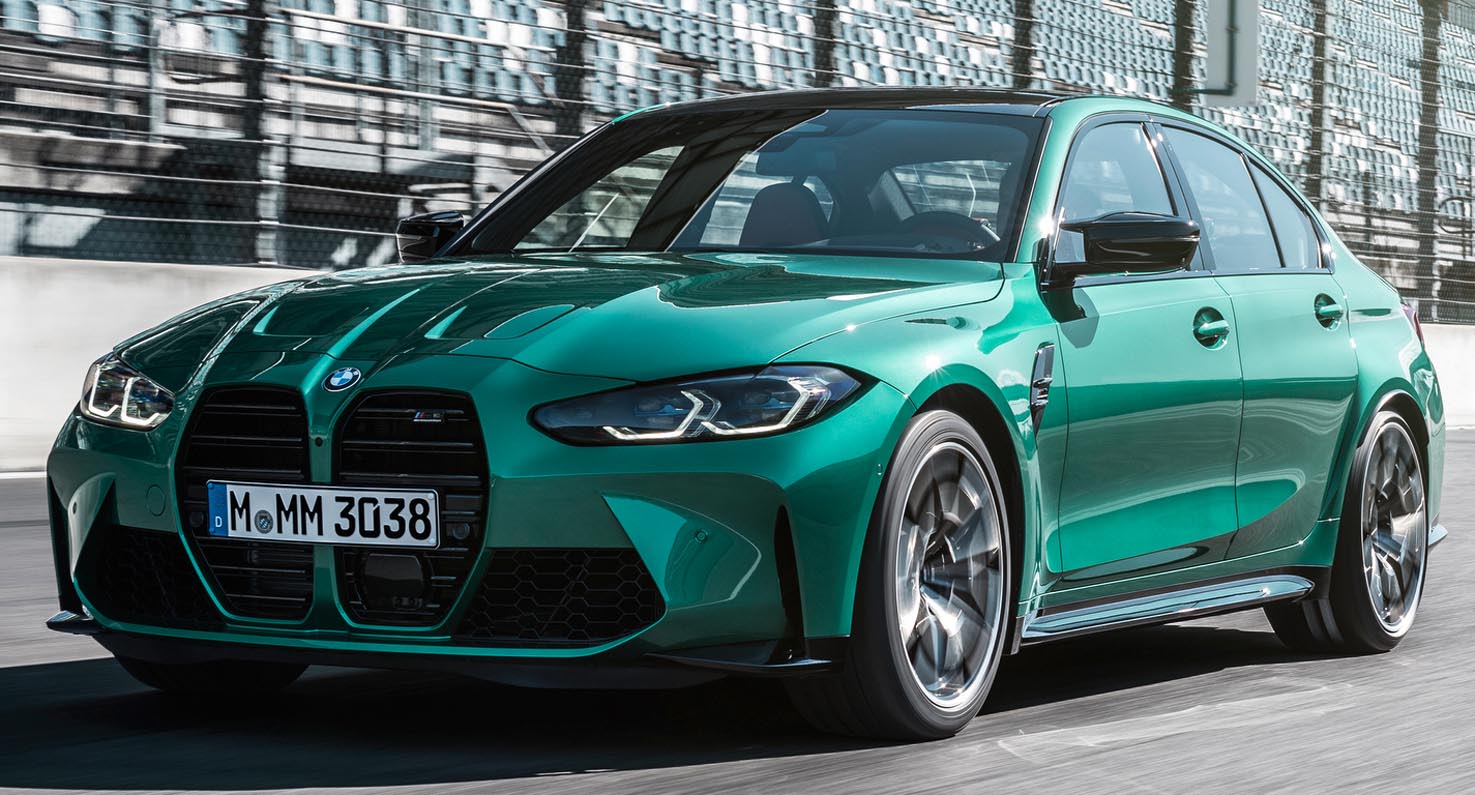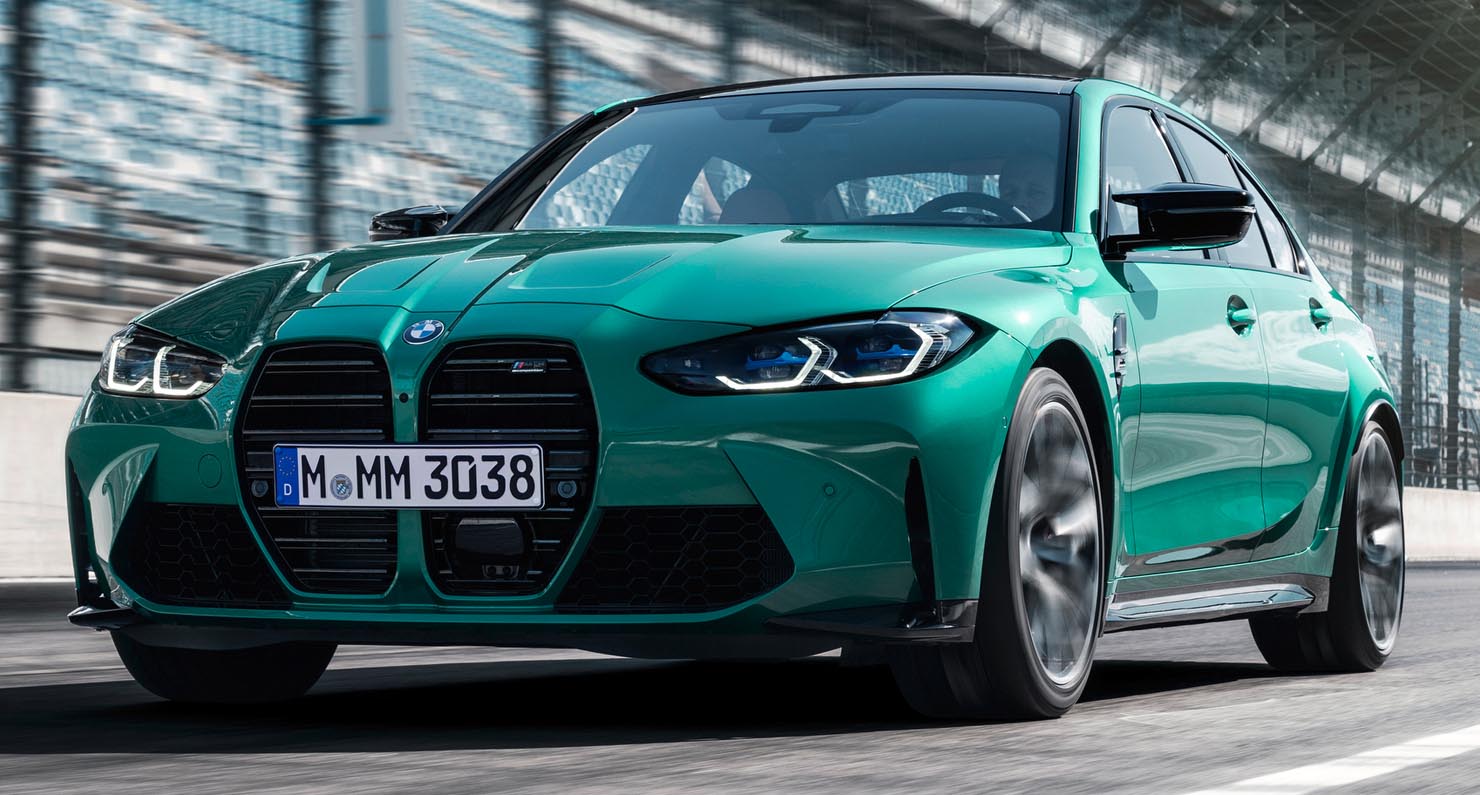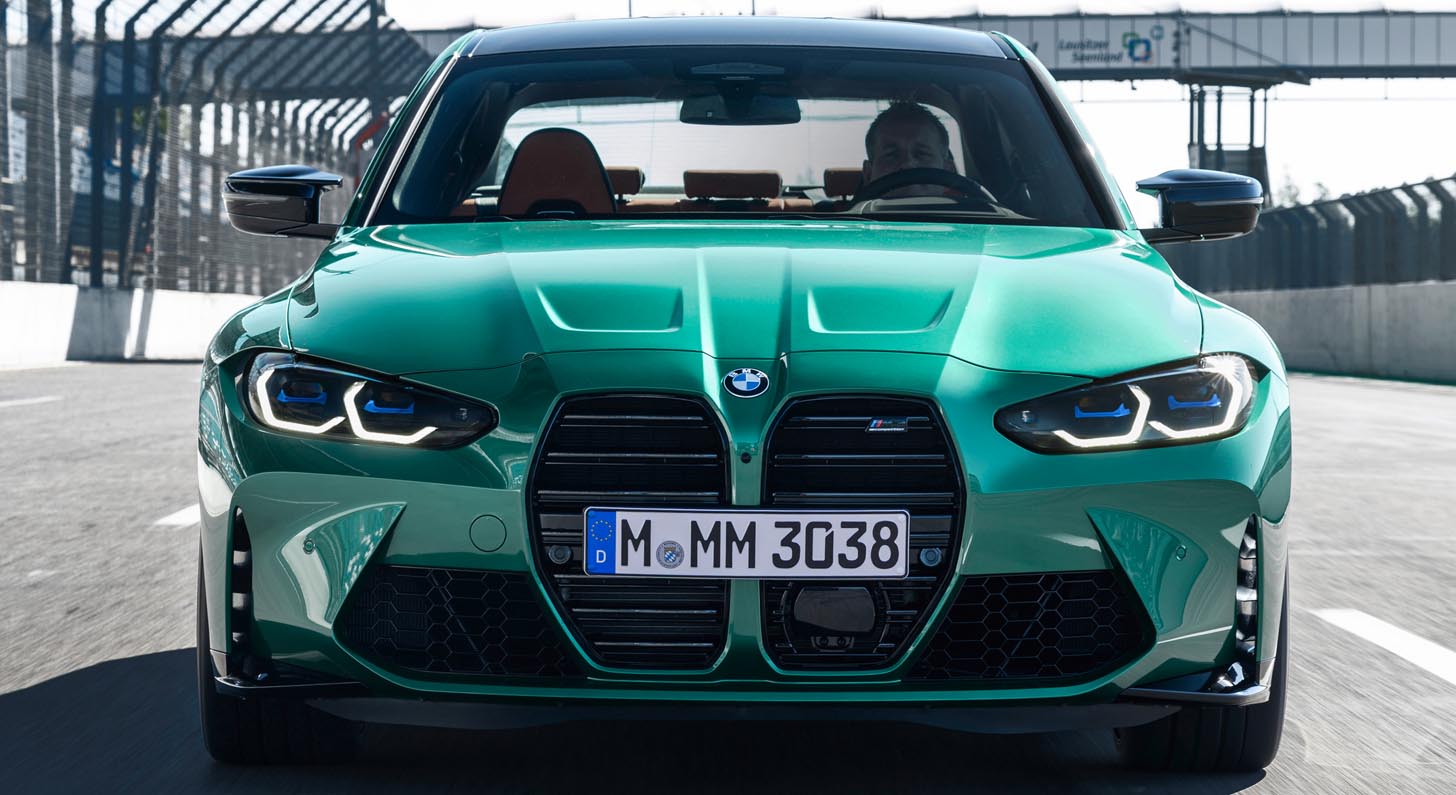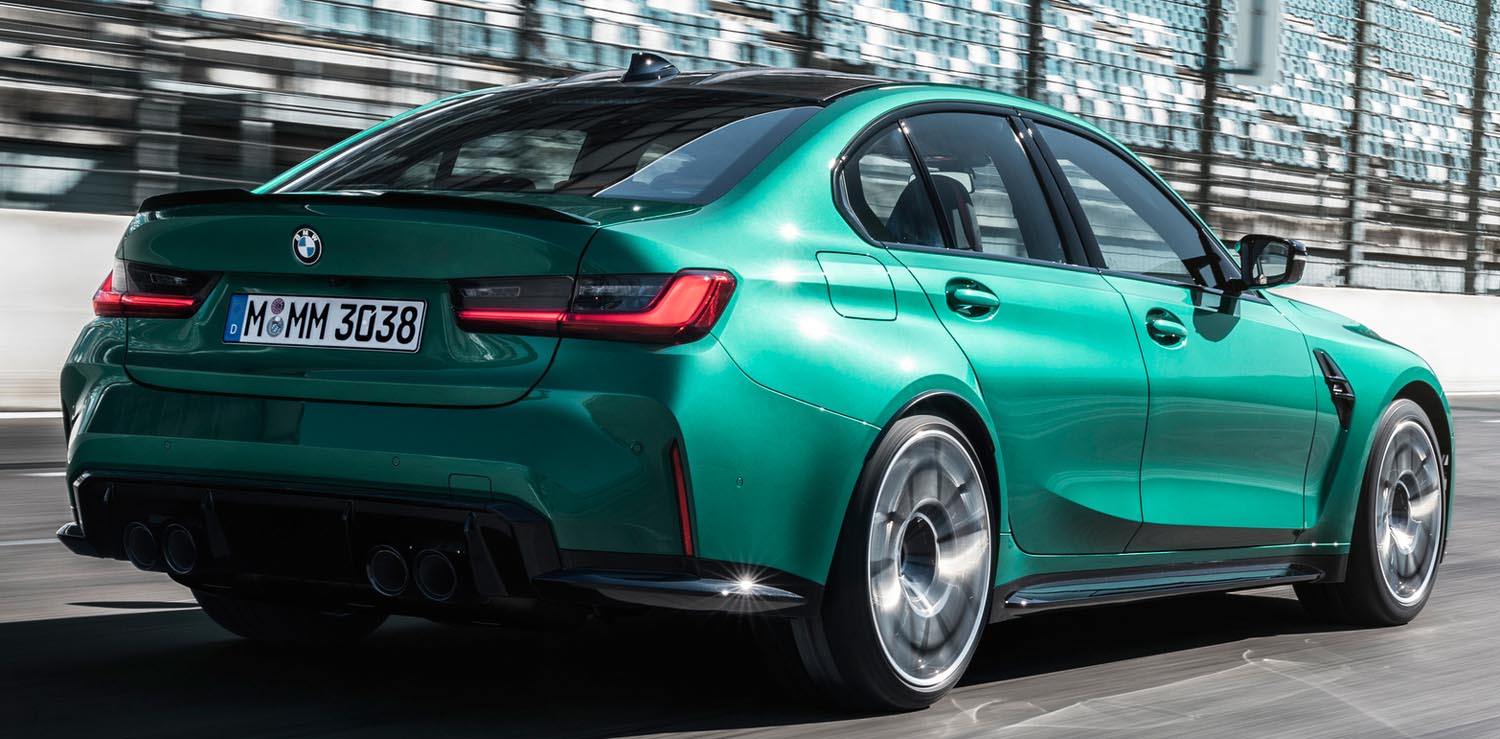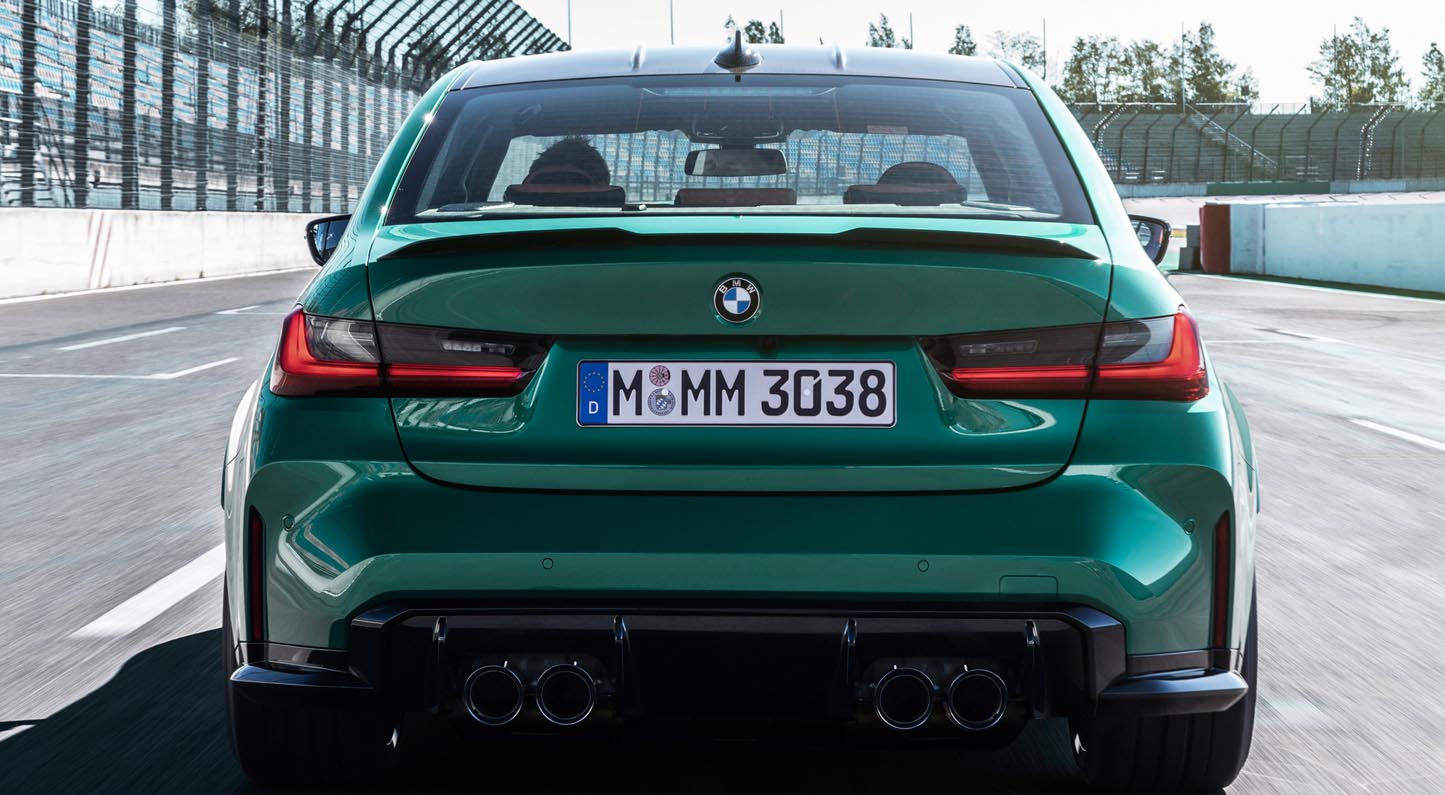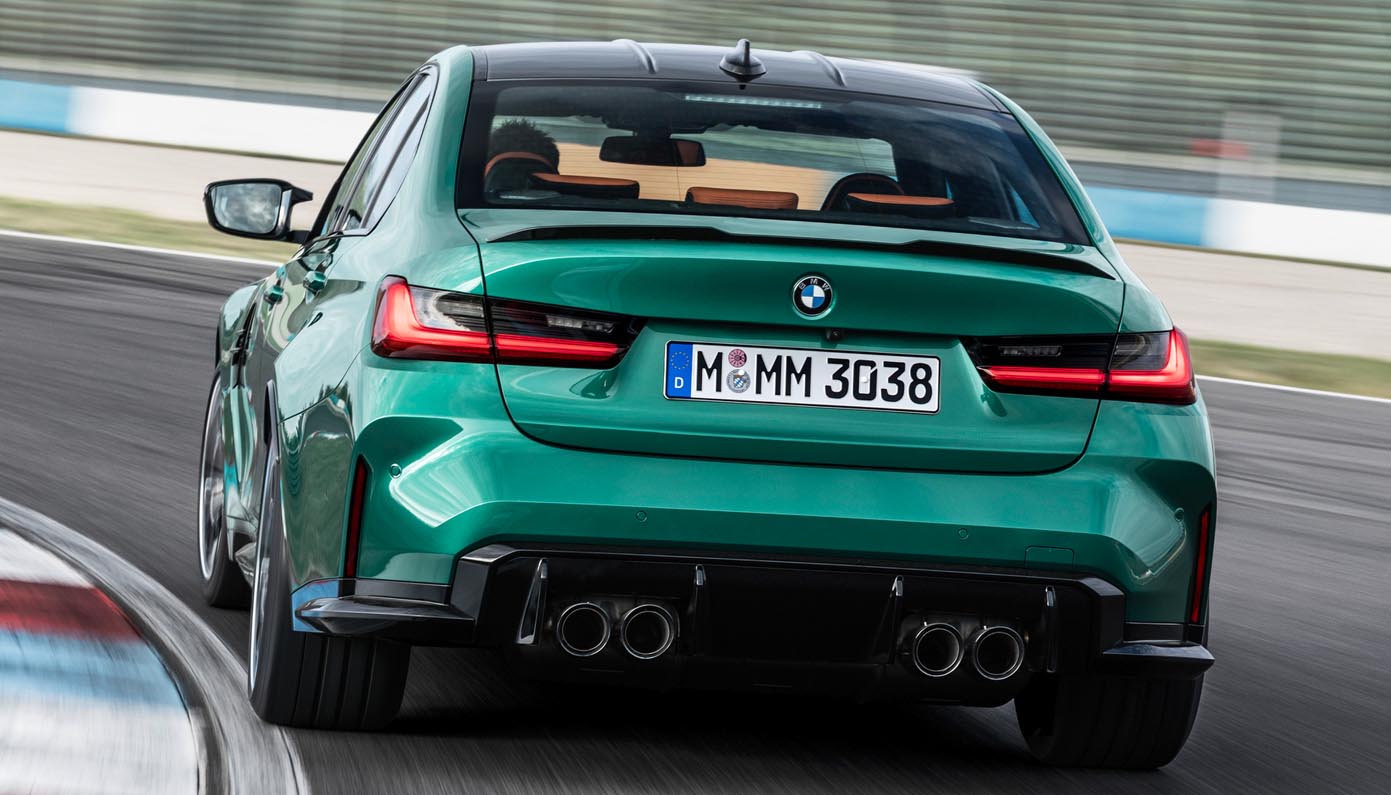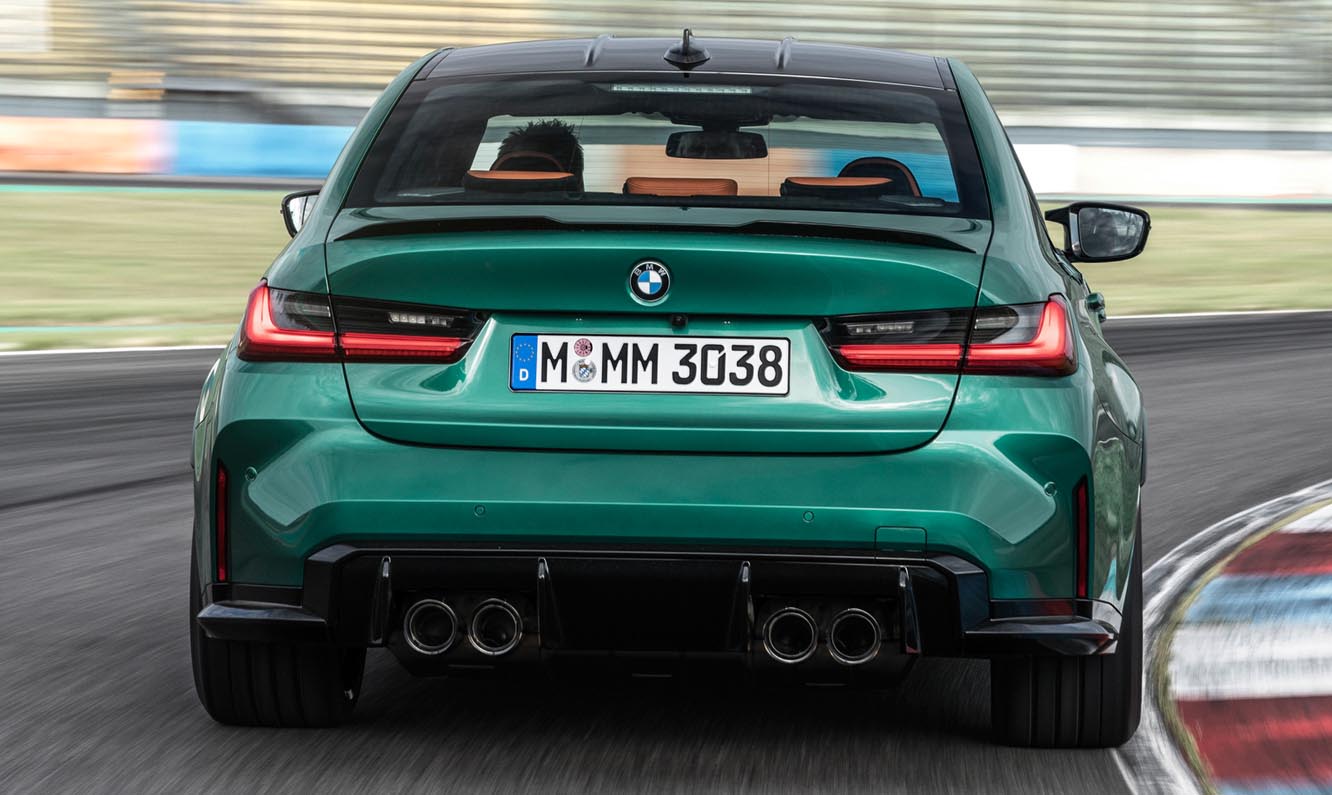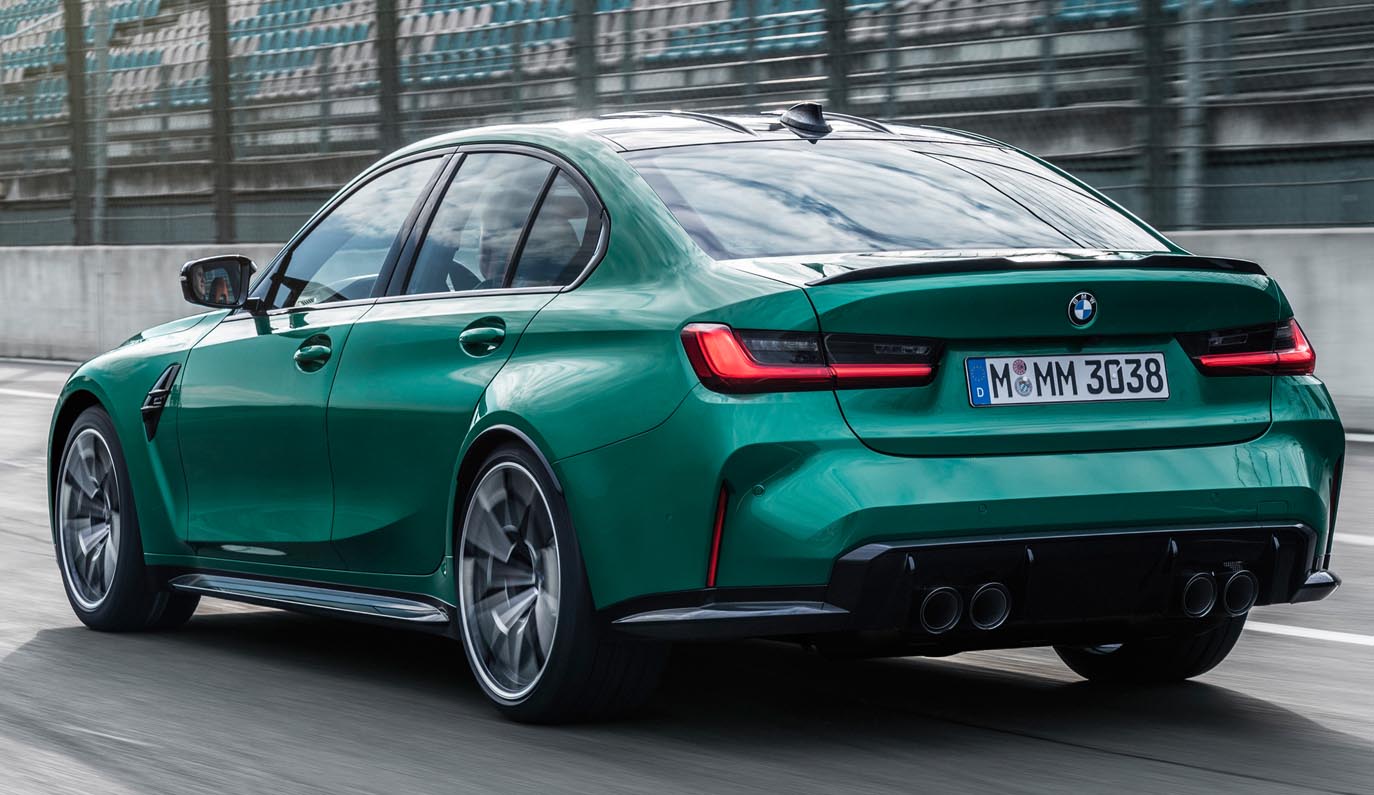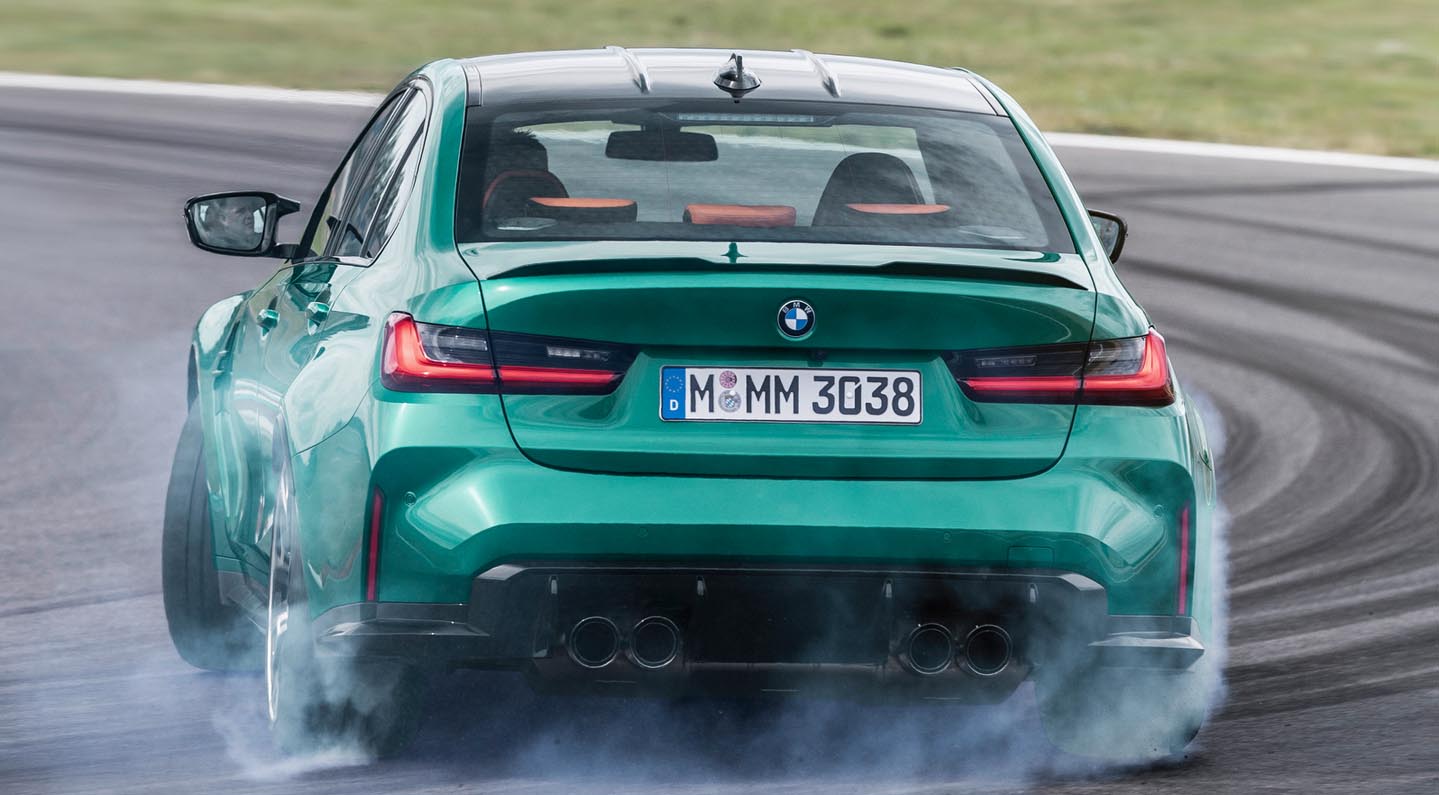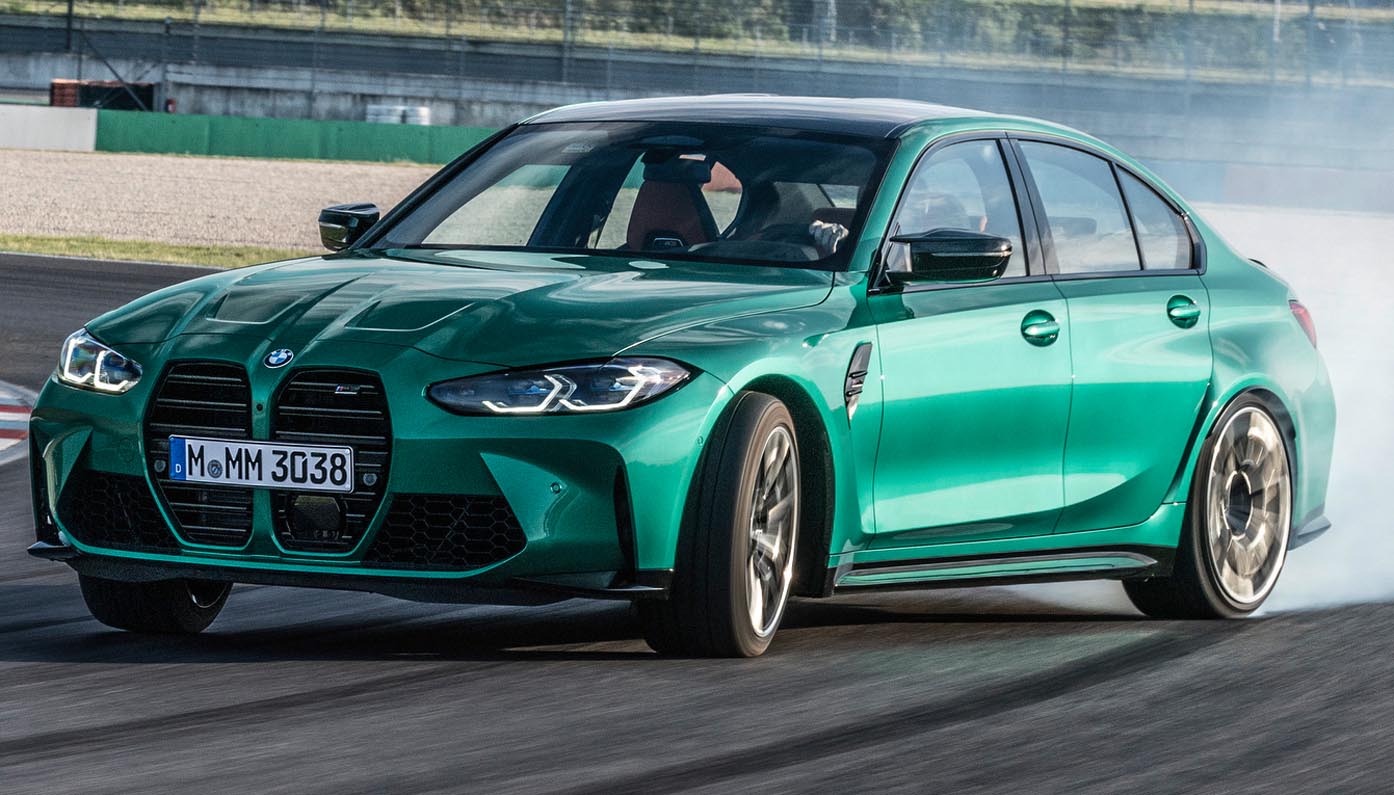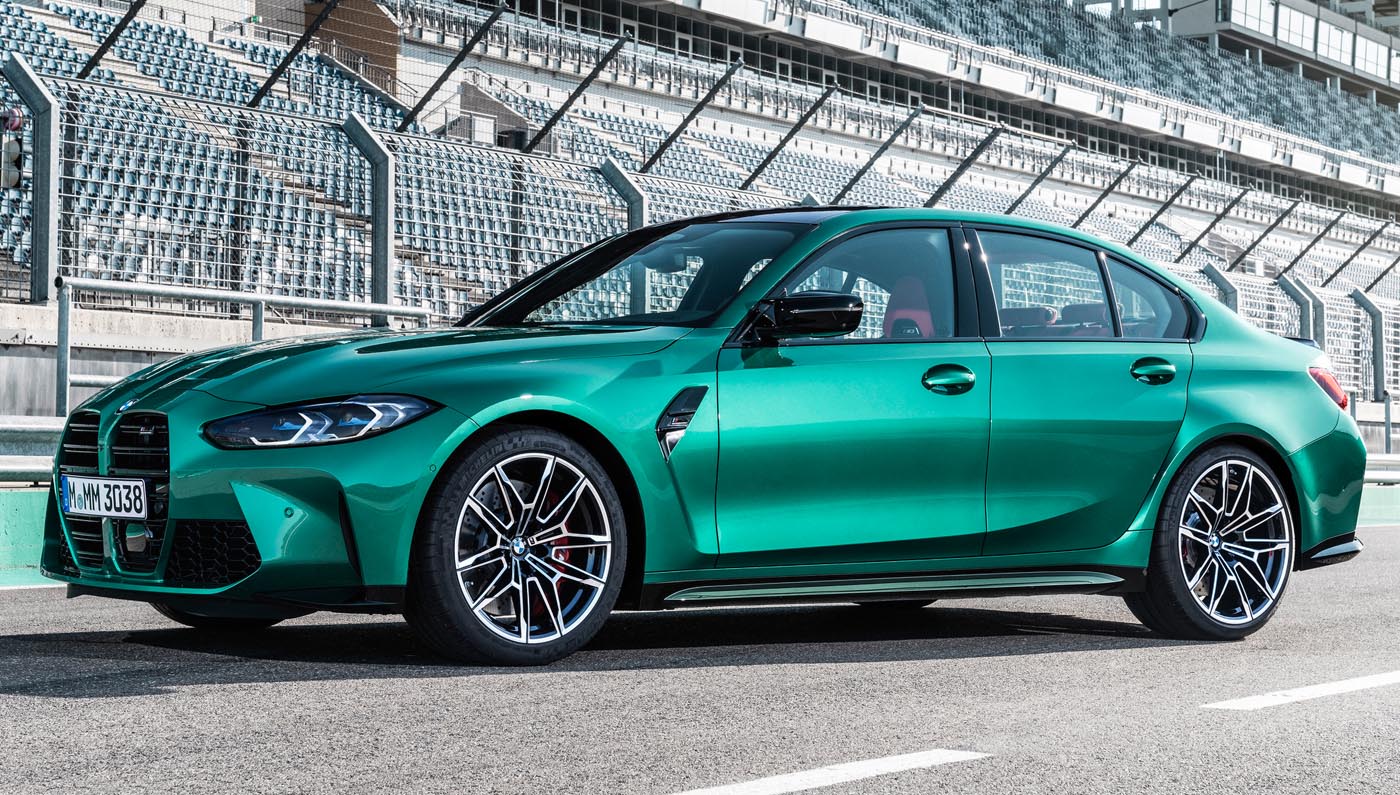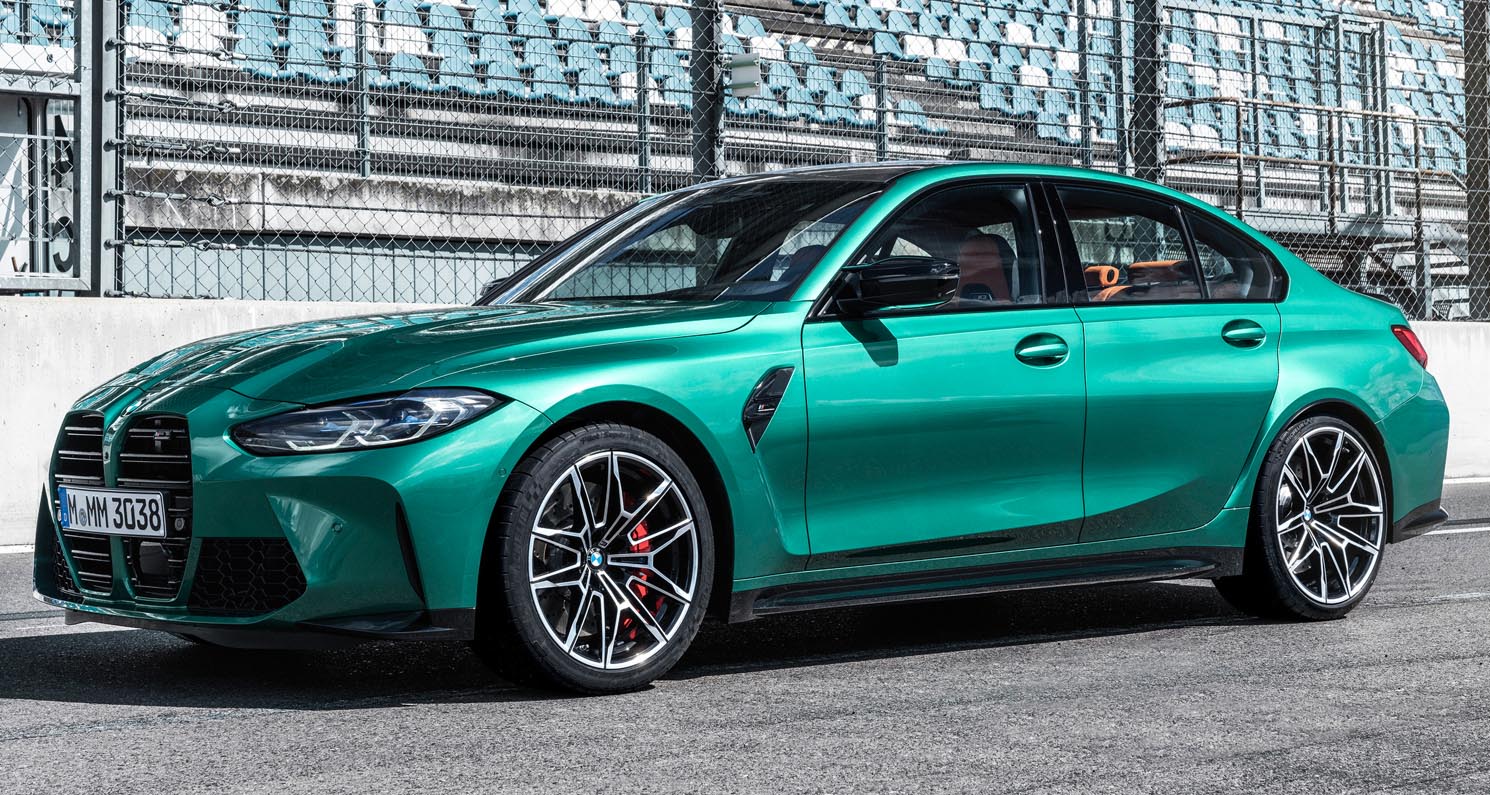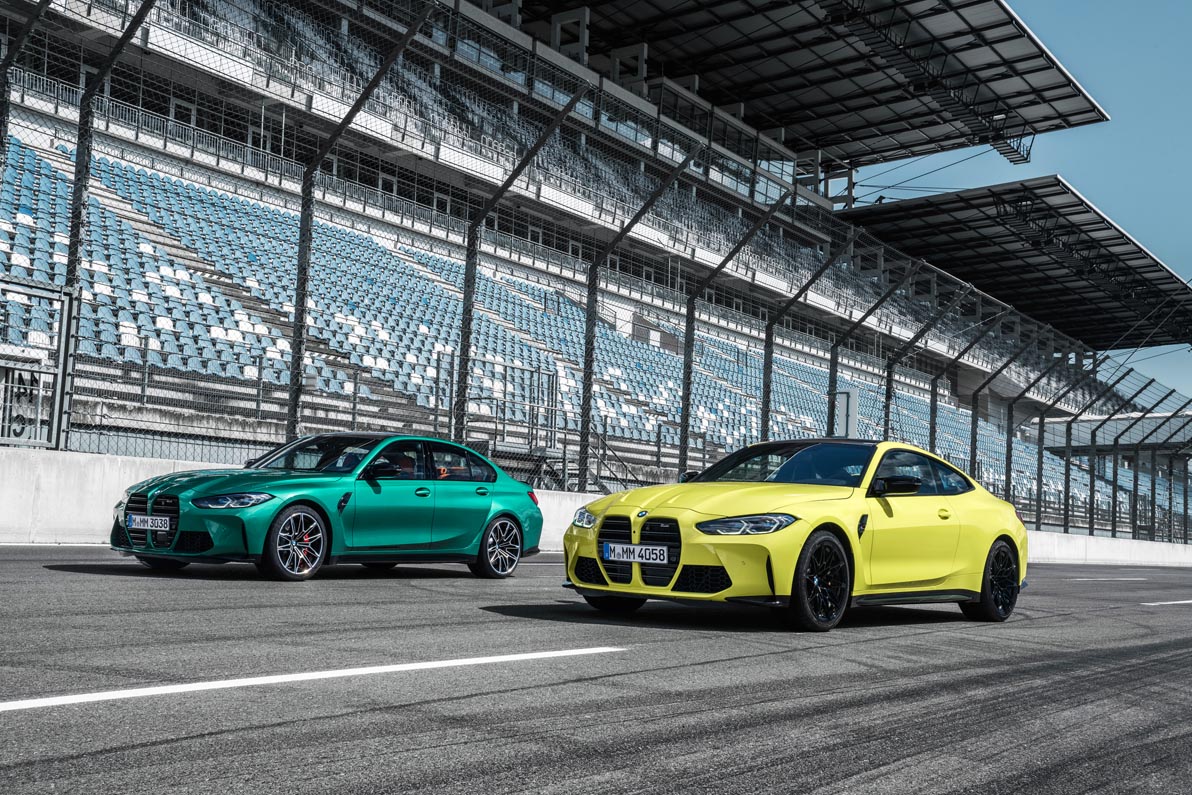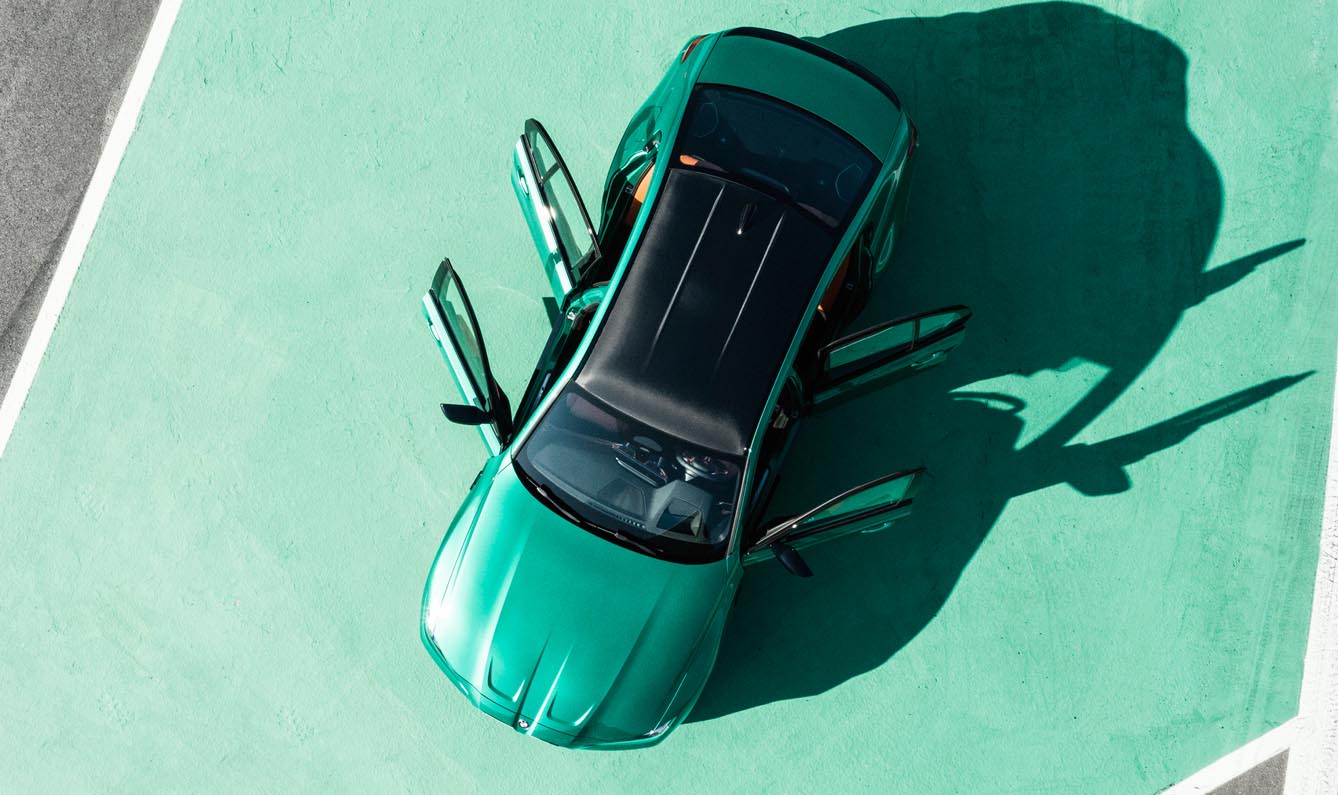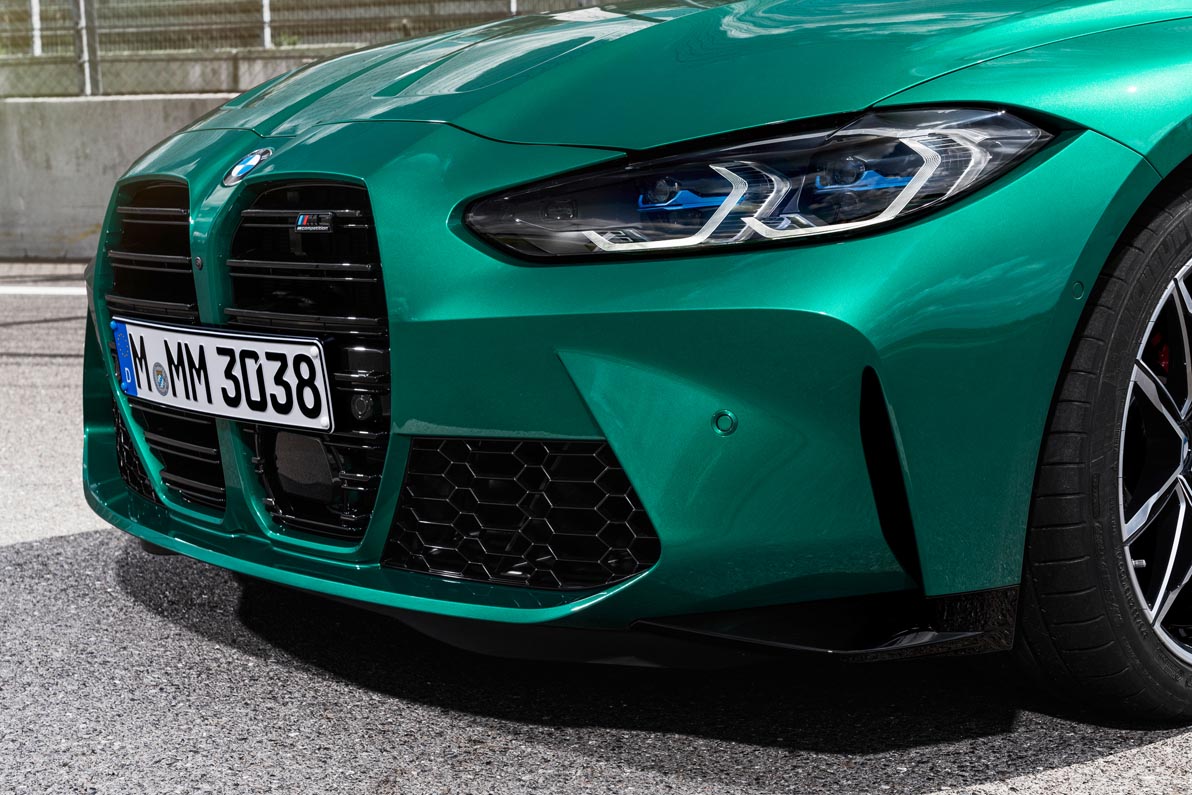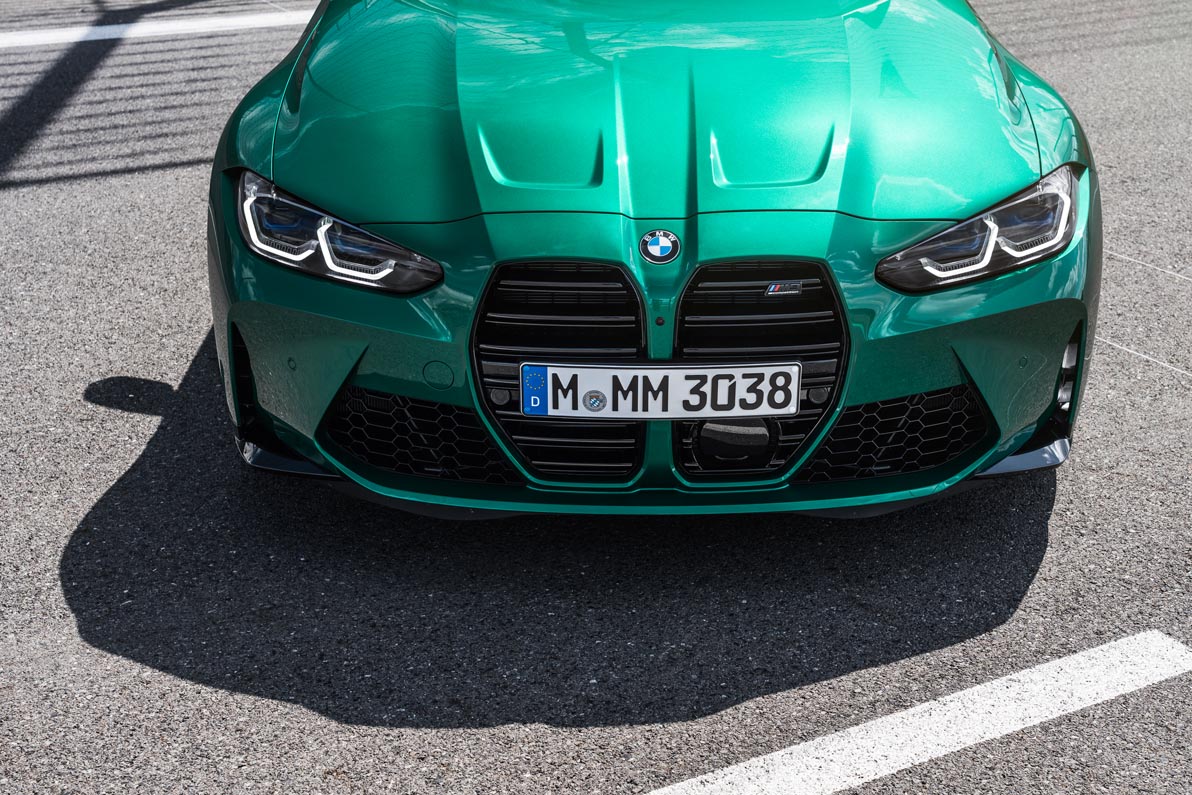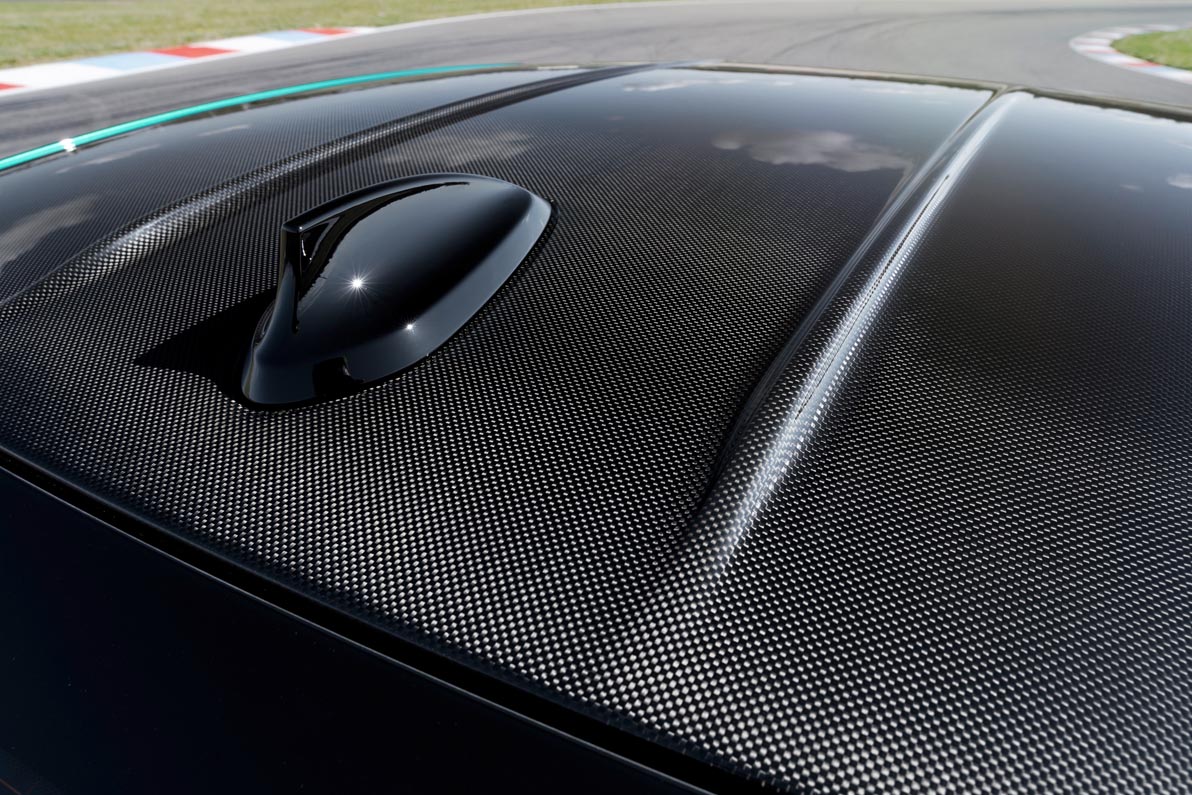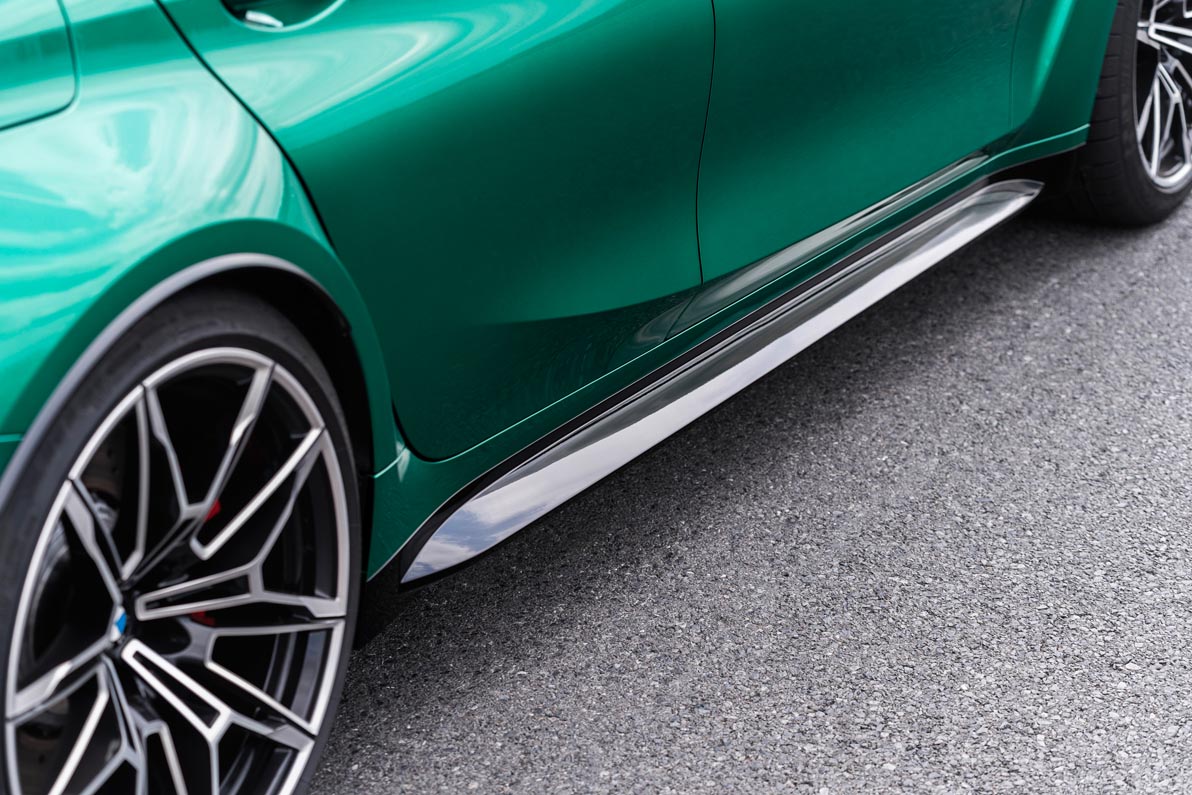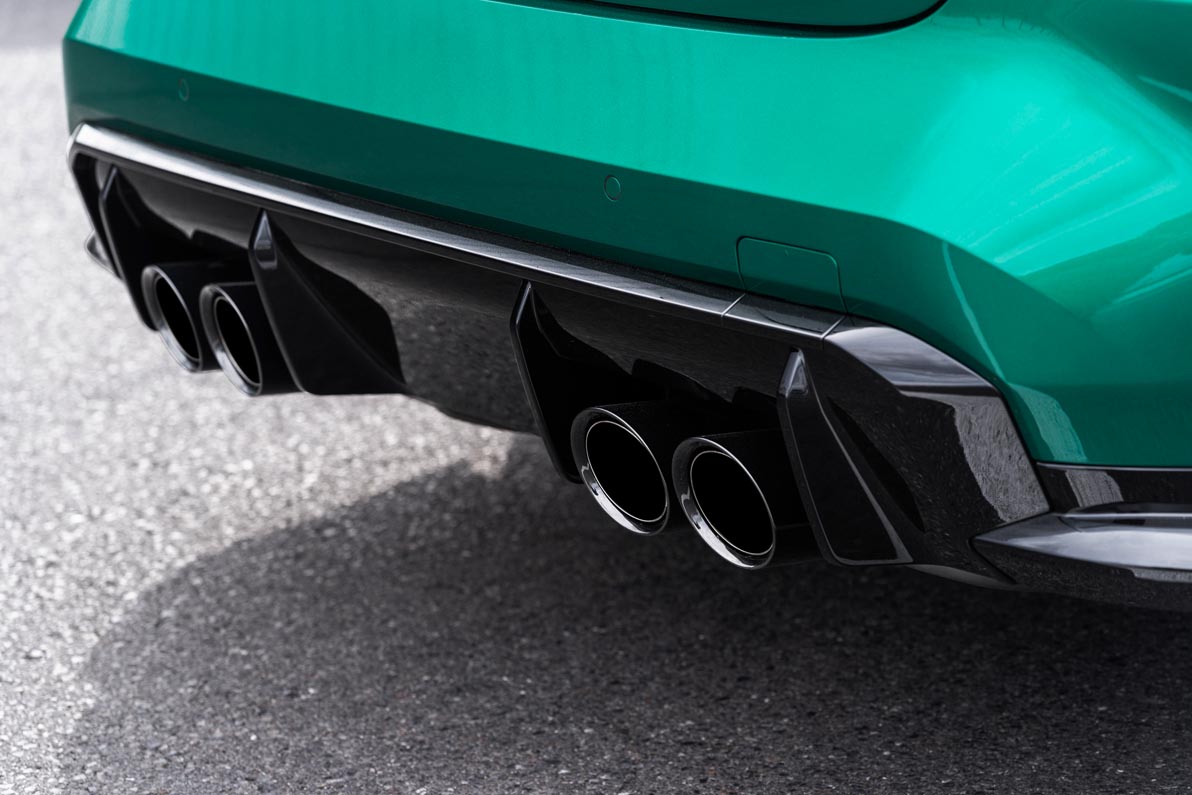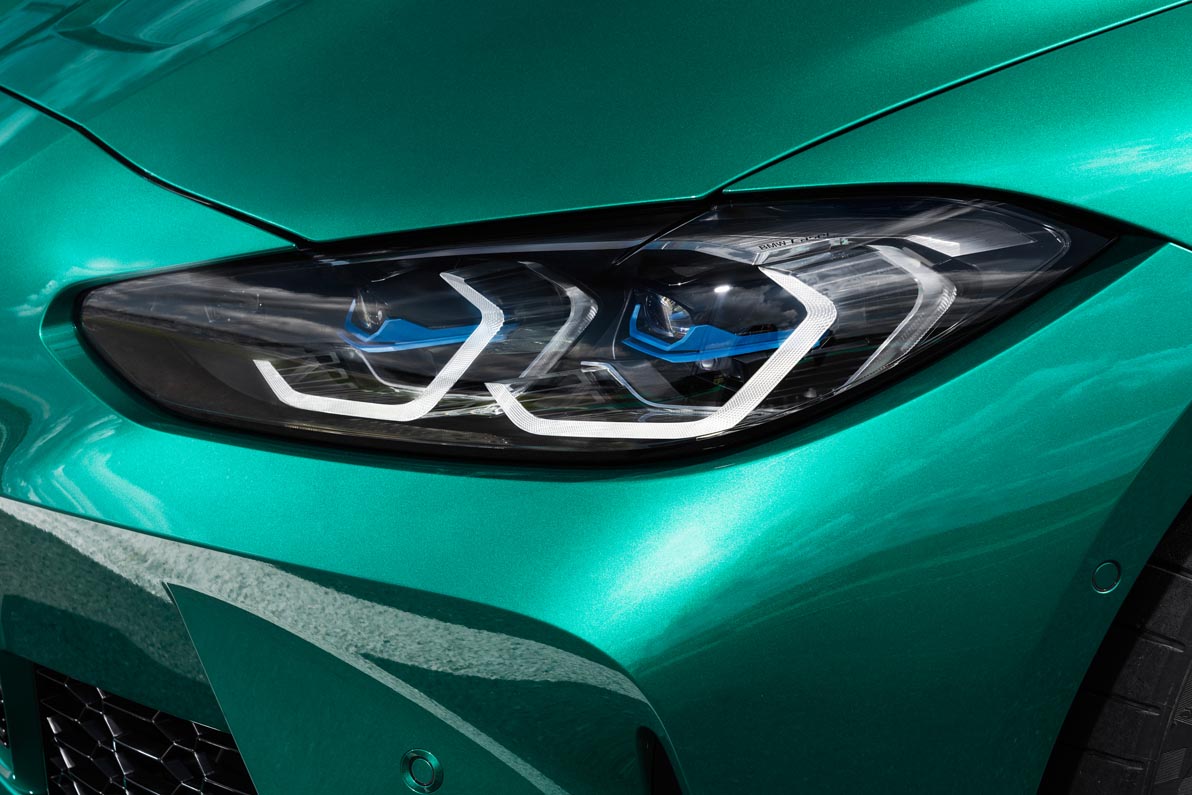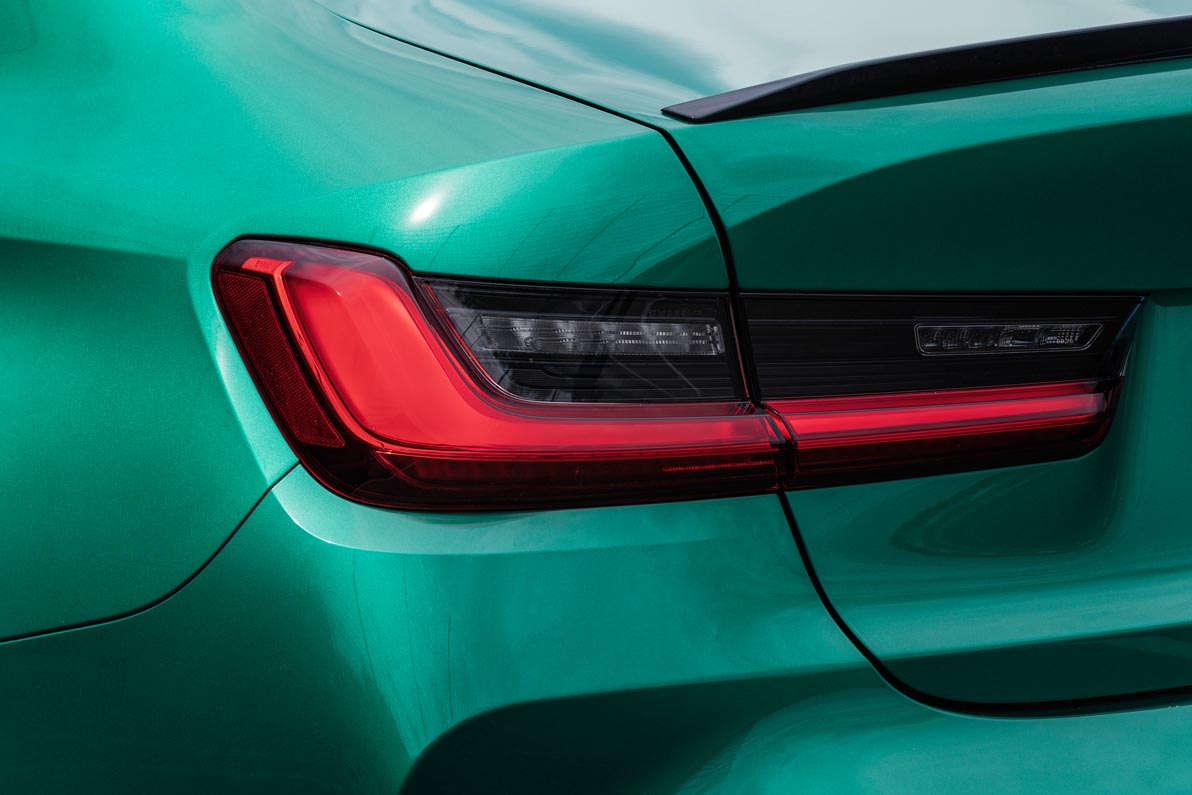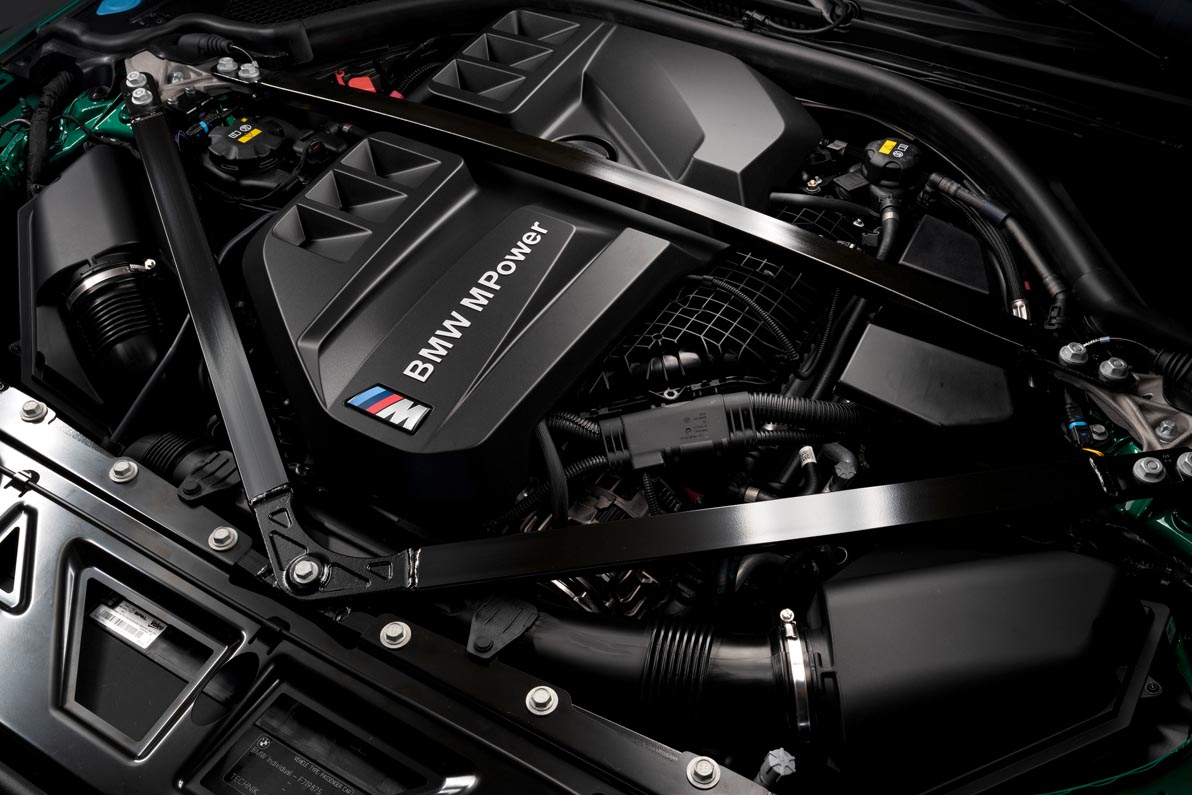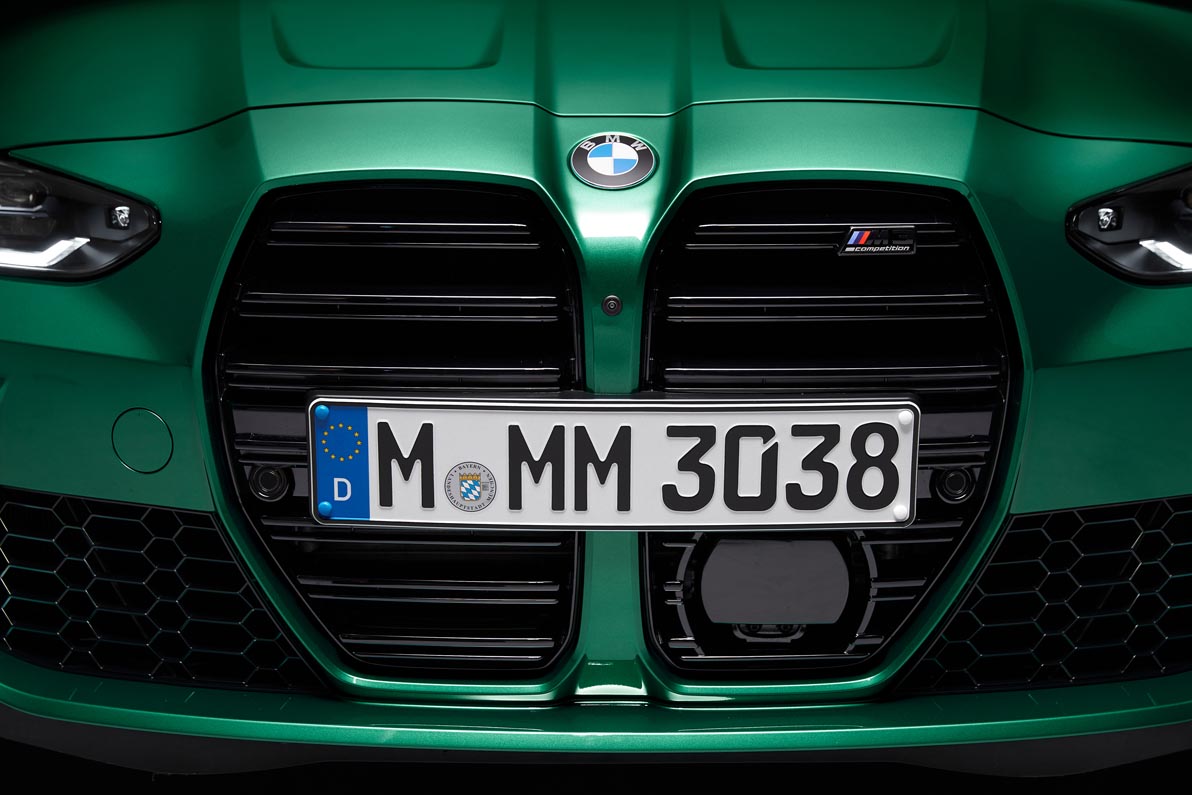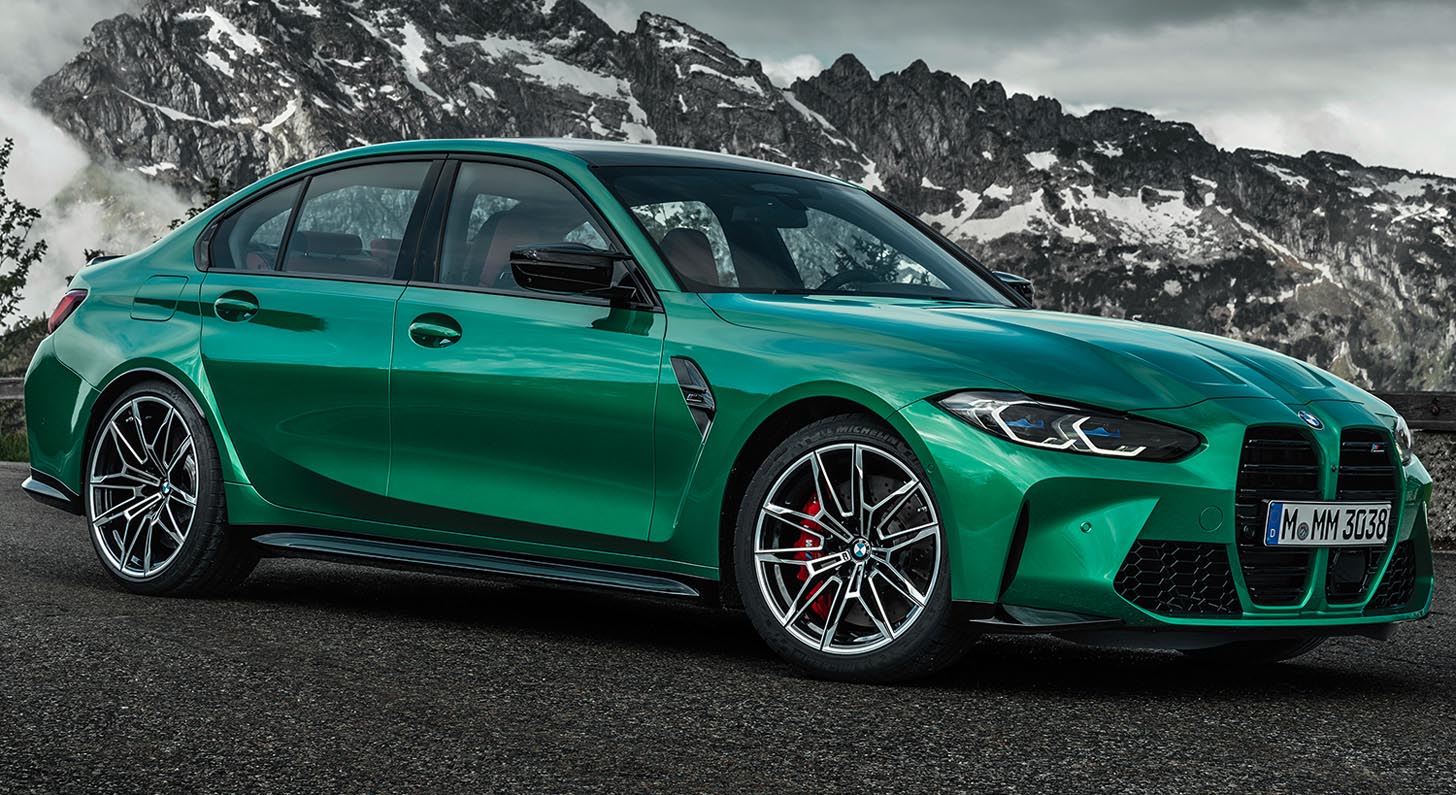
The standard-bearers for racing-car exhilaration in everyday driving are primed for action in new-generation form. 35 years after the first BMW M3 took to the stage, BMW M GmbH is presenting the latest generation of its high-performance models at the premium end of the midsize class.
The new BMW M3 Sedan and new BMW M4 Coupé stand shoulder-to-shoulder in their interpretation of dynamically thrilling driving pleasure – characterised by a time-honoured sporting spirit and executed with cutting-edge technology. The two cars occupy very different territory: one a sedan with space for five occupants, the other a four-seater coupé. And the powertrain technology at work also offers drivers greater scope than ever for indulging personal preferences.
The high-revving six-cylinder in-line engine with M TwinPower Turbo technology at the heart of both models is available in two output levels. Nowhere else in this segment can customers choose a six-speed manual gearbox for their high-performance sports car, while an eight-speed M Steptronic transmission with Drivelogic and the intelligent all-wheel-drive system M xDrive – as an alternative to classical rear-wheel drive – both also find their way onto the specification sheets.
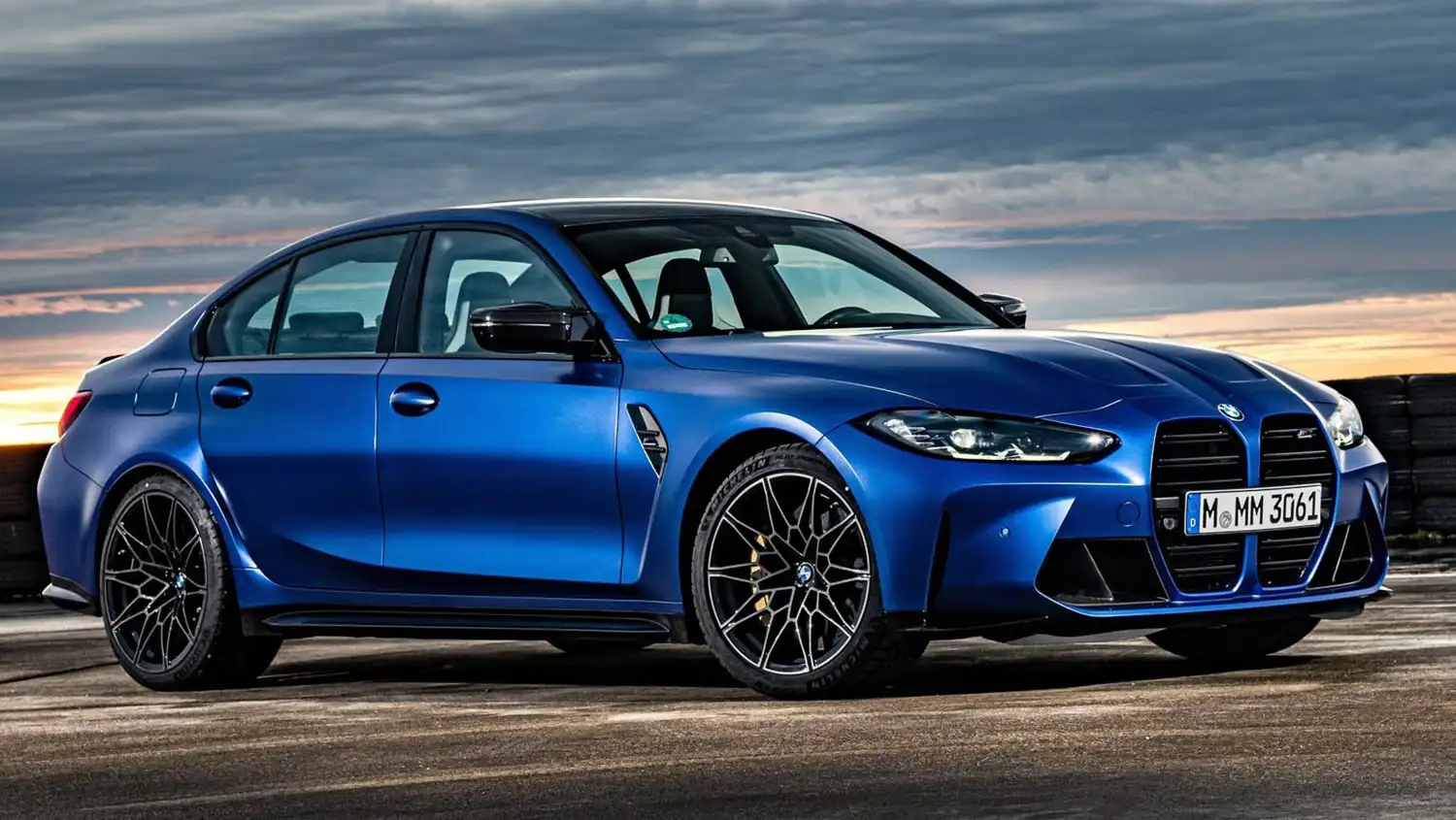
A variety of powertrain options unsurpassed in their segments provides both the new BMW M3 Sedan and new BMW M4 Coupé with three distinct character options. Offering a performance experience of authentic purity are the examples of the new BMW M3 Sedan and new BMW M4 Coupé which channel the six-cylinder in-line engine’s maximum output of 353 kW/480 hp to the rear wheels via a six-speed manual gearbox. In the new BMW M3 Competition Sedan and new BMW M4 Competition Coupé, meanwhile, the 375 kW/510 hp version of the straight-six teams up with an eight-speed M Steptronic transmission and sends its power to the rear wheels as standard. The two Competition models will also be available (est. from summer 2021) with M xDrive, handing them even greater directional stability and supreme traction without compromising on agility.
All of which equips the new high-performance models from BMW M GmbH to extend their lead over their segment rivals. The new BMW M3 Sedan will be built at BMW Plant Munich alongside the new BMW 3-Series Sedan. Production of the new BMW M4 Coupé will take place at BMW Plant Dingolfing, where models including the new BMW 4-Series Coupé, BMW M5 and all variants of the BMW M8 also roll off the assembly line.
Their global market launch will get underway in March 2021, with the all-wheel-drive Competition models scheduled to join the fray in summer 2021.
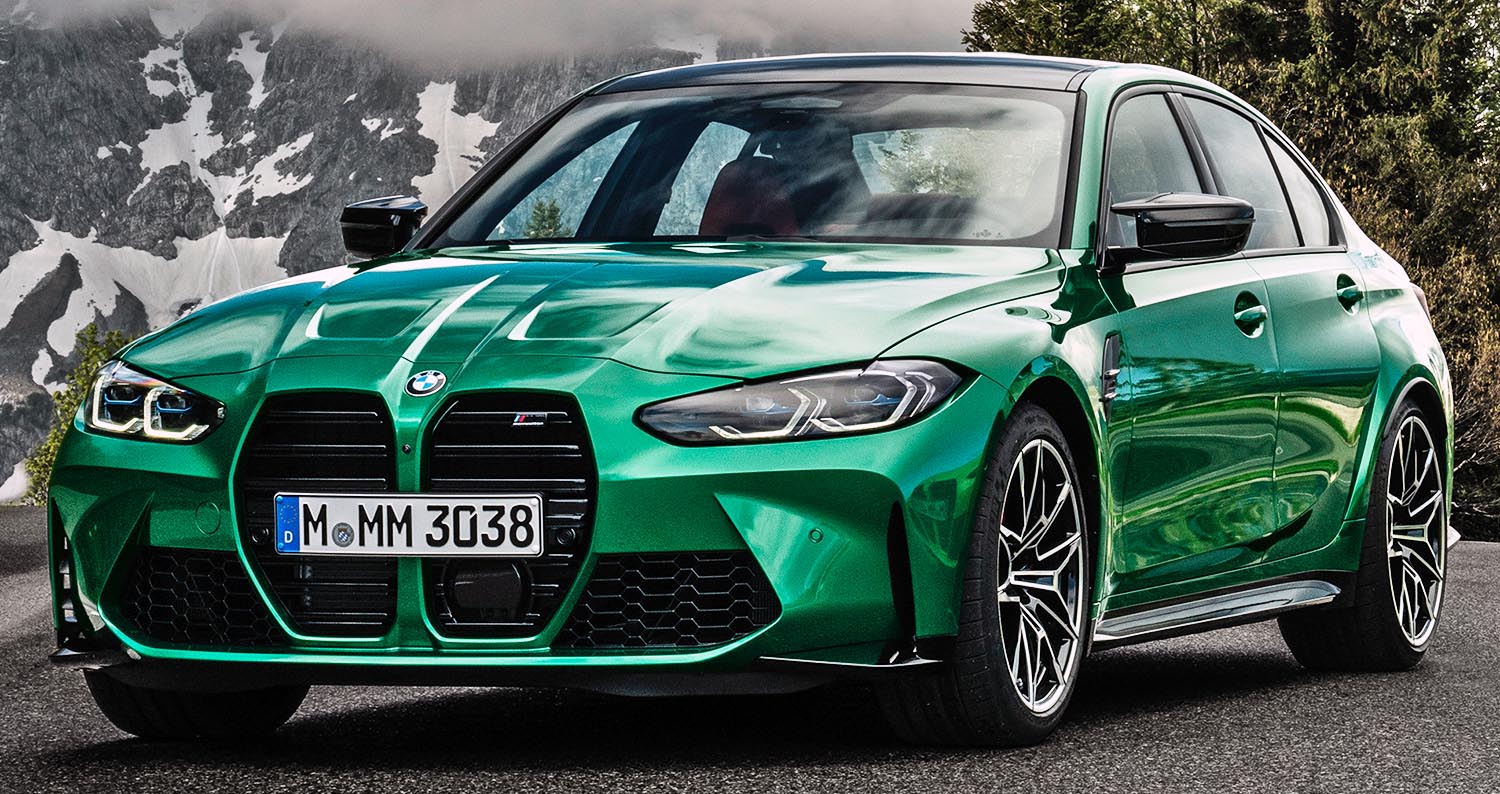
Six-cylinder in-line engine delivers standout performance in signature M high-revving style
The engines powering the new high-performance models set a new high point in terms of output and torque for six-cylinder in-line petrol units from BMW. The advances made as the outgoing generation hands over to the new are striking. The power unit in the Competition models raises the maximum output of its counterpart in the predecessor models by 44 kW/60 hp and betters its peak torque by 100 Nm (74 lb-ft).
The new straight-six engines combine the hallmark high-revving character of BMW M GmbH engines with the latest version of M TwinPower Turbo technology. The 3.0-litre unit impresses in both output grades with its instantaneous power delivery and appetite for revs, which it sustains without interruption into the higher reaches of the engine speed range. Together, these attributes carve out the unmistakable profile – dominated by linear power delivery – that has marked out the performance experience in BMW M models since their arrival on the scene. The new straight six provides the basis for the ultra-powerful heartbeat in the new BMW M4 GT3 endurance racer.
The variant of the engine in the new BMW M3 Sedan and new BMW M4 Coupé serves up peak torque of 550 Nm (405 lb-ft) all the way from 2,650 to 6,130 rpm. Its maximum output of 353 kW/480 hp is available at 6,250 rpm. The unit fitted in the Competition models likewise maintains peak torque across a wide rev band, with 650 Nm (479 lb-ft) on tap between 2,750 and 5,500 rpm. Maximum output of 375 kW/510 hp is developed at 6,250 rpm, with the engine’s red line arriving at 7,200 rpm.
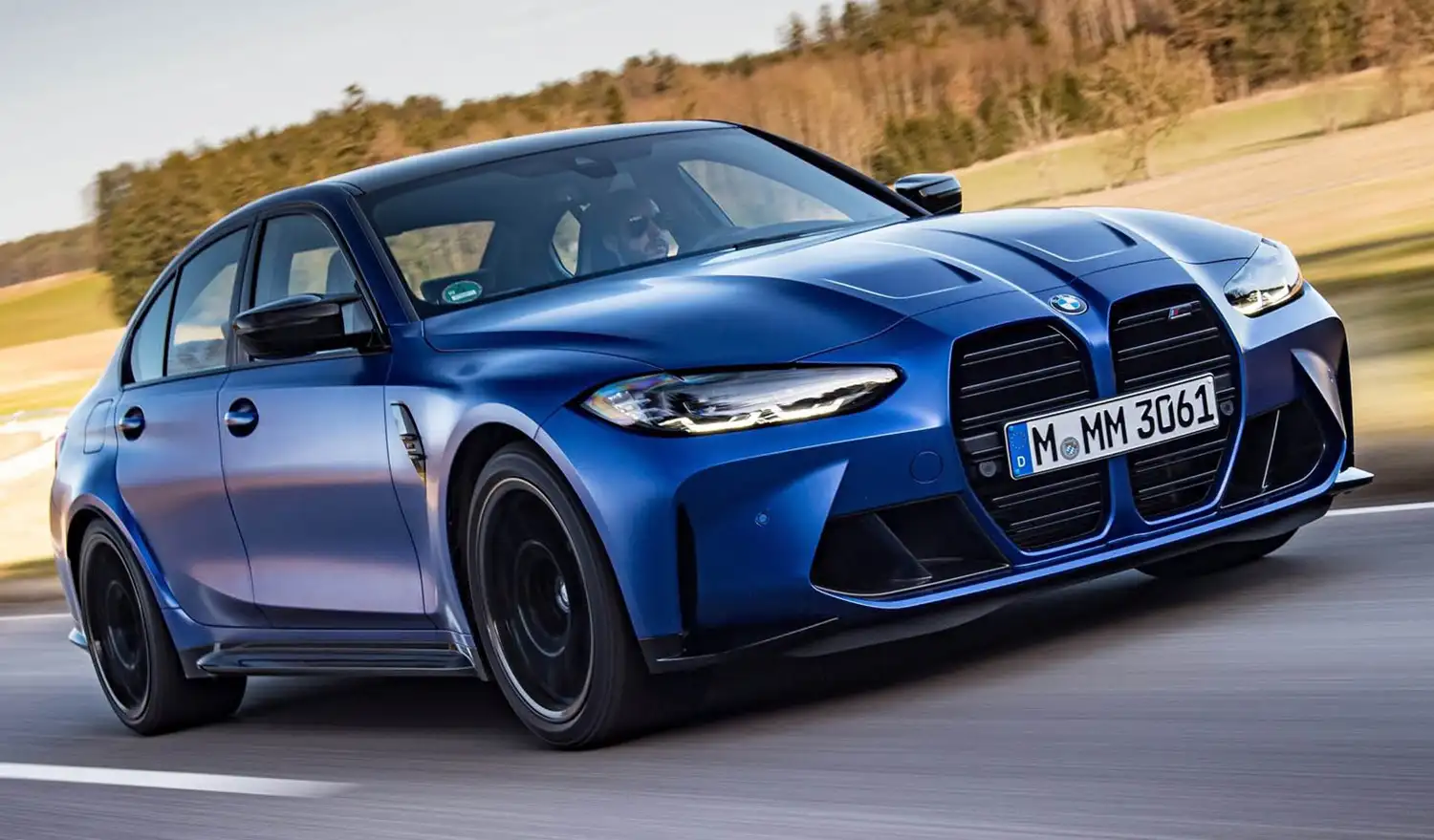
The engines’ performance skillset ensures the driver experiences imposing acceleration out on the road. And their figures on paper are equally as stunning. The new BMW M3 Sedan and new BMW M4 Coupé require just 4.2 seconds to power from 0 to 100 km/h (62 mph). 0 to 200 km/h (124 mph) takes 13.7 seconds, and the midrange surge from 80 to 120 km/h (50 – 75 mph) is signed and sealed in 4.1 seconds (in 4th gear) or 5.6 seconds (in 5th gear). The Competition models each accelerate from 0 to 100 km/h (62 mph) in 3.9 seconds and from 0 to 200 km/h (124 mph) in 12.5 seconds, and sprint from 80 to 120 km/h (50 – 75 mph) in 2.6 seconds (in 4th gear) or 3.4 seconds (in 5th gear). The top speed of all model variants is electronically limited to 250 km/h (155 mph), rising to 290 km/h (180 mph) if the optional M Driver’s Package is specified.
Low-weight construction, technology from the race track
The engine owes its power output, efficacy and track ability to a construction born out of BMW M GmbH’s many years of motor racing experience and the use of M-specific components developed to provide maximum performance. A sleeve-free closed-deck construction gives the crankcase extremely high rigidity. This enables exceptional combustion pressure, which optimises output. A wire-arc sprayed iron coating for the cylinder walls reduces both frictional losses and weight. The crankshaft drive has exceptional torsional resistance, paving the way for outstanding power development and extremely high torque levels. The forged lightweight crankshaft in the unit for the new BMW M3 Sedan and new BMW M4 Coupé uses its reduced rotating mass to hone its high-revving characteristics.
In addition, the cylinder head of the six-cylinder in-line engine has a core manufactured using 3D printing. This additive process enables geometric forms to be created that are beyond the capability of conventional metal casting techniques. 3D printing technology has cut the weight of the new engine’s cylinder head core and allowed its coolant ducts to be routed in a way that optimises temperature management.
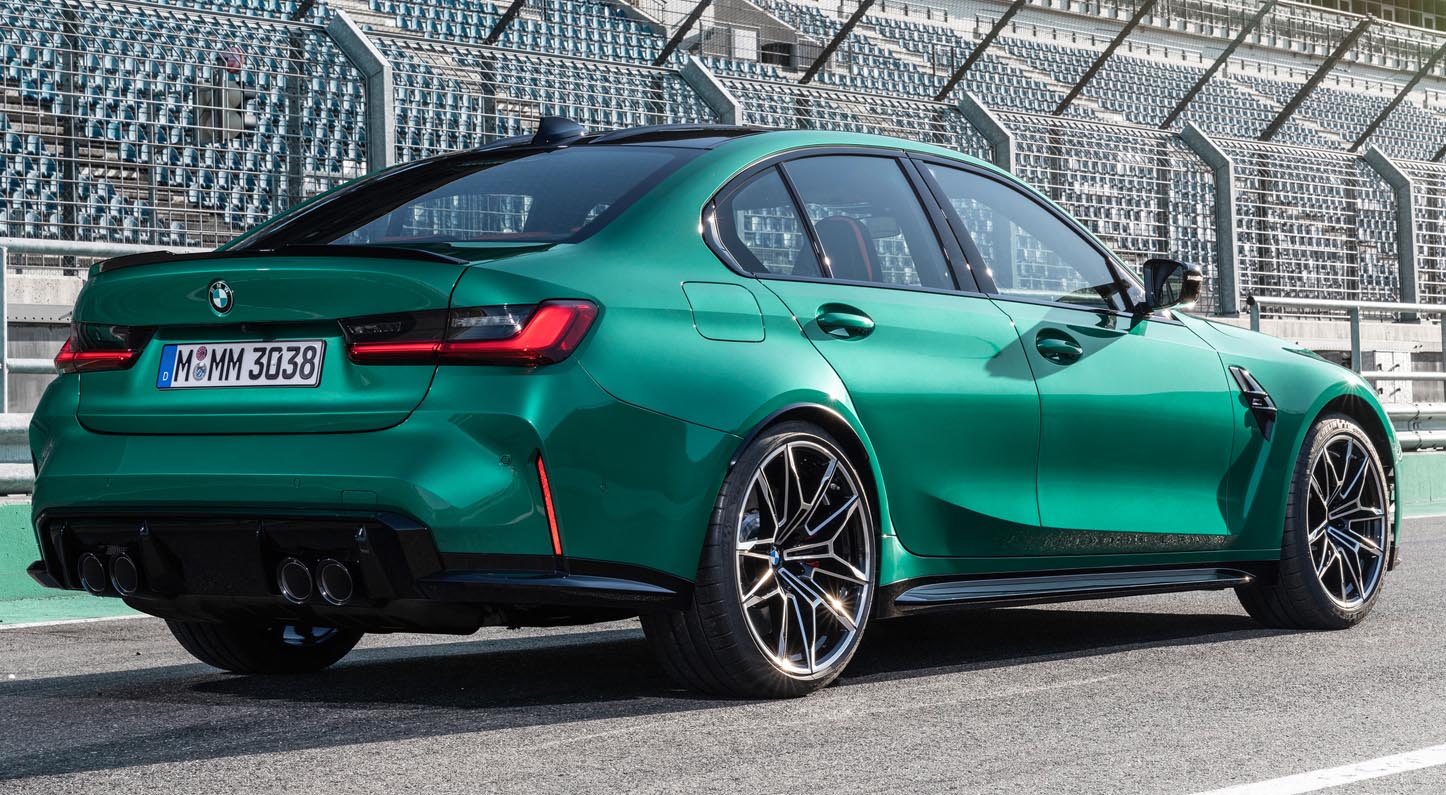
Two turbochargers, optimised air intake system, petrol direct injection designed to deliver exceptional performance
A bespoke version of M TwinPower Turbo technology helps give the engine its ultra-sporty performance profile. It includes two mono-scroll turbochargers, which supply compressed air to cylinders 1 – 3 and 4 – 6 respectively. An indirect intercooler supplied by a low-temperature circuit and special compressors optimise the power output of the chargers. Its electronically controlled wastegate (which can be closed quickly) helps to give the turbochargers instantaneous responsiveness. The wide-opening wastegate also heightens the effectiveness of the catalytic converters positioned close to the engine. A flow-optimised design reduces the pressure losses in the dual-flow air intake system.
The qualities of petrol direct injection are particularly prominent when the engine is operating under high loads, e.g. when the driver accelerates or keeps the engine at elevated revs. The latest version of High Precision Injection sends fuel into the combustion chambers at a maximum pressure of 350 bar. This enables shorter injection times and results in efficient mixture preparation. The fine atomisation of the fuel also ensures a clean combustion process and reduces the engine’s emissions. Other elements of M TwinPower Turbo technology include VALVETRONIC variable valve timing and Double-VANOS variable camshaft timing. A petrol particulate filter is employed to minimise the six-cylinder in-line engine’s emissions. All variants of the new BMW M3 Sedan and new BMW M4 Coupé meet the stipulations of the Euro 6d exhaust emissions standard.
Cooling system and oil supply designed for track use
The new BMW M3 Sedan and new BMW M4 Coupé have a bespoke cooling system adapted precisely to the high output, construction profile and technological details of their engines. It ensures optimal operating temperatures are maintained at all times for all powertrain components both in everyday driving over short distances and through town, and when pushing to the limits of performance on the track.
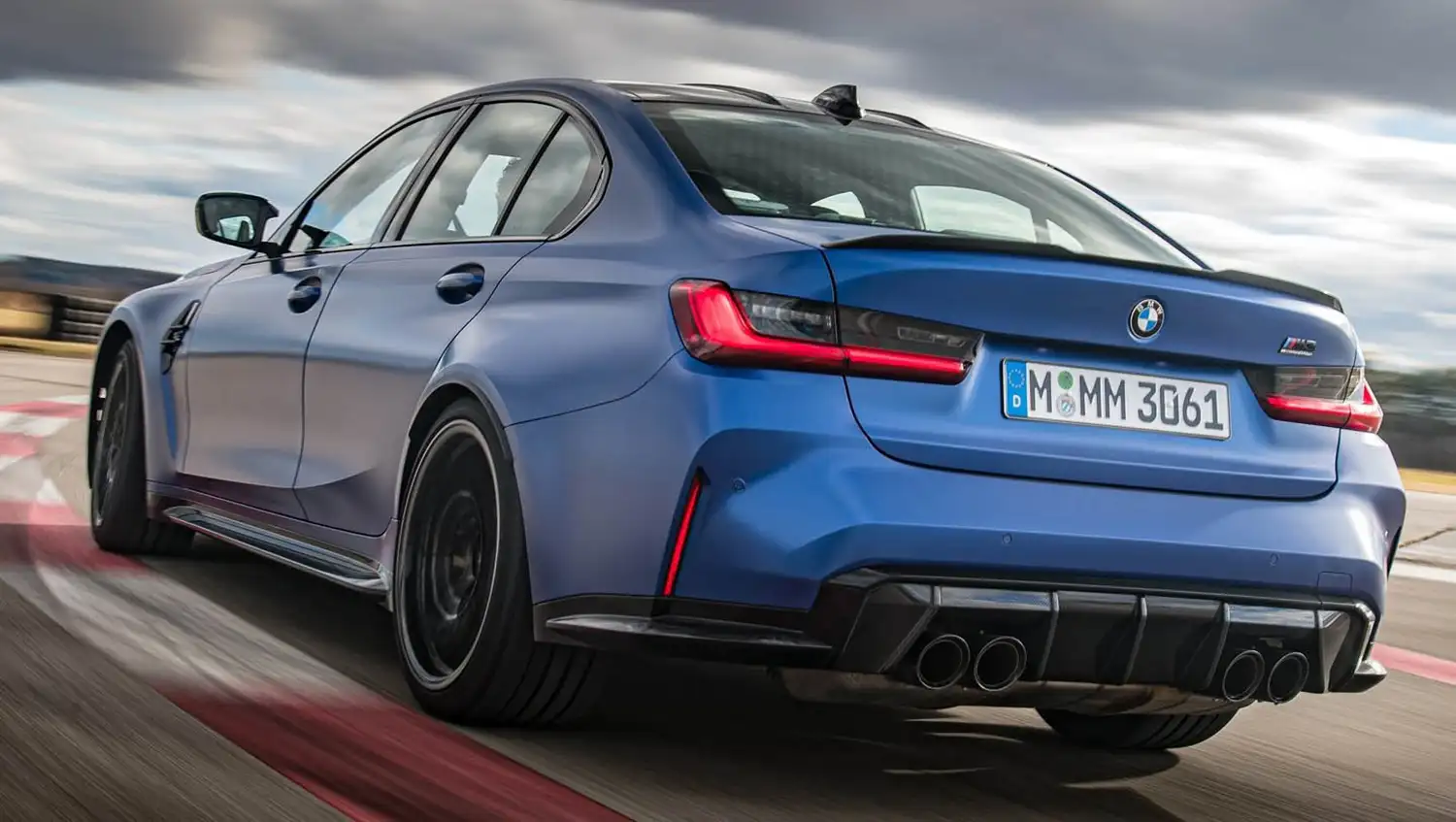
Extremely large air intakes in the front end ensure the inflow of cool air is maintained as required at all times. In the central area behind the BMW kidney grille, the air first encounters the low-temperature radiator and then the high-temperature radiator. In the lower area, the airflow is also channelled through the horizontally arranged engine oil cooler and – in the Competition models – through a separate transmission oil cooler. At low speeds and when there is a greater need for cooling, an electrically powered fan lends a helping hand.
An electric coolant pump in the low-temperature system helps to optimise volume flow for the intercooler. The high-temperature circuit comprises a mechanical water pump, a main radiator and two remote ones to the sides in the wheel arches. Together, these elements supply coolant to the engine block and the two turbochargers. An additional electric water pump allows turbocharger cooling to continue for a certain length of time once the engine has been switched off.
The motor-sport expertise amassed by BMW M GmbH has also made its presence felt in the conception of the oil supply system, which is designed to meet the challenges of dynamic track driving. The engine’s weight-minimised oil sump has two separate chambers and an integrated suction channel. An additional suction stage allows the map-controlled oil pump to draw lubricant from the smaller chamber, which steps in when extra capacity is needed. This ensures a reliable supply of oil at all times, even under extreme lateral and longitudinal acceleration.
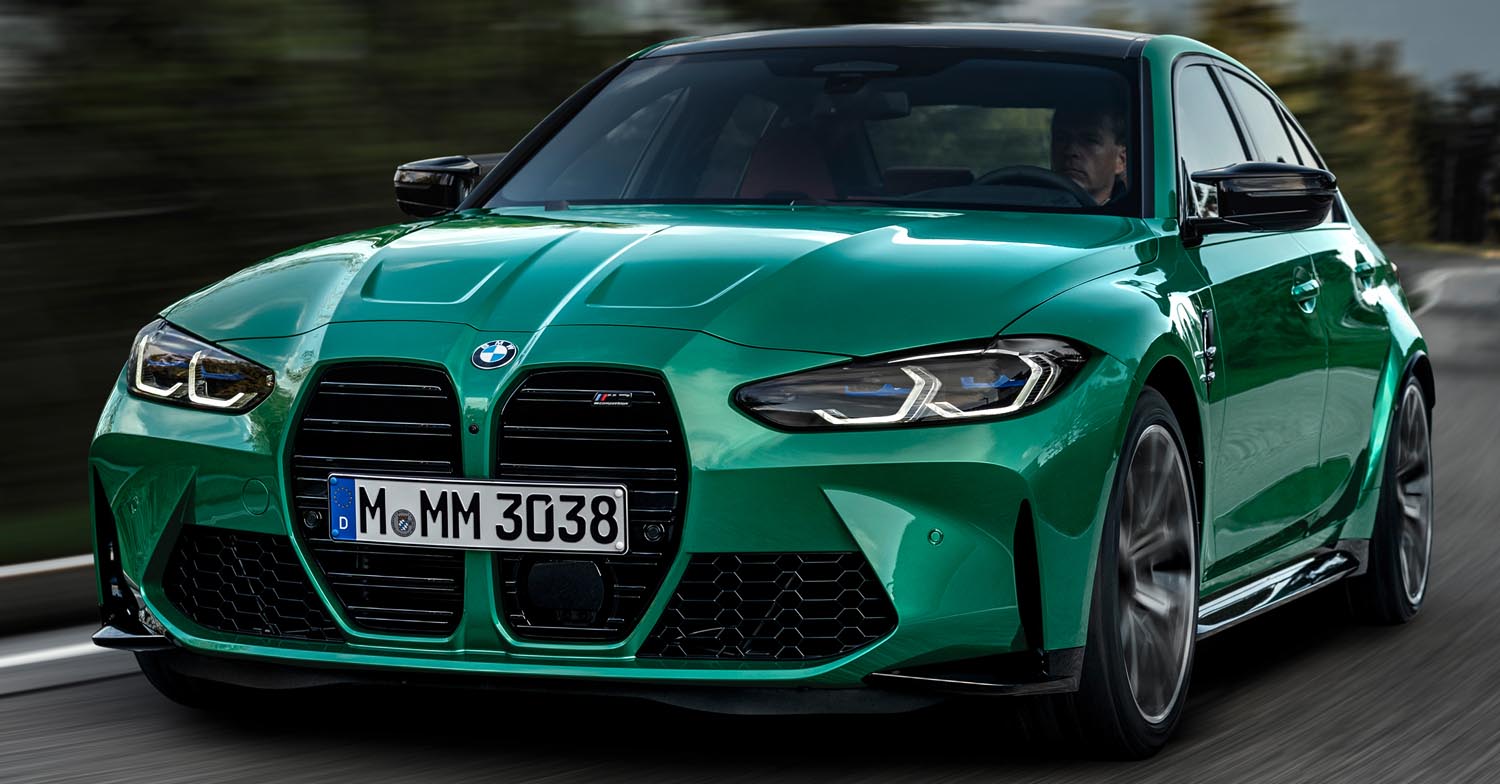
Model-specific exhaust system with electrically controlled flaps delivers an emotionally rich soundtrack
The high-performance character of the six-cylinder in-line engine is enhanced by a model-specific exhaust system. With optimal pipe routing and large cross sections, the dual-branch exhaust system reduces back pressure and generates considerable aural drama. It leads into a high-capacity rear silencer, out of which the exhaust gases exit – in customary BMW M style – through a quartet of tailpipes. The pairs of twin pipes jutting out from the rear apron are finished in Chrome on the new BMW M3 Sedan and new BMW M4 Coupé – or Black Chrome on the Competition models.
The exhaust system’s soundtrack provides an emotionally stirring endorsement of the engine’s high-revving character and linear power delivery, and establishes a clear line of communication from engine to driver. Electrically controlled, fully adjustable flaps suppress intrusive frequency ranges, increasing comfort levels. The acoustic experience inside the cabin is also influenced by the engine mode selected. Choosing SPORT or SPORT+ mode by pushing the relevant button on the centre console aligns the timbre and intensity of the exhaust note precisely to the powertrain’s heightened dynamics. Whichever mode is engaged, the driver can dial down the engine’s aural impact using the M Sound Control button on the centre console.
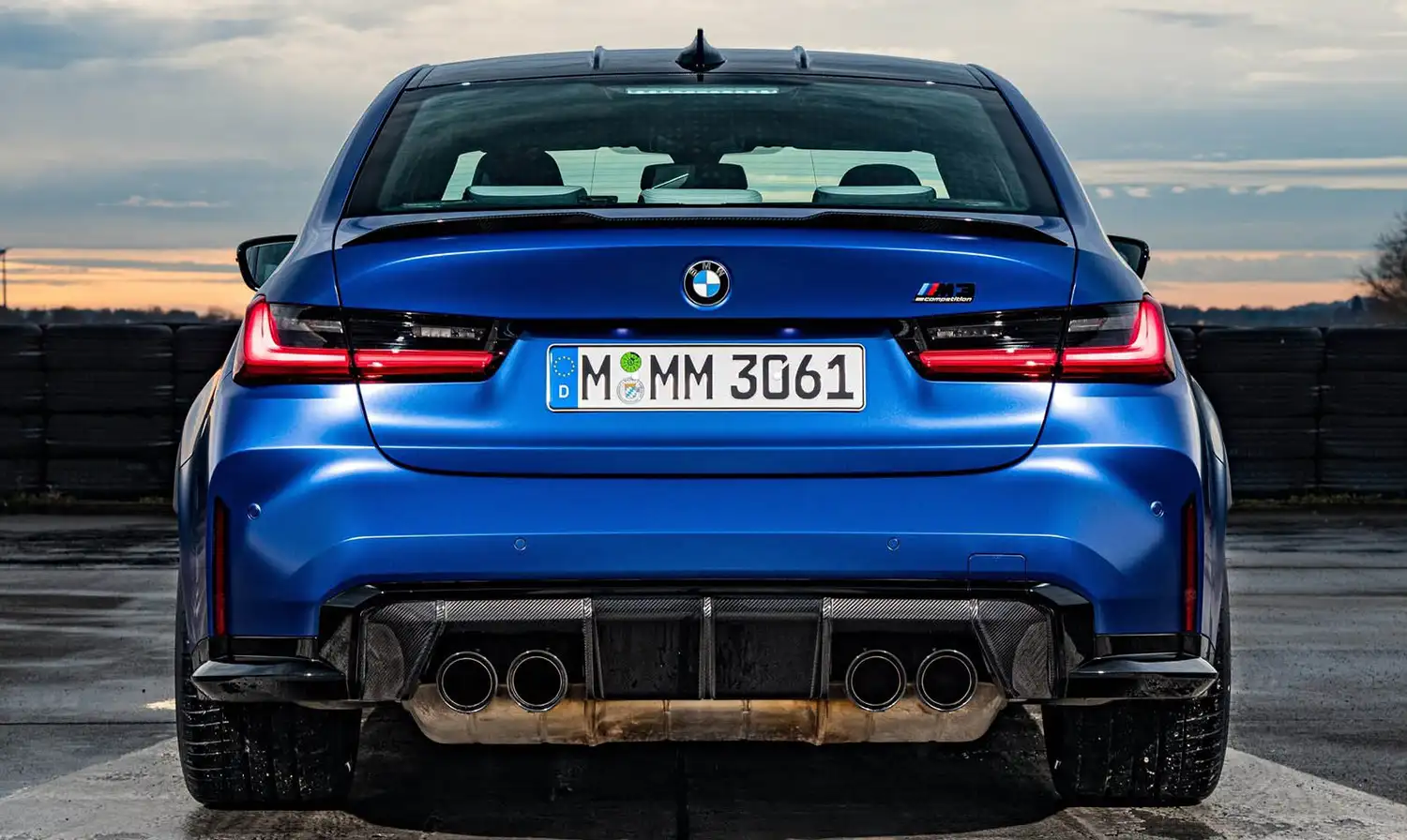
Unique in its segment: a six-speed manual gearbox
The engine/transmission combination in the BMW M3 Sedan and BMW M4 Coupé delivers a classical performance experience. The provision of a six-speed manual gearbox puts clear water between the new high-performance models and their segment rivals. A manual gearbox traditionally creates extremely intense interaction between driver and car. The short and precisely defined shift action of this particular unit maximises ease of use and assists selection of the ideal gear for the driving situation at hand. The Gear Shift Assistant enhances comfort and directional stability when the driver is pushing the dynamic limits. It uses engagement speed control to ensure slip-free operation when downshifting under braking into corners. The Gear Shift Assistant can be deactivated in the iDrive menu.
The gear ratios and gear spread of the six-speed manual gearbox are perfectly matched to the performance characteristics of the engine. This enables intense bursts of speed to be executed with optimal engagement speed and dynamic authority. Another modification over the manual gearbox in the predecessor models is a revised design for the clutch bell housing, whose weight-minimised construction equips it for the demands posed by the new, richly powerful engine. Low overall weight is also a feature of the manual gearbox. Taking into account all the various components, the weight saving over the eight-speed M Steptronic transmission for the Competition models is around 25 kilograms.
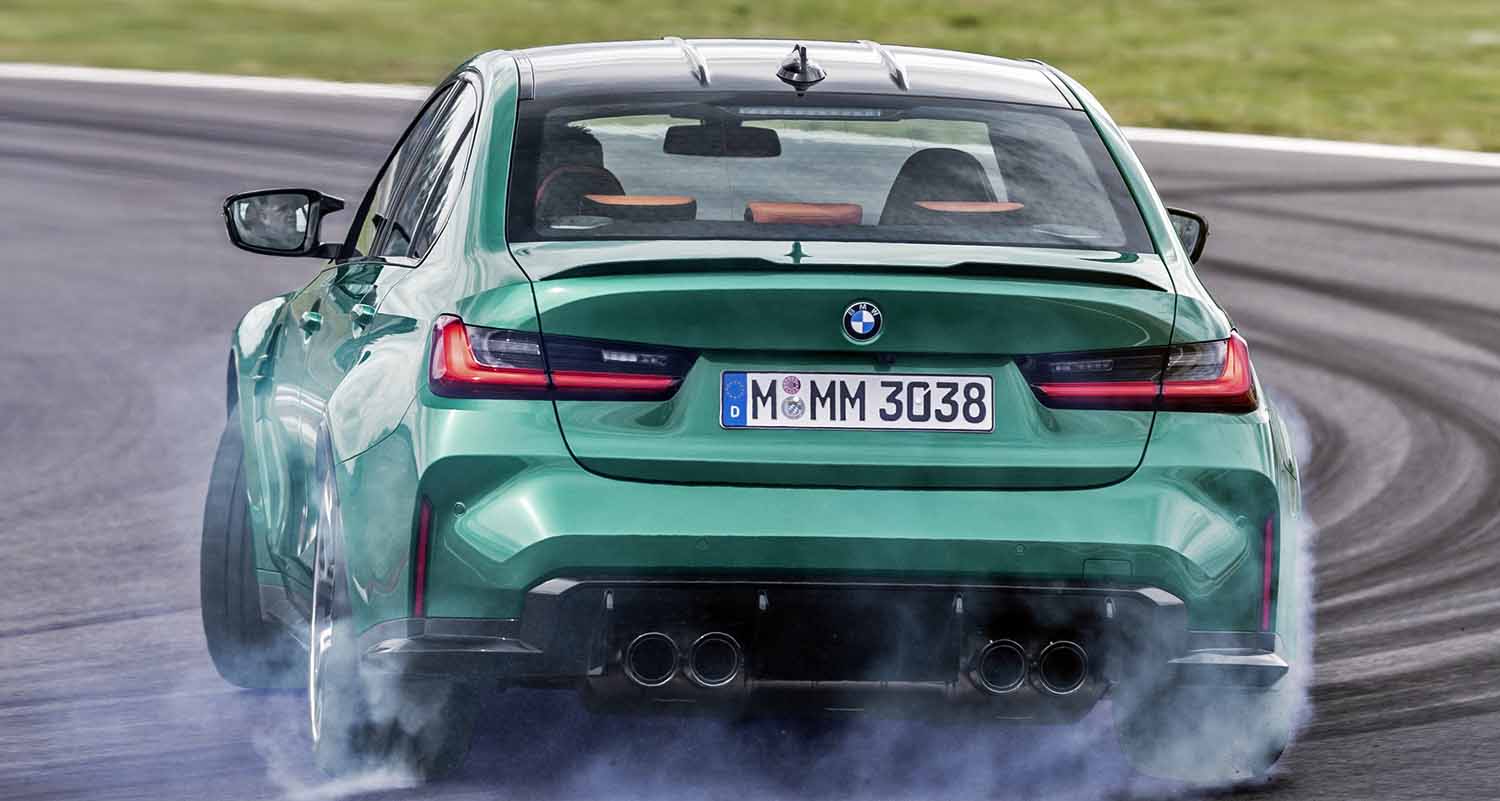
Competition models feature eight-speed M Steptronic transmission with Drivelogic as standard
The extra-potent version of the six-cylinder in-line engine fitted in the Competition models directs its power through an eight-speed M Steptronic transmission with Drivelogic as standard. Specially developed for the new BMW M3 Competition Sedan and new BMW M4 Competition Coupé, this automatic transmission is distinguished by ratio spacing perfectly attuned to the engine’s characteristics and extremely sporty gear shifts. The broadly spread gears assist efficiency at low engine speeds while enabling an intense build-up of power from low speeds. Further developed converter technology reduces rotational irregularities and enables a particularly direct connection to the engine. The transmission’s torque converter lock-up clutch is fully engaged the moment the car has pulled away.
The M Steptronic transmission enables both fully automatic gear changes and manual shifts with sequential gear selection. Fitted as standard along with the newly designed selector lever are gearshift paddles on the steering wheel. The driver can switch spontaneously and temporarily from automatic to manual mode by tapping one of the paddles. Manual mode allows the driver to accelerate hard from a steady speed by executing multiple downshifts to the lowest driveable gear. To do this, the driver pulls on the left-hand shift paddle at the same time as pushing the gas pedal. When accelerating in manual mode, the transmission does not initiate automatic upshifts when the engine revs hit the limiter. In automatic mode, automatic engine speed adjustment on downshifts assists the driver when braking into corners with sporting intent. This throttle-blipping mechanism reduces undesirable engine drag torque when the driver is pushing on.
The transmission’s shift characteristics are adjusted using the Drivelogic button integrated into the selector lever. The driver can access three clearly distinct setups in both automatic and manual mode – comfort oriented, sports focused or track optimised.
Premiere in the BMW M3 Sedan and BMW M4 Coupé: M xDrive all-wheel-drive system optimises traction and performance
For the first time in the history of the BMW M3 and BMW M4, customers will be able to specify an all-wheel-drive system – est. from summer 2021 – as an alternative to traditional rear-wheel drive. Sending power to all four wheels enables the engine’s extraordinary power to be transformed into dynamic potency to full effect even more of the time. The M xDrive all-wheel-drive system has been modified specially for the new models and splits power as required between the front and rear wheels with renewed speed and precision. The driving experience that results is characterised by smile-inducing agility and impressively assured handling even when exploring the car’s dynamic limits. The traction gains unlocked by the variable power split significantly enhance the car’s sprinting ability. And the system’s signature M rear-wheel bias elevates directional stability and dynamics through keenly taken corners to a whole new level.
The M xDrive system teams up with the likewise bespoke prop shafts and output shafts charged with transferring power to the wheels, as well as the Active M Differential at the rear axle. The engine’s power is distributed between the front and rear wheels with creamy smoothness and fully variably by means of the transfer case’s electronically controlled multi-plate clutch, before the Active M Differential splits it again between the two rear wheels, as the situation demands. This ensures noticeably enhanced traction, agility and directional stability, especially when the car is being driven in a very sporty manner or on roads with differing levels of grip. Both M xDrive and the Active M Differential are hooked up to the DSC (Dynamic Stability Control) system, ensuring they work together extremely effectively and exactly as the situation demands. The transfer case also features integrated wheel slip control for super-fast reactions to changing driving situations. This allows it to cancel out smaller differences in rotational speed between the front and rear axle exceptionally quickly and directly without involving the central control unit.
In normal driving situations the system channels power to the rear wheels only. Only when these approach the limits of their ability to transfer power to the road are the front wheels brought into play. The all-wheel-drive system uses this bespoke setup to help deliver the type of classical driving pleasure for which BMW M models are renowned. Added to which, the driver can configure the distribution of power as required via the Setup menu. In the default 4WD setting, rear-biased power transmission goes hand-in-hand with unshakable traction and precisely controllable handling. Increasing agility levels still further is 4WD Sport mode, which directs a greater proportion of the engine’s torque to the rear wheels. Here, the linear build-up of lateral forces characteristic of M models even makes it possible to execute controlled drifts while staying effortlessly in control of the car. 4WD Sport mode has been set up precisely according to the grip attributes of the optionally available performance tyres, with the aim of maximising dynamics on the track. And switching off DSC brings 2WD mode into the equation. This setting allows experienced drivers to enjoy the uncorrupted driving experience of pure rear-wheel drive, with no stabilising interventions from the control systems.
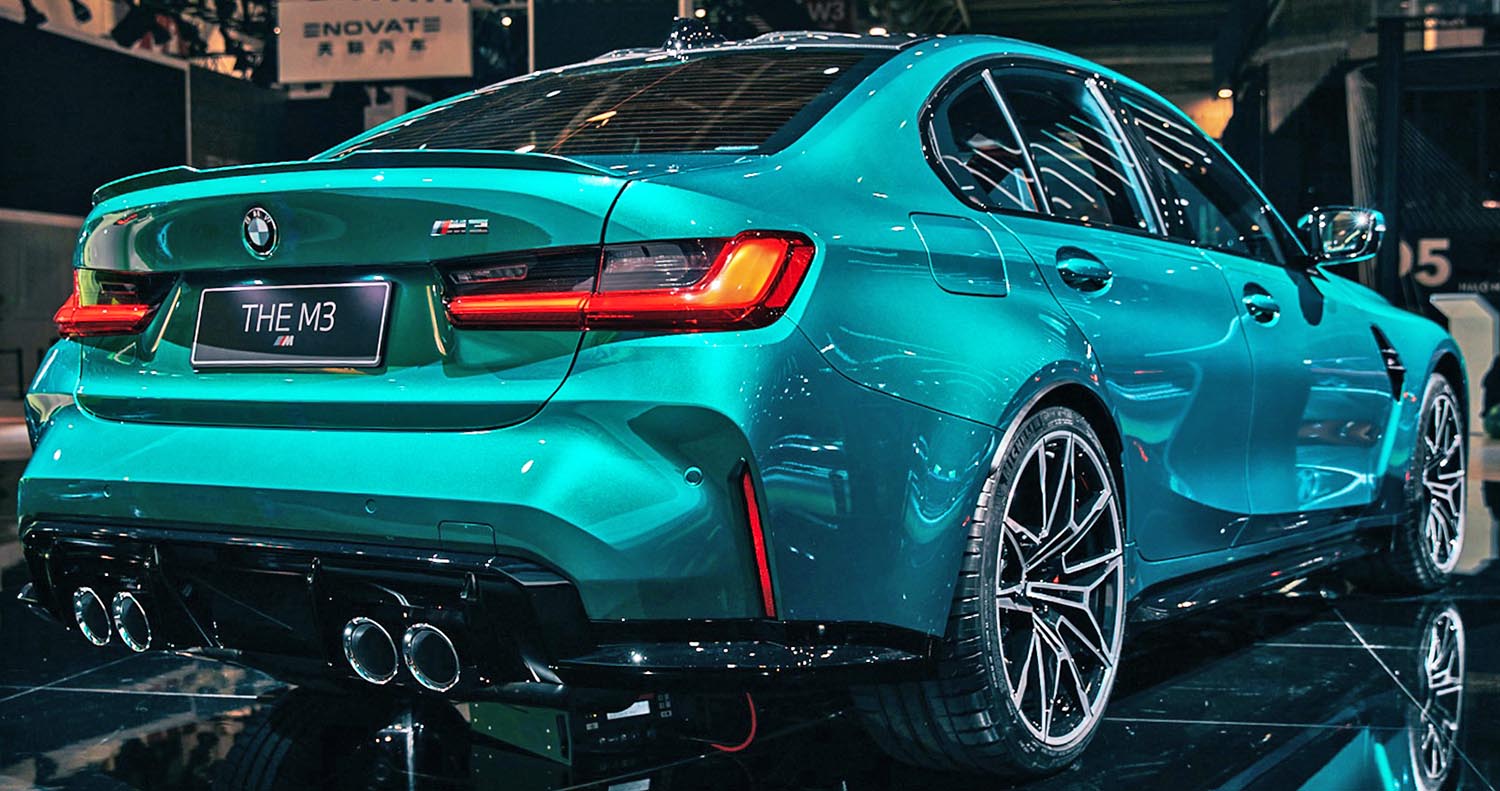
Chassis
The significant improvements made to the performance attributes of the new BMW M3 Sedan and new BMW M4 Coupé over their respective predecessors are the result of an overall package fuelled by the motor-sport expertise of BMW M GmbH. As well as upgrades to the engine and the other elements of the powertrain, this package includes advances in body rigidity and aerodynamic efficiency, plus chassis technology with model-specific configuration and tuning. The vehicle concepts underpinning the Sedan and Coupé provided the ideal canvas on which to work. A long wheelbase and wide tracks, a low centre of gravity and virtually 50 : 50 weight distribution created the perfect ingredients out of which the emphatically dynamics-focused character profile of the two high-performance sports cars has emerged.
Model-specific modifications to the body and chassis mountings have increased torsional stiffness. The kinematics and elastokinematics of the chassis components are designed to provide the blend of dynamism, agility and handling precision for which BMW M models are renowned. Intensive tuning work at the BMW Group’s Miramas testing facility in the south of France and the winter testing centre in Arjeplog, Sweden, plus the Nürburgring’s Nordschleife circuit and other race tracks, has helped create the ideal combination of razor-sharp dynamic performance and well balanced everyday usability. To this end, we channelled key learnings from our racing car programme directly into the development process. The tuning work for the new high-performance road models was conducted in part alongside testing of the new BMW M4 GT3 – the race car based on the new BMW M4 Coupé that will take its place on the grid for endurance and sprint races from the 2022 season.
Adaptive M suspension with electronically controlled shock absorbers is fitted as standard on the new BMW M3 Sedan and new BMW M4 Coupé. The high-performance sports cars now feature an M-specific version of the integrated braking system, which presents the driver with two different brake response and pedal feel settings. The new M Traction Control also plays a role in the individualisation of the sporty driving experience, allowing the new integrated wheel slip limitation function of the DSC (Dynamic Stability Control) system to be adjusted (through ten stages) to the driver’s personal preferences and needs.
Extremely stiff body structure, M-specific bracing elements
An extensive package of precisely interlinked bracing elements focused on enhancing driving dynamics increases the longitudinal and torsional stiffness of the body structure. At the front of the car, this brings specific strengthening links connecting the individual spring strut towers both with one another and with the nose of the car and bulkhead. Vertical bracings bond the stiffening elements of the engine compartment to the front axle subframe, whose supporting base is elevated by a specific connection point in the lower section of the A-pillar. In addition, the front axle subframe – in M-specific aluminium specification – is given extra rigidity by a single-piece aluminium shear panel with integrated sill braces. The centre and rear sections of the chassis incorporate model-specific underfloor bracing elements including a cross-bar, load compartment stiffening measures and a bespoke rear axle subframe with a rigid connection to the body.
The M-specific double-joint spring strut front axle includes newly developed aluminium wishbones with ball joints, a likewise aluminium torque arm with newly developed mounting, a forged swivel bearing with bespoke spring strut clamp and lightweight wheel bearings with very high camber stability. The bespoke axle kinematics, particularly large castor and kingpin angles, and a lowered roll centre enable the time-honoured M combination of top-class dynamic ability and well-resolved comfort-focused attributes for everyday driving and long journeys. Employing components designed specifically for these models, the five-link rear axle likewise rises to the exceptional dynamic demands placed on high-performance sports cars. The wheel carriers and wishbones have been newly developed in order to ensure precise handling with even the most exacting sports-minded driver at the wheel.
Added to which, much wider front tracks and greater tyre widths than the predecessor models could claim, as well as specific camber values, optimise the passage of cornering forces to the road. Overall, the M feeling generated by the new BMW M3 Sedan and new BMW M4 Coupé is headlined by extremely precise responses to every movement of the wheel, steering behaviour that remains neutral even at the limit, a linear build-up of lateral forces throughout the full range of lateral acceleration and exceptional directional stability even in dynamically intense situations.

M Servotronic steering with variable ratio
The high torsional stiffness of the front structure enables an extraordinarily quick and precise response to steering commands. On models with M xDrive, the M-specific front-axle kinematics also significantly reduce the drive forces acting on the steering. All variants of the new BMW M3 Sedan and new BMW M4 Coupé are equipped with M Servotronic steering, which combines the benefits of speed-sensitive power assistance and a variable steering ratio. This allows the M-specific version of Electric Power Steering to deliver exactly the right amount of steering torque in every situation. Accurate turn-in and finely judged communication of steering wheel movements enhance dynamic cornering, while also enabling effortless manoeuvring and parking at low speeds.
The variable ratio adjusts to changes in steering angle and helps to give the car superb straight-line poise, sharp turn-in response and excellent directional accuracy through corners. When the wheels are already sharply turned, the steering rack teeth are positioned more closely together, so smaller steering inputs are required. As a result, the car feels particularly nimble on winding roads and can also be manoeuvred into and out of parking spaces with far less steering effort. The driver can also dip into the M Setup menu to call up either of the two steering settings. COMFORT mode brings an easy steering feel with precise feedback to the fore, while in SPORT mode the messages communicated through the wheel rim and the amount of steering force required are dialled up noticeably, maximising precision in dynamic driving situations.
Adaptive M suspension with electronically controlled dampers
The electronically controlled shock absorbers of the adaptive M suspension – included as standard on all model variants of the new BMW M3 Sedan and new BMW M4 Coupé – optimise road contact and traction in every situation. The system’s control unit uses sensors to keep a constant eye on body movements, the condition of the road and steering adjustments. Electromagnetically controlled valves act in just a few milliseconds to generate the required damping force – infinitely variably and for each individual wheel. Optimal body control and mounting plus comprehensively damped wheel vibrations together deliver high comfort levels over long distances.
The basic damper characteristics can be adjusted via the M Setup menu. The driver can select from three modes, each with its own profile. COMFORT optimises everyday journeys and long trips by smoothing out road imperfections. The appreciably stiffer damper responses in SPORT have been tuned during in-depth testing at the Nürburgring Nordschleife. And SPORT PLUS optimises damper control to maximise performance on smooth race tracks. This will be the setting of choice for drivers keen to explore the outer reaches of the car’s dynamic ability and experience the extremes of lateral and longitudinal acceleration.
Integrated braking system with two pedal feel settings
Optimised retardation and exceptional usability fronted by precise controllability and two individually selectable settings for pedal feel and response are the standout features of the newly developed M Compound brakes for the latest generation of these high-performance models. In standard form, they comprise six-piston fixed-calliper brakes with 380-millimetre discs at the front and single-piston floating-calliper brakes (including parking brake) with 370-millimetre discs at the rear. The callipers are painted in Blue metallic as standard or optionally in Black or Red; all bear the M logo. The M Carbon ceramic brakes available as an option offer even stronger braking power, a still greater ability to withstand fade, further enhanced thermal stability and extremely high resistance to wear. Their callipers – painted in Gold metallic – engage with 400-millimetre discs at the front axle and 380-millimetre items at the rear.
A shared feature of both brake variants is the integrated braking system. Thanks to this cutting-edge technology, the brake actuation, braking force assistance and braking control functions are brought together within a compact module. The brake pressure required is initiated using an electric actuator. As a result, brake pressure is generated more dynamically and ensures significantly quicker and more precise inputs from the driving stability control system. The integrated braking system allows vehicle deceleration to be geared precisely to the driver’s requirements. And feedback from the brake pedal is unimpaired by wet road surfaces, significant lateral acceleration or high brake temperatures, giving the driver superb brake feel in all situations.
The M-specific version of the integrated braking system additionally presents the driver with two pedal feel settings. In their own individual ways, COMFORT and SPORT modes alter the amount of pressure on the brake pedal required to slow the car. The driver can therefore choose between more comfort-oriented and particularly direct, instantaneous response when braking. Their preferred mode is selected via the M Setup menu.
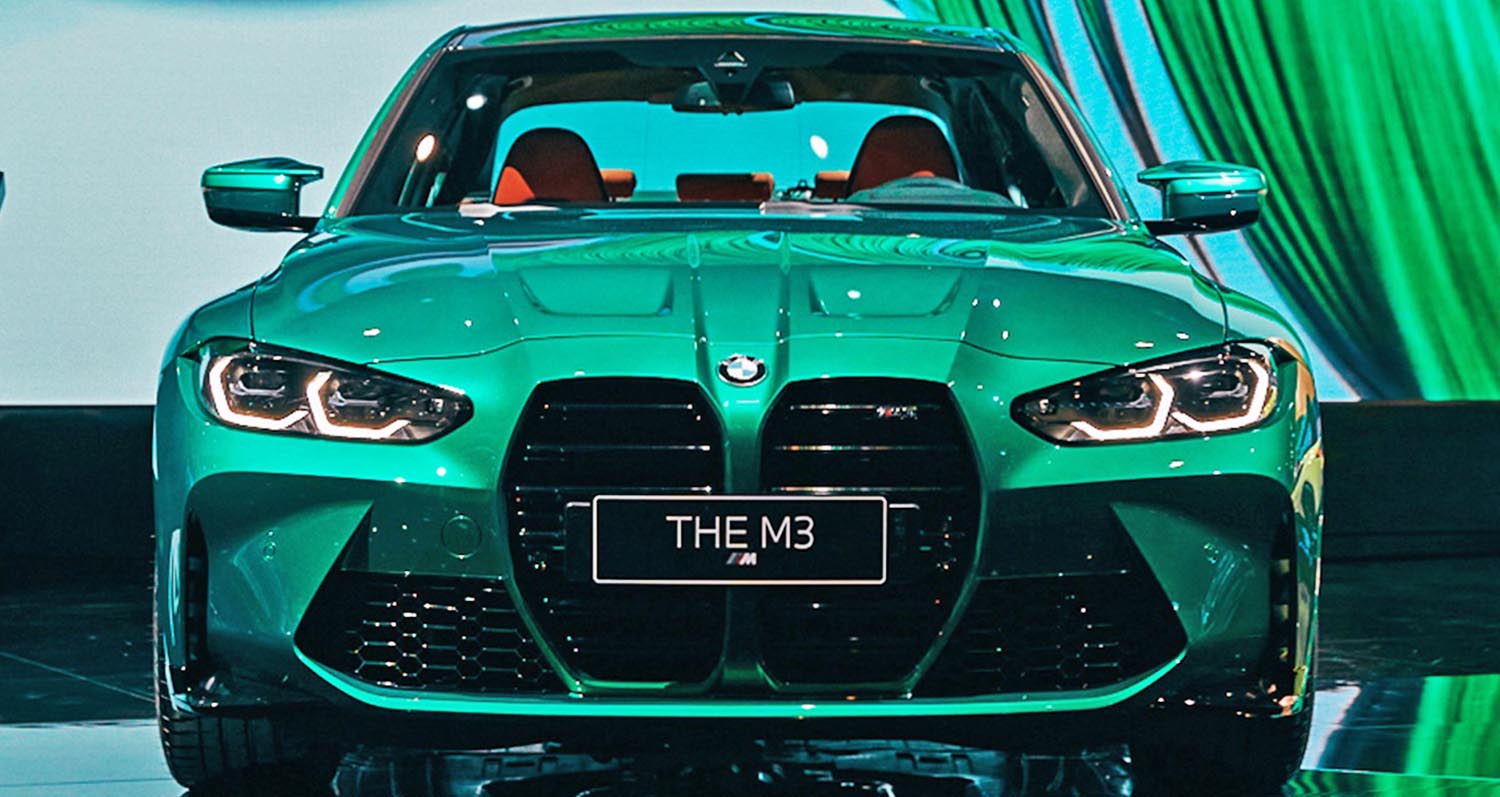
M light-alloy wheels with larger diameter at the rear axle
Standard specification for the new BMW M3 Sedan, new BMW M4 Coupé and Competition models with rear-wheel drive includes newly designed, forged M light-alloy wheels – in 18-inch format at the front axle and 19-inch at the rear. Tyres are 275/40 ZR18 items at the front and 285/35 ZR19 at the rear. The Competition models with M xDrive all-wheel-drive system get forged M light-alloy wheels (19-inch at the front, 20-inch at the rear) as standard with 275/35 ZR19 and 285/30 ZR20 tyres. Polished rim edges accentuate the size of the light-alloy wheels. Wheel/tyre combinations in these formats will be offered optionally for models with rear-wheel drive as well. And the selection also includes performance tyres designed specially for track use.
The use of particularly large wheels and tyres at the rear axle provides even greater scope for exploring the dynamic potential of the cars by transferring cornering forces to the road even more effectively. This approach has proved its worth in models including the BMW M4 GTS and BMW M4 CS. These special-edition versions of the previous-generation high-performance sports cars were equipped with an array of motor sport-inspired technological innovations.
DSC with M Dynamic Mode and ten-stage traction control
The DSC functions in the new BMW M3 Sedan and new BMW M4 Coupé work even more effectively in tandem with the integrated braking system. As the brake control function is also integrated into the system’s central module, its corrective interventions are executed with even greater dynamism and precision. Along with the Anti-lock Braking System (ABS) and Cornering Brake Control (CBC), whose M-specific set-up helps to maximise precision when driving in an extremely sporty fashion, the integrated braking system also benefits the stability control function charged with avoiding oversteer or understeer, as well as the Automatic Differential Brake (ADB-X), Brake Assist, Dry Braking and Start-Off Assistant functions. Competition models add the Automatic Hold function.
The newly designed control systems also allow even more precise stabilising adjustments to the engine’s output. The introduction of an integrated wheel slip limitation function brings about noticeably more sensitive acceleration control on wet, snow-covered or icy surfaces or on roads with inconsistent friction levels. The slip control function has been relocated from the DSC control unit to the engine management. It therefore acts on the engine’s output up to 10 times more frequently than before. This proactively avoids power-limiting inputs in response to excessively high revs and torque not transferred into forward propulsion. The car can therefore accelerate much more smoothly and authoritatively on rough ground, for example. As the DSC system is also interlinked with the Active M Differential and – in models with M xDrive – the all-wheel-drive system, its stabilising inputs in the braking system and engine output are only required in extreme situations.
The driver can also activate M Dynamic Mode in the new BMW M3 Sedan and new BMW M4 Coupé – using a button on the centre console – as an alternative to the basic setting. This mode allows a greater degree of wheel slip, enabling an exceptionally sporty driving experience complete with controlled drifts through dynamically taken corners. Also selectable at the push of a button is DSC Off mode.
If the optional M Drive Professional (standard for the new BMW M3 Competition Sedan and the new BMW M4 Competition Coupé) is specified, drivers also benefit from the new M Traction Control function. Making its debut in the new BMW M3 Sedan and new BMW M4 Coupé, this new form of traction control allows the driver to set the intervention thresholds for wheel slip limitation. The relevant menu, accessed via the iDrive operating system, displays ten stages of precisely defined slip permitted at the driven wheels. The new traction control configuration option gives the driver the ability to generate the ideal balance of racing-car performance and directional stability to suit the situation, the road surface condition and their personal preferences. This allows them to deliberately approach the physical limits on the track and, by reducing the extent of control system inputs (in stages), create the perfect setup for controlled drifts through dynamically taken corners.
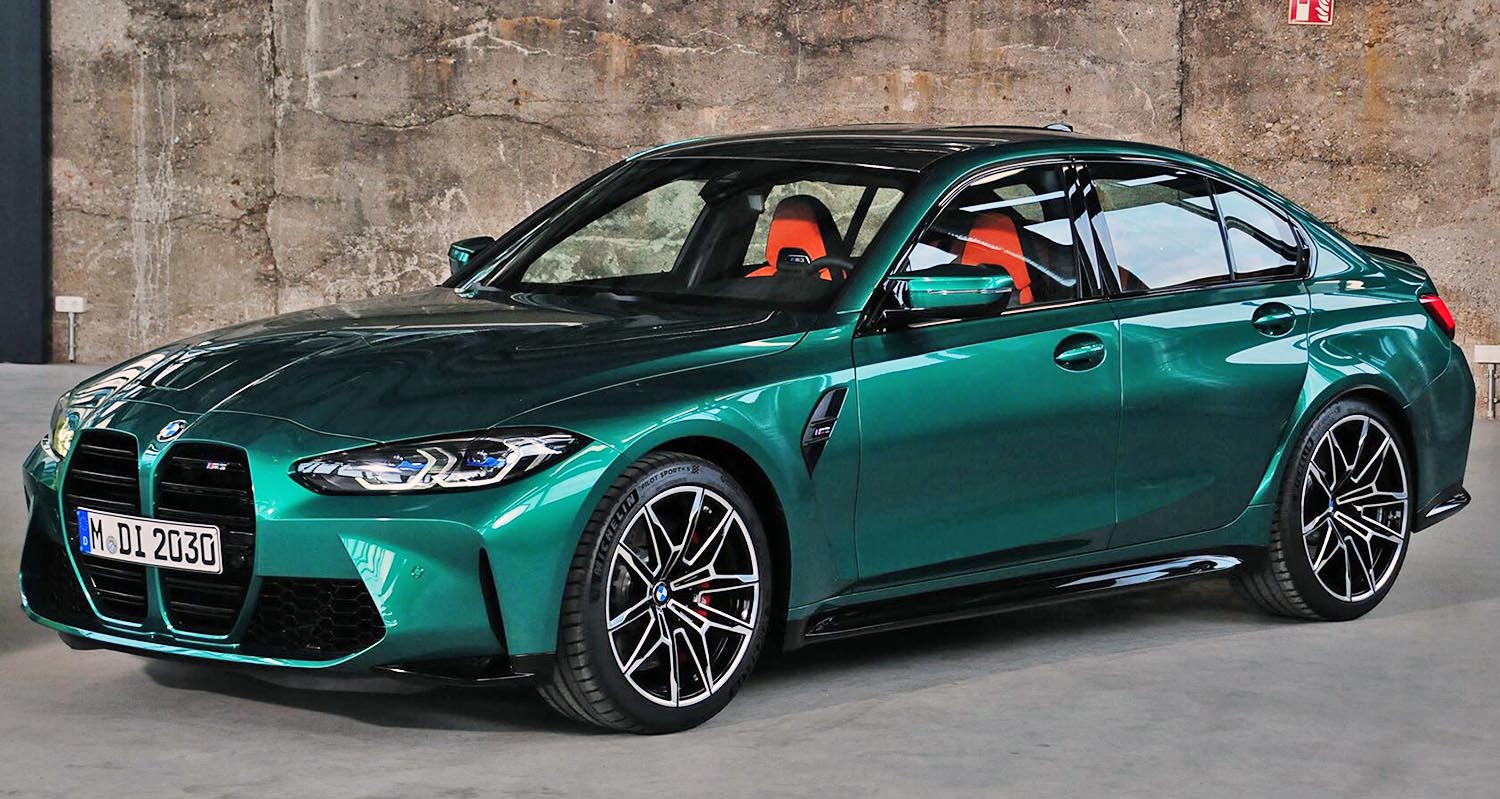
Design
The exterior styling of the new BMW M3 Sedan and new BMW M4 Coupé embodies the motor sport-inspired character at their heart with vivid authenticity. Their exterior design stands apart more clearly from the BMW 3-Series Sedan and BMW 4-Series Coupé – which provide the for the BMW M members of the premium midsize class – than in earlier model generations. And their visually expressive and emotionally engaging aesthetic sends their segment rivals a bold statement of performance supremacy.
Muscular yet clear surfacing and crisp, aerodynamically optimised lines ensure the sporting potential of the new BMW M3 Sedan and new BMW M4 Coupé is immediately apparent. M-specific design features firmly invested in the functional requirements of high-performance sports cars are integrated harmoniously into the modern design language. “The design is resoundingly function-driven, pure and reduced without compromise,” says Adrian van Hooydonk, Senior Vice President BMW Group Design. “At the same time, it provides an emotionally engaging window into the vehicle character.”
Exclusive exterior paint shades, large M light-alloy wheels and the optional M Carbon exterior package emphasise the headline-seeking athleticism of the new BMW M3 Sedan and new BMW M4 Coupé. The ergonomically optimised layout and modern premium ambience of the interior capture the imagination, with M-specific accents bringing extra racing-car credibility to the driver-focused cockpit.
The model-specific exterior dimensions of the two BMW M models give them textbook high-performance sports car proportions. Both models add 122 millimetres to the length of their predecessors (they now measure 4,794 millimetres) and 45 millimetres to their wheelbases (now 2,857 millimetres). The new BMW M3 Sedan is also 26 millimetres wider, at 1,903 millimetres, and its height is 1,433 millimetres. It is 85 millimetres longer than the new BMW 3-Series Sedan, 75 millimetres wider and 2 millimetres lower.
The new BMW M4 Coupé adds 17 millimetres to the width of its predecessor (now 1,887 millimetres) and 5 millimetres to its height (1,393 millimetres).
It is also 24 millimetres longer, 40 millimetres wider and 10 millimetres taller than the new BMW 4-Series Coupé.
Distinctive styling from the M-specific kidney grille over the extended sills to the standard-fitted carbon roof
The BMW M models cut a distinctive and immediately recognisable figure from any angle. The front-end design of the new BMW M3 Sedan displays a particularly high degree of differentiation. Like the new BMW M4 Coupé, it has a large, vertically arranged and extremely deep BMW kidney grille – a visually powerful reference to the significant cooling air requirement of the engine behind the scenes. The BMW kidney grille is frameless and all-black. On both models, the hallmark M double bars – now horizontally arranged – bear a model badge. Optimised cooling for the engine and brakes is provided by large additional intakes on either side of the kidney grille. These two-section apertures – brake air ducts on the inside, air supply for the remote coolant radiators to the outside – have honeycomb mesh covers as standard. At the outer edges of the front apron, the vertical intakes for the Air Curtains with integrated, aerodynamically effective “flics” accentuate the width of the car.
The lines of the front apron and bonnet all converge on the BMW kidney grille, as do the contours of the strikingly slim headlights. Standard equipment for the new BMW M3 Sedan and new BMW M4 Coupé comprises full-LED headlights with U-shaped fibre-optic light guides for the daytime driving lights. Adaptive LED Headlights with BMW Laserlight including BMW Selective Beam non-dazzling high beam assistant are available as an option. These can be identified by the blue inlays at the upper edge of the headlight units and also come with the cornering light and adaptive cornering functions with variable road illumination optimised for urban and motorway driving. At speeds above 60 km/h (37 mph), BMW Laserlight increases high-beam range to a maximum 550 metres and follows the course of the road dynamically. BMW Individual lights Shadowline, with darkened inlays adorning their upper edges, are also on the options list.
As in the powerfully moulded flanks of the new BMW M3 Sedan, a small number of lines give the elegant silhouette of the new BMW M4 Coupé its structure and link up with signature M details. The most striking design feature alongside the prominently flared wheel arches are the extended side sills. Together with the attachment parts for the front and rear aprons, which also jut out significantly, they form a High-gloss Black band around the whole of the car. This racing car-inspired body element also adopted on the first-generation BMW M3 increases downforce in the underbody area, complementing the array of details designed to optimise aerodynamic balance – including the front spoiler lip, aero flics for the Air Curtains and brace covers – to compelling effect. The prominent side skirts visually reinforce the impression of a light, low-to-the-road machine.
The front side panels and rear wheel arches of both models have an M-specific, voluminous design. This creates room for the wide tracks and large wheels that help to give the cars their beguiling cornering dynamics. The M gills familiar from many of their stablemates past and present are integrated neatly into the distinctive surfacing of the front side panels. And the likewise M-specific exterior mirrors have aerodynamically optimised contouring. These are painted in body colour as standard or High-gloss Black on the Competition models.
The roof of both the new BMW M3 Sedan and new BMW M4 Coupé is made from carbon-fibre-reinforced plastic (CFRP). The use of this extremely lightweight high-tech material lowers the cars’ centre of gravity, enhancing their agility. Two fins running longitudinally over the CFRP roof optimise airflow, as does the rear spoiler, which is painted in body colour – or High-gloss Black on the Competition models – and has a central notch. The rear diffuser comes in black on all model variants and frames the exhaust system’s characteristic pairs of tailpipes (each measuring 100 millimetres in diameter). The tailpipes come in Black Chrome as standard on the Competition models and can be ordered in this specification as an option on the other variants. The diffuser’s eye-catching fins extend the lines of the airflow-guiding elements on the roof, and a surround in High-gloss Black is connected to the rear apron attachment part, rounding off the powerful aura. The slim, stylishly darkened rear light clusters with L-shaped taillights extend well into the flanks, further accentuating the width of the two high-performance sports cars. All of the light functions use LEDs as standard. The contour of the vertically arranged reflectors at the outer edge of the rear apron mimics the appearance of the Air Curtains at the front end.
Exclusive exterior paint shades, optional M Carbon exterior package
Customers can order their new BMW M3 Sedan and new BMW M4 Coupé in the new and exclusive exterior paint shades Sao Paulo Yellow non-metallic, Toronto Red metallic and Isle of Man Green metallic, all of which lend additional emphasis to the expressive exterior design. Also available are Alpine White non-metallic, Sapphire Black metallic, Skyscraper Grey metallic, Brooklyn Grey metallic and Portimao Blue metallic. The selection of BMW Individual paint shades offered from launch – which also includes several Frozen variants with a shimmering matt finish – bring additional variety and particularly eye-catching flourishes. Optional BMW Individual High-gloss Shadow Line trim with extended features adds a classy dark finish for the exterior mirrors, rear spoiler and tailpipes. The Competition models, meanwhile, can be optionally specified with exterior mirrors and a rear spoiler in body colour, plus chrome tailpipes.
A model-specific M Carbon exterior package is also available as an option for the new high-performance cars. The weight-minimised components included in the package exude top-quality workmanship and provide an even more striking visual showcase for the racing-car character of the two models. The M Carbon exterior package comprises inlays for the newly designed wide front air intakes, a rear diffuser – with unique geometry for each model – and exterior mirror caps and a rear spoiler made from CFRP.
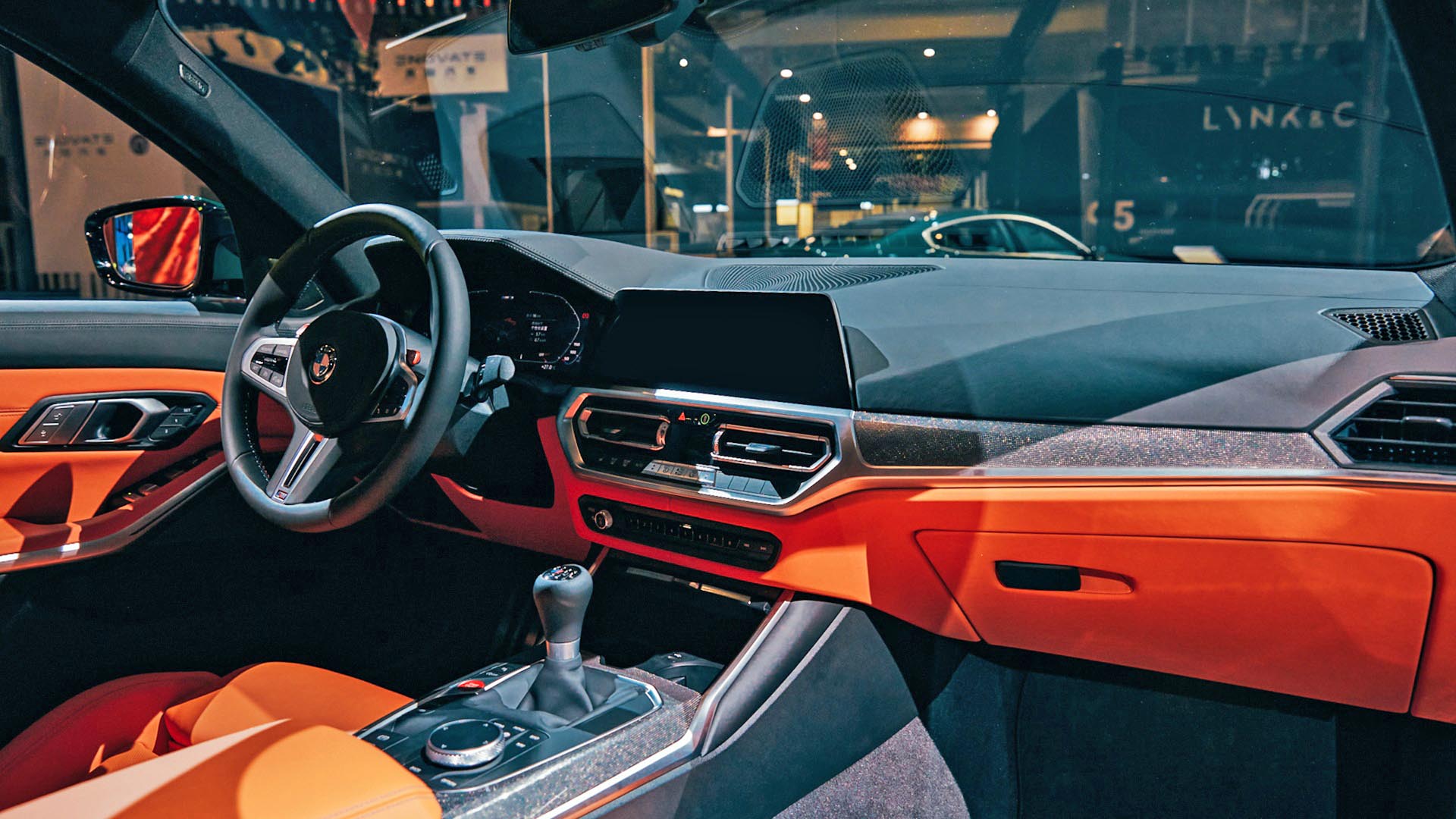
Interior: ergonomically flawless design exudes intense M feeling
The latest interior design language introduced in the new BMW 3-Series and new BMW 4-Series Coupé has been taken to its sporting extreme in the two high-performance models. Clearly structured surfaces and an ergonomically impeccable cockpit design ensure the driver’s focus remains one hundred per cent on the intense driving experience. Signature M details include red accents for the M buttons on the M leather steering wheel and the start/stop button on the centre console. The selector lever with Drivelogic switch in the Competition models is leather surfaced with an embedded M logo and stitching in M GmbH colours. It also features an eye-catching cut-out, which is further accentuated by integrated “waterfall” lighting.
The anthracite-coloured BMW Individual headliner and interior trim strips in High-gloss Black as standard further enhance the undiluted sports-car aura on board. These trim elements can also be ordered in Aluminium Tetragon. Cars specified with the optional interior trim strips in Carbon Fibre High-gloss also feature carbon trim for the inlays in the M leather steering wheels and the shift paddles of the Competition models. The carbon paddles also have a bespoke and extremely dynamic geometry. The highly exclusive BMW Individual range of options includes interior trim strips in Piano Finish Black, High-gloss Aluminium weave or Fineline Black with Silver Effect open-pore fine wood.
The new BMW M3 Sedan and new BMW M4 Coupé come as standard with newly developed M sport seats and fine-grain Merino leather trim with extended features. This leather variant, like the optional fine-grain Merino full leather trim, is available in Black with accents in Anthracite, Silverstone/Black with accents in Anthracite, Kyalami Orange/Black with accents in Black and Yas Marina Blue/Black with accents in Yellow. Alternatively, customers can also opt for BMW Individual Merino leather trim with extended features and BMW Individual full leather trim in Fjord Blue/Black, Fiona Red/Black, Tartufo or Ivory White. The M sport seats have pronounced side bolsters, integrated head restraints and an illuminated model badge. Fine M-specific perforation, which enhances the effect of the optional seat ventilation, and a contrasting colour for the centre section (depending on the variant chosen) raise the sense of sporting exclusivity another notch or two.
The two seats in the rear compartment of the new BMW M4 Coupé each have a pronounced individual character. And the outer seats in the three-person rear of the new BMW M3 Sedan also feature prominently defined contours and visually contrasting centre sections.
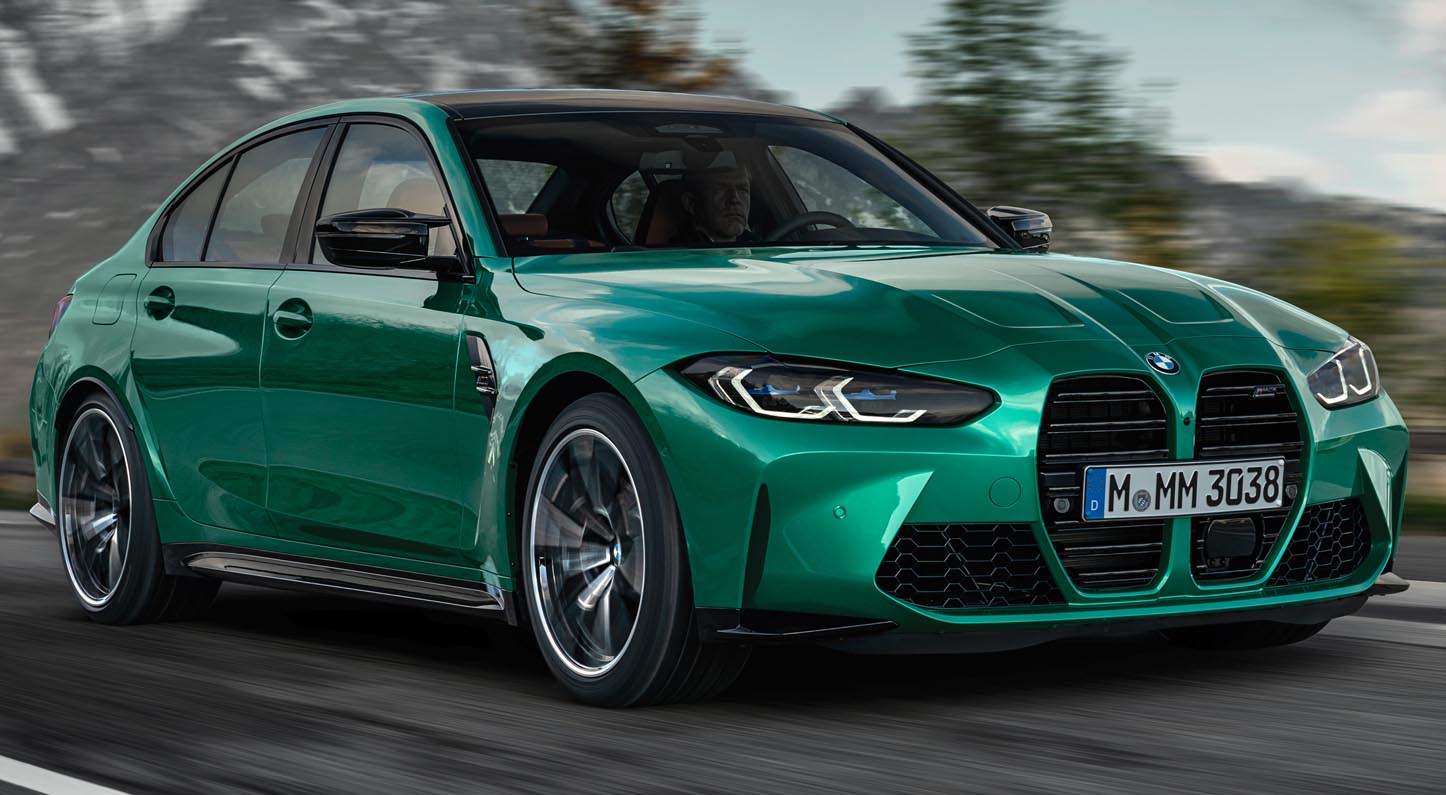
Equipment
The combination of seductive performance and unrestricted everyday usability is a central character trait that traditionally sets BMW M models apart. The vehicle concepts on which they are based meet all the requirements of a modern premium midsize car in terms of spaciousness, driving comfort and equipment, meaning owners of the new BMW M3 Sedan and new BMW M4 Coupé can enjoy the unmistakeable M feeling without compromise – whether driving through town or heading out on longer journeys. The even sharper sporting edge of the latest model generation is complemented by innovative technology in the areas of driver assistance and connectivity. An array of new additions to the standard and optional equipment lists ensure that not only racing flair reaches a new level, but also comfort and functionality. The BMW Live Cockpit Professional with a fully digital display grouping, the cloud-based navigation system BMW Maps and the BMW Intelligent Personal Assistant are also part of standard equipment for the new BMW M3 Sedan and new BMW M4 Coupé.
From the joy of driving a car so capable over long distances yet so dynamically adept in everyday use, to the thrill of a sporting machine let off the leash on closed roads – the spectrum of emotions released by the new BMW M models is broader than ever before. The M sport seats, M leather steering wheel with multifunction buttons, M-specific displays in the instrument cluster and ergonomically optimised arrangement of all controls create the ideal environment in which to experience driving pleasure at the sharp end of the sporting scale, complete with precise control over the car’s responses at all times. Added to which, the latest generation of the M-specific control/operation system enables fresh scope for adjusting the setup of the high-performance sports car in detail to personal preferences and the driving situation at hand. Plus, the new M Drive Professional option (standard for the new BMW M3 Competition Sedan and the new BMW M4 Competition Coupé) specialises in delivering razor-sharp dynamics on the track. Its innovative functions ensure a particularly intense performance experience.
Settle in for some race feeling: M Carbon bucket seats
The standard M sport seats offer a wide range of electric adjustment and drivers can store their ideal position at the steering wheel using the memory function. Heated seats for the driver and front passenger are also part of standard specification, while seat ventilation can be ordered for the BMW M3 Sedan and BMW M4 Coupé as an option for the first time. Also available are M seat belts with a woven stripe pattern in BMW M GmbH colours.
A standout highlight of the options list are the M Carbon bucket seats for the driver and front passenger. Making their debut here and sporting a new type of structure-based design, they combine racing functionality with lightweight design, comfort over long distances and sumptuous workmanship. The newly developed seats have integral head restraints and an illuminated model badge. The use of CFRP in the structural elements of the seat surface and backrest, and cut-outs in the side bolsters and below the head restraints save 9.6 kilograms over the standard M sport seats. In track outings, when the driver and front passenger (if applicable) are wearing a helmet, the head restraints of the M Carbon bucket seats can be dismantled. Added to which, their racing-car-inspired structure also enables the use of optional multi-point seat belts. The clearly defined bucket-seat character optimises support through dynamically taken corners, as do the Alcantara surfaces of the side bolsters adjoining the seat cushion and backrest. Electric adjustment for the seat height and angle, the seat’s fore/aft position, the backrest width and backrest angle is also included. The driver’s seat has a memory function. The seat position can be set even lower than the standard M sport seats. Added to which, seat heating and the Easy Entry function for the rear passengers in the new BMW M4 Coupé enhance comfort further still.
M Drive Professional: unbeatable performance on the race track
The control/operation system of the new BMW M3 Sedan and new BMW M4 Coupé contains a host of new features which contribute to the richly engaging driving experience. Making its debut appearance is M Drive Professional, which has been developed specifically for track driving. This new option (standard for the new BMW M3 Competition Sedan and the new BMW M4 Competition Coupé) helps the driver to make consistent progress in their pursuit of the ideal line and the perfect lap. For example, the driver’s ability to pilot the car through corners with maximum dynamic drama by deploying judicious amounts of oversteer and opposite lock is recorded by the M Drift Analyser activated via the iDrive menu. This function notes down the duration (in time), line and angle of the driver’s latest drift. The rating shown on the Control Display is made up of a mark between one and five stars and a comparison with the driver’s best demonstration yet of steering on the throttle. A graphics-enhanced overall view also displays the number of drifts recorded, the distance covered while sideways and other yardsticks of sporting performance.
Other functions of M Drive Professional include the M Laptimer, which is also accessed via the iDrive menu. Here, the far-reaching race performance analysis extends well beyond recording lap times and sends a variety of current information to both the instrument cluster and the BMW Head-Up Display during the drive. As well as checking their time so far for the lap in progress, the driver can also keep a constant eye on how much quicker or slower they are than their fastest lap of the circuit at hand. The Control Display shows the number of laps completed so far, the distance covered and the duration of the driver’s current stint. The driver can also analyse the data recorded during their track outing in detail using the BMW M Laptimer app on their Apple iPhone – and share selected information with the online community. Among the resources available are a bird’s-eye map view of the track in question, a lap time comparison, data from the car’s sensors on factors such as speed, engine revs and accelerator position, and graphics showing the lateral and longitudinal acceleration values attained.
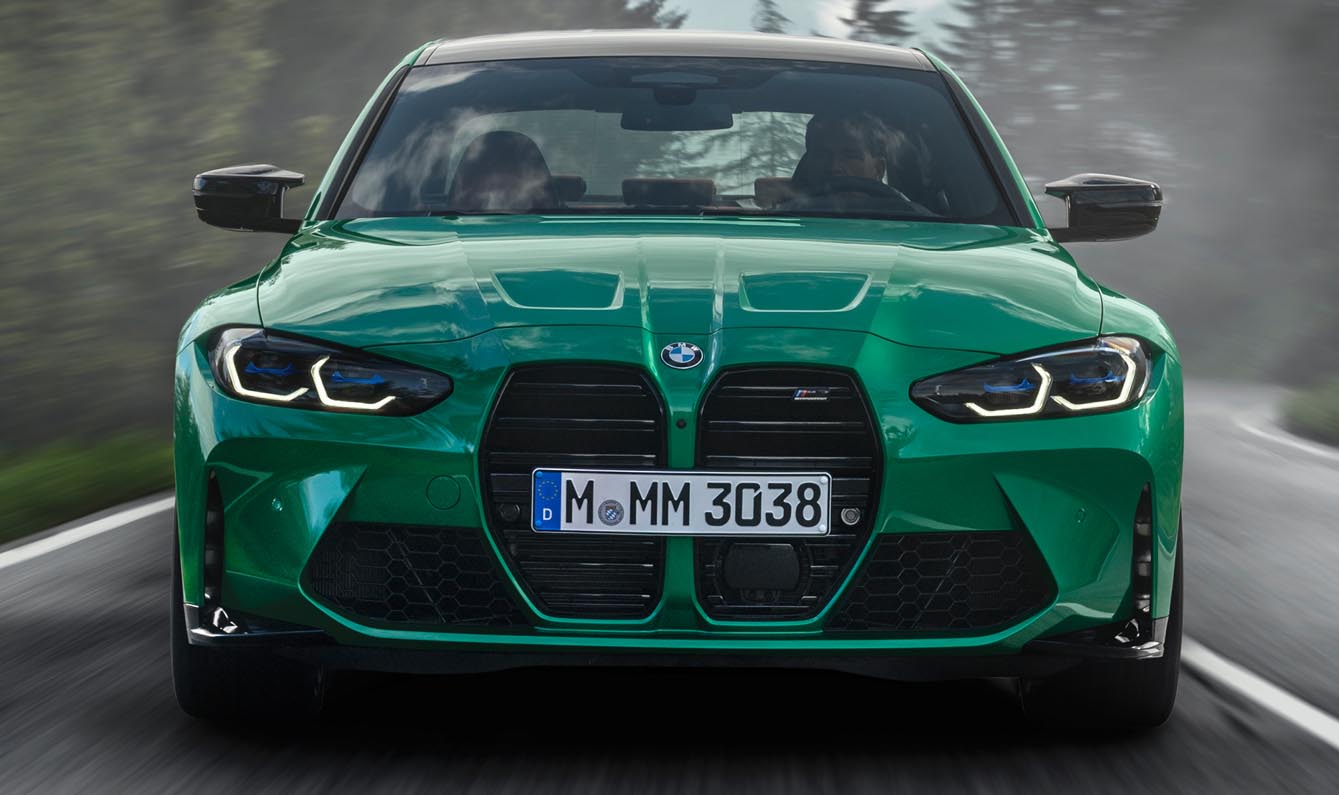
Even greater scope for individual configuration of the powertrain and chassis – with direct access via the Setup button
M-specific controls used to configure the powertrain and chassis technology to personal tastes and requirements have traditionally played a part in further enhancing the close relationship between a driver and their BMW M car. In the new BMW M3 Sedan and new BMW M4 Coupé there are now even more ways to adjust the car’s setup precisely to the situation at hand and the driver’s personal preferences. As in the predecessor models, the driver can activate various settings for the engine, chassis and steering independently of one another. In addition, the braking system can now also be configured as required. If the driver has specified the optional M Drive Professional (standard for the new BMW M3 Competition Sedan and the new BMW M4 Competition Coupé), they will enjoy the services of the new M Traction Control function. And the Gear Shift Assistant on models with a manual gearbox can be activated or deactivated as desired. In the all-wheel-drive Competition models, the driver can also adjust how power is distributed between the front and rear wheels.
The new Setup button on the centre console provides direct access to the settings options for the seven powertrain and chassis parameters. Pressing this button calls up the Setup menu in the Control Display, which lists the vehicle settings currently engaged. The driver can now use touch control or the iDrive Controller to activate the desired mode for the engine response, damper settings, steering characteristics and brakes, as well as – depending on the model variant and the car’s specification – the Gear Shift Assistant, M xDrive and traction control in just a single step.
EFFICIENT, SPORT and SPORT PLUS settings can be engaged to modify the engine’s characteristics, while selecting the COMFORT, SPORT or SPORT PLUS chassis mode provides access to the three settings for the electronically controlled dampers. The driver can choose between COMFORT and SPORT modes for the M-specific Electric Power Steering and the new braking system. The Gear Shift Assistant can be deactivated via the Setup menu and M Traction Control offers ten-stage adjustment of wheel slip control. In the all-wheel-drive Competition models, the driver can also choose from the 4WD, 4WD SPORT and 2WD settings for the M xDrive system, the latter delivering pure rear-wheel drive.
Two individually configured M Setup variants can be stored permanently, together with the preferred settings for the engine note, the driving stability control system, the Auto Start Stop function and – in Competition models – the shift characteristics of the eight-speed M Steptronic transmission. The overall vehicle configuration can then be called up at any time by pressing one of the two M buttons on the steering wheel.
Pure driving pleasure at your fingertips: the M Mode button
The control panel on the centre console of the new BMW M3 Sedan and new BMW M4 Coupé also houses the M Mode button as standard. This can be used to adjust the responses and characteristics of the driver assistance systems and the displays in the instrument cluster and Head-Up Display to deliver a driving experience suited to the situation at hand and worthy of the M badge. The driver can choose from ROAD and SPORT settings, with TRACK mode added to the armoury when M Drive Professional is specified.
In the basic ROAD setting, all the standard and optional driver assistance systems are fully activated. Pressing the M Mode button engages the SPORT setting, in which the driver assistance systems activated through the driver’s chosen configuration limit themselves to warnings of speed limits and overtaking restrictions, for example. All interventions in the braking and steering systems are suspended in this mode, with the exception of inputs from the Collision Warning with braking function and the Evasion Assistant.
In SPORT mode the instrument cluster and Head-Up Display switch to M View, which only presents information relevant to sporty driving. The information shown in the cockpit in this mode includes an M-specific rev dial and Shift Lights, plus a digital speed read-out and indication of the gear selected. A range of data including coolant temperature, charge pressure, tyre condition and lateral and longitudinal acceleration can be displayed in the right- and left-hand areas of the instrument cluster.
Alongside the engine’s revs, Shift Lights, the vehicle speed and the gear currently engaged, in this mode the Head-Up Display shows only navigation instructions, distance warnings and any speed and overtaking restrictions detected by the Speed Limit Information system. Pressing the M Mode button again or activating an assistance system returns the driver to the default ROAD mode.
In cars with M Drive Professional, drivers can also select TRACK mode. Developed exclusively for driving on race circuits, this mode is activated with an extended press of the M Mode button. The driver must then confirm their choice using the iDrive Controller. This setting fully deactivates all the comfort and safety functions of the driver assistance systems. The Control Display is also switched off to focus the driver’s attention even more completely on the track. The instrument cluster and Head-Up Display switch to M View mode, with road sign detection and distance information also remaining hidden in the TRACK setting. Pressing the M Mode button again takes the car back out of the TRACK setting and activates ROAD mode.
Driver assistance systems: comfort and safety as desired
Extensive additions to the range of cutting-edge driver assistance systems offered by their predecessors allow the new BMW M3 Sedan and new BMW M4 Coupé to cleverly enhance comfort over long journeys and optimise safety in unclear driving situations. Both models come as standard with Park Distance Control with sensors at the front and rear, Cruise Control with brake function and Front Collision Warning with brake intervention, the Lane Departure Warning system including lane return with steering assistance, the Attentiveness Assistant and the Speed Limit Info system.
The optional Driving Assistant brings the Lane Change Warning, rear crossing traffic warning and Rear Collision Prevention into play. And customers can also order the Driving Assistant Professional as an option, which includes the Steering and Lane Control Assistant with new Active Navigation function. This system uses navigation data to detect when a change of lane is required. The new Emergency Lane Assistant, meanwhile, guides the car automatically to the most appropriate side of its lane in tailbacks on the motorway. The likewise optional Parking Assistant comprises functions such as the Reversing Assistant. And Parking Assistant Plus adds Surround View and Remote 3D View.
The optional BMW Head-Up Display promotes concentration at the wheel by projecting the relevant information onto the windscreen and therefore directly into the driver’s line of sight. The latest generation of the system offers a 70 per cent larger projection surface on which M-specific displays such as the multi-colour rev band indicator, the Shift Lights and M View are shown. Also on the options list is the BMW Drive Recorder, which uses the driver assistance systems’ cameras to record video sequences from outside the car of up to 40 seconds in length. This allows customers to store and share spectacular driving scenes, for example.
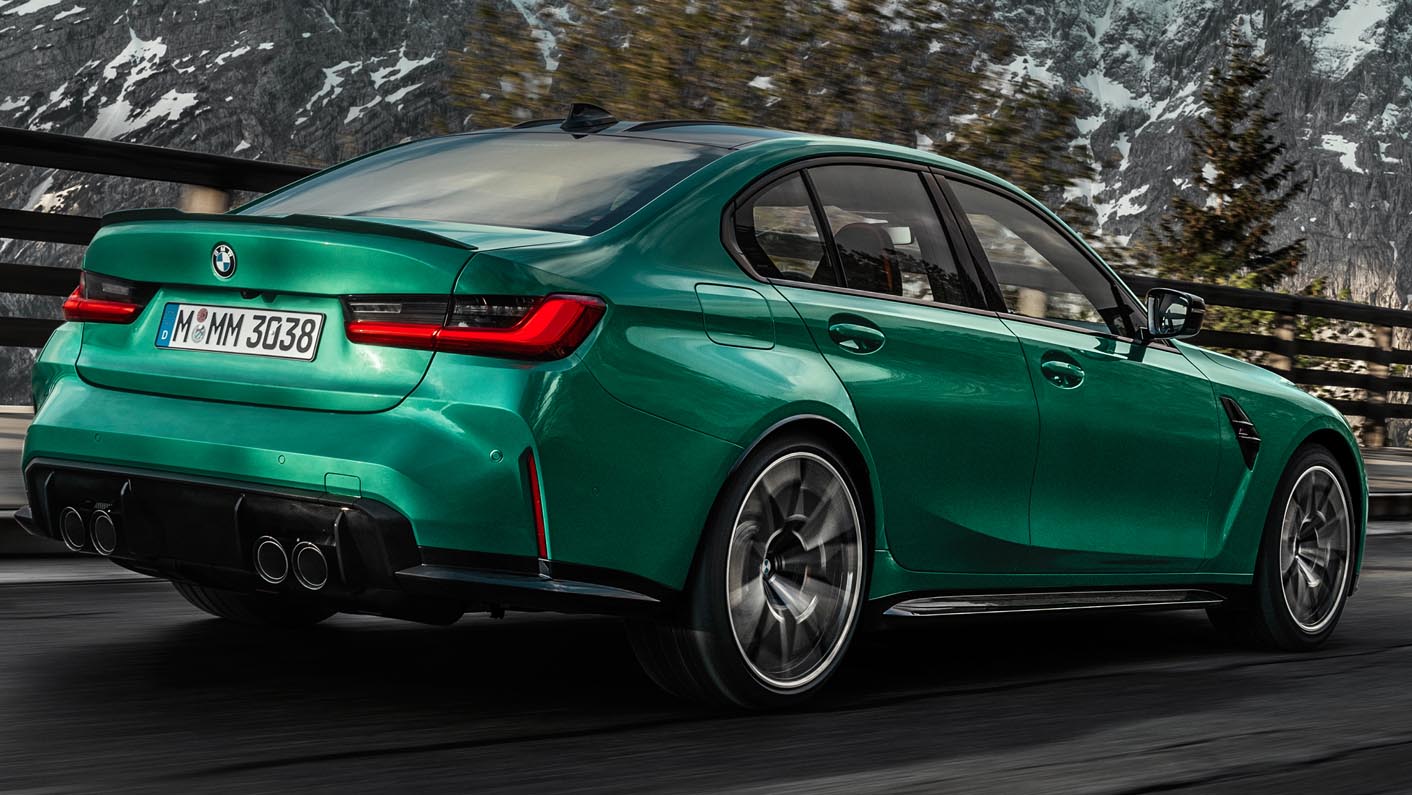
BMW Live Cockpit Professional: fully digital display grouping with M-specific content and graphics
The fully digital display grouping – made up of a high-resolution instrument cluster with a 12.3-inch screen diagonal behind the steering wheel and a 10.25-inch Control Display – is part of the BMW Live Cockpit Professional fitted as standard in the new BMW M3 Sedan and new BMW M4 Coupé. The content it shows can be configured individually. The fully digital instrument display provides enough room to accommodate an excerpt from the navigation map, status indicators for the driver assistance systems or 3D visualisation of the surrounding area. The latter function displays graphics of the traffic situation and the possible courses of action offered by activated driver assistance systems. The intuitive multimodal interaction between driver and vehicle can take place – depending on the situation – via the Control Display’s touchscreen, the proven iDrive Controller, the multifunction buttons on the steering wheel, voice control or optional BMW gesture control.
The driver and passengers also benefit from the possibilities enabled by BMW Operating System 7. For example, the new BMW M3 Sedan and new BMW M4 Coupé also enjoy the services of the BMW Intelligent Personal Assistant. Activated by a spoken prompt (“Hey BMW”), this digital companion helps the driver to operate vehicle functions and acquires new capabilities all the time thanks to the updates transmitted seamlessly by Remote Software Upgrade.
BMW Maps, optimised smartphone integration
BMW Live Cockpit Professional also includes a multimedia system, a navigation system, two USB ports for data transfer and a WiFi interface, plus a built-in SIM card with 4G LTE connectivity. This enables use of numerous other digital services, including BMW TeleServices and Intelligent Emergency Call, Real Time Traffic Information with hazard warning, the Remote Services and Concierge Services. The telephony with wireless charging option for inductive charging of compatible smartphones is also part of standard specification.
The cloud-based navigation system BMW Maps calculates routes and arrival times with remarkable speed and precision, updates real-time traffic data at short intervals and lets drivers enter any word when searching for a destination. Optimised smartphone integration also features as standard. Alongside Apple CarPlay, Android Auto can now also be used via the car’s operating system. Meanwhile, the Remote Software Upgrade function enables improved vehicle functions and additional digital services to be imported into the car over the air.
Wide variety of options for enhancing comfort and individuality
The significant additions to the standard specification of the predecessor models and an attractive selection of options also help to enhance driving comfort over short and long distances. The new BMW M3 Sedan and new BMW M4 Coupé are equipped as standard with three-zone automatic climate control with independent control of the temperature and ventilation settings for the driver’s side, the front passenger side and the rear passenger compartment. LED interior lighting including ambient lighting is also included as standard. The lighting’s distribution, brightness and colour scheme can be configured in the iDrive menu.
A standard-fitted hi-fi speaker system with ten sound sources and an amplifier output of 205 watts provides a high standard of audio entertainment. Sound quality from the audio system can be further improved with the optional Harman Kardon Surround Sound system, which comprises 16 speakers and a digital seven-channel amplifier delivering 464 watts of audio power. Another option is the BMW Display Key, on which customers can view the car’s fuel level and service-related information, and which can also be used to access Remote Services.
The weight-minimised bodies of the new BMW M3 Sedan and new BMW M4 Coupé incorporate a roof made from CFRP as standard. A steel roof with integral glass tilt/sliding sunroof is available as a no-cost option for both models. The transparent surfaces of the electrically powered sunroofs are 100 millimetres (BMW M3 Sedan) / 24 millimetres (BMW M4 Coupé) longer than those offered for the predecessor models.
M Race Track Package: reduced weight, increased performance
The M Race Track Package – offered for the first time for the new BMW M3 Sedan and new BMW M4 Coupé – brings about a targeted reduction in vehicle weight. This package includes M Carbon ceramic brakes, weight-minimised M light-alloy wheels (available as an option with semi-slick tyres), M Carbon bucket seats for the driver and front passenger, and interior trim strips in Carbon Fibre High-gloss.
Another element of this ultra-performance-oriented option is the M Driver’s Package, which raises the top speed of the new BMW M3 Sedan and new BMW M4 Coupé to 290 km/h (180 mph). All the functions of M Drive Professional and the BMW Head-Up Display are also on hand. All in all, the M Race Track Package reduces weight by around 25 kilograms compared with cars in standard specification.
BMW M Performance Parts
Extraordinary sporting prowess marks out the character of the new BMW M3 Sedan and new BMW M4 Coupé in all their variants. The range of available powertrain options and equipment items offers customers greater scope than ever for adapting the cars’ performance attributes and boldly expressive styling to personal preferences. The BMW M Performance Parts – available immediately from launch and tailored to the model at hand – provide additional options for fine-tuning the intense driving experience and dynamic aura of the new high-performance sports cars to the driver’s individual style. The retrofit options available as part of the Original BMW Accessories range elevate the cars’ dynamic driving attributes to a new level again and underscore the striking looks of the high-performance models both inside and out. Developed using the racing know-how of BMW M GmbH, these products stand out with their sumptuous design, exclusive materials and exceptional quality.
